Luna (Lindsey) Corbden's Blog, page 3
January 22, 2014
Persuade the Bystanders
This post has to do with social justice – you know, topics like privilege, racism, sexism, classism, ablism, and all the other ignorant and/or hatey "isms" worth railing against. I'll get to those in a second.
In the late 90s, while arguing politics on BBS message boards, I realized an important truth that I've carried with me always:
When people argue in public, they will almost never convince one another. But they do influence the lurkers.
 WWIV message boards
WWIV message boards
My view of the world when I
learned this important life lesson Sometimes the persuasion is instant. Now and then a lurker will timidly post and reveal that their minds have been changed. But most keep this fact to themselves. More often, the change is slow. These lurkers continue to follow similar arguments, until eventually, they are swayed by whichever side has collectively made the best case. I myself have drastically changed my mind on deeply held beliefs in this way, both by debating and merely watching debates. I've also seen it happen to other people. But it's rarely instant.
It's hard to know that these neutral and persuadable lurkers exist. They are, by their nature, quiet. Very often, though not always, the more vocal a person is, the less likely they are to be convinced. So we tend to think everyone who doesn't use a megaphone is just like everyone who does. This is not true.
I think about the topic of persuasion alot. I'm a writer. It's my job to persuade. I also love debate, a casual pastime since childhood. Roland makes a wonderful and challenging debate partner to help me better understand what works and what doesn't. On top of all that, I've studied mind control, otherwise known as "coercive persuasion" – the ability of manipulators to convince people against their will.
I've learned about why people believe things, and what factors make people change their minds, and why people sometimes never will, even in the face of overwhelming evidence. Cognitive Dissonance is the mechanism we all employ to either accept or reject new ideas. It can be a very powerful barrier to persuading others that our position is correct. Cognitive dissonance is the source of all closed minds. There are ways around it – both ethical and unethical. I am more concerned with ethical persuasion.
I consider myself an activist. Anyone who publicly advocates for social justice, is, in my opinion, an activist. I am a woman and I have what some might call an invisible disability. In all other areas, I am privileged, but I consider myself an ally against racism and other hateful thought systems. I firmly believe that everyone has a different life experience, and it is generally best to never dismiss anyone's position out of hand until I've done my utmost to understand – even if I don't agree.
Social media has opened a new door for activists. It allows the voices of oppressed individuals and classes be heard by all kinds of people who were previously isolated. The internet democratizes the population by giving everyone a printing press and a megaphone. It's a beautiful thing. And every activist, whether they know it or not, is in a position to persuade.
 This guy is just like you. Everyone is listening.
This guy is just like you. Everyone is listening.
Choose well what you will say.Presumably, our goal is to make society better. To reduce hate. To eliminate ignorance. To eliminate unfairness. To prevent harm and prosecute those who hurt others. To pass laws that create the most equal playing fields for all people. Everyone should have the same opportunities for success, regardless of outward differences that so many in our society tend to get hung up on. I want everyone to be treated with respect, even if they're a different color, or gender, or disabled, or attracted to the same gender, or all the other things I've failed to list here.
In a democracy, the best way to accomplish all of those goals is to be persuasive. Activism, when done right, is persuasive. Anything else is just preaching to the choir – it feels good, but nothing gets done.
Given that, there are certain trends I see among activists that disturb me for two reasons:
I don't consider these methods ethical. These methods are not persuasive.
The Outrage Machine is constantly producing new horrors to raise outrage. Sometimes I believe this machine is persuasive, and other times I don't. Sometimes I think it is counter-persuasive. And that concerns me. Because I'd like to see society improve. I'd like to employ the best tactics.
So when I apply my mind to social justice activism, the question often is, "How could this message be more convincing? How can it reach more people and change minds?" Sometimes, I speak up about tactics. And when I do, my views are controversial, often because they're mistaken for taking up the other side's position, or being an apologetic, or dismissing someone's views, or perhaps not being enough of a cheerleader for our side, nor supportive enough of the cheerleaders we have.
None of those are my goals. I'm not dismissing anyone. I am not being an apologist for the other side. I am not defending horrible behavior. I am merely goal-oriented and thinking about the best ways to achieve the goals that all online social justice activists share – more fairness and equality and tolerance for all.
So here's my controversial statement of the day, and I hope you'll hear me out. Allow me to persuade you before immediately dismissing my argument. Please know I understand the counter-arguments and have given this alot of thought.
I've seen a certain sentiment echoed via Twitter and the blogosphere, usually coming from an underprivileged person directed at a privileged person (i.e. woman or POC or disabled or trans* directed at a man or white person or cis), and it goes something like: "It's not my job to educate you!" It is often delivered in an angry or dismissive or antagonistic tone.
In terms of accomplishing the above goals, it is entirely counterproductive.
Yes, I do understand where this sentiment comes from. Especially when, say, a feminist of color has been asked 50,000 times by hostile racist misogynists to explain why she's so upset, and she's given the answer 49,999 times, and she's being asked to speak for her entire race and sex to flaming assholes who aren't listening anyway. Her anger is entirely justified. As is her weariness in the face of this seemingly Sisyphean task. It is true, in fact, that Google is just a fingertip away, and all ignorance about any topic can be quickly dissolved like salt in water.
The endless questions themselves can be a rhetoric tool used to dismiss, belittle, and aggravate. So why waste even two seconds talking to those jerks?
I get all that, I really do.
And I understand the double-bind. As a woman, I can choose to be labeled a bitch, or let people walk all over me. I am not allowed a middle ground. Similar thought-terminating cliches are employed to double-bind people of all other oppressed classes. I am not suggesting the answer is passivity and eternal politeness, bowing and scraping. Far from it.
And most especially, I understand that most oppressed people have no interest in activism and just want to live their lives without being bothered. They just want to be accepted as average and normal and don't want to go around thinking about their orientation, disability, or skin color. They just want to live. In this latter case, I think the "It's not my job" answer is most appropriate – it isn't your job.
But as activists and advocates, you actually have taken on the job. Maybe you only want it to be part time, but it's your job. By speaking up, you volunteered. It's a tough job, but worth doing.
No, it's not your job to educate the hostile instigator of controversy or the timeline troll who is just trying to raise everyone's hackles. That guy will never be convinced by anything you have to say. It's true. He is so enmired in his beliefs and has made public declarations of it, so his cognitive dissonance is nearly impenetrable. It is likely that when the world changes completely into a social utopia dreamworld, he will go to his grave willfully ignorant and hating.
Alas, educational and persuasive words are not meant for him. Your efforts are meant for the bystanders, the dozens, or hundreds, or even thousands of quiet lurkers. They're out there, neutral, or ignorant, or perhaps a bit racist or a bit sexist or any other *ist, but they don't feel too strongly about it. Not enough to join the argument. But they're curious, and they're watching each player make a case.
Pretend today the Outrage Machine has identified a new controversy and brought it to the rapt attention of the information-obsessed internet. Someone gets wrongly fired from a job, or groped at a con, or catcalled, or outed, or harassed, or murdered. Some person in power says something stupid, and advocates reply, and anti-advocates reply back and everyone's in an uproar for a few days. This is the chance to convince that silent neutral ignorant majority. They are all near the fence. They think sexism is over, or transwomen are just confused, or bisexuals don't exist, or Muslims are more protected than Christians, or any black kid has it coming because no one gets shot unless they deserve it, or whatever ignorant thing they believe. This is the chance of advocates to convince those bystanders.
I believed many of those things once. And over time, effective arguments finally got to me. Advocates finally educated me. And not usually because I sought the information out on my own. Usually because people kept pointing me in the right direction.
That's the point of publicity. You hold a megaphone, just for a few minutes. You've gotten someone's attention. In this age of the information firehose, that's the hard part. Now how are you going to most effectively use it?
Even the small-time advocate who doesn't have a big platform, who rarely says much of anything, has a huge opportunity to convince these silent types, because their followers are their friends and family. We are much more influential to those who know us and like us personally. Yes, those Facebook debates are frustrating, because no one seems to listen, but the silent readers are paying attention.
This is how the most recent victories in marriage equality were won. A majority of the mainstream public was swayed, not through anger and righteous indignation, but through family members who came out of the closet and stood gentle yet firm on their rights to be gay and to love and commit to who they wanted. Eventually, few loving family members could imagine a world where government would bar their happy union.
Injustices happen every moment of every day. Outrage can spark quite an inflagration of justifiable anger that sadly, too often, turns to hostility, or ostracism, or shaming, or personal attacks, or blatant logical fallacies. And when this happens, you've lost the moral high-ground. You have ceased being persuasive to that silent, neutral, convincible audience. And then it doesn't matter how right you are. Because anyone who might have been listening will turn against your position. The opponent wins an easy victory. Score one for the trolls.
Even more tragic and destructive is when misdirected anger scares away fellow advocates and allies – even those in the same category as you (fellow women, POCs, LGBTs, etc). These are people who are already convinced of your position and want to help. They observe this open hostility and feel judged or lumped in with the haters because of a slight variance in opinion. They may already be marginalized by being themselves in the oppressed class, and now they feel marginalized further by activists who claim to be advocating on their behalf. They may become terrified to say anything, lest it be the wrong thing, lest your irate gaze turn instead on them. Intersectional individuals are even more at risk for this type of dismissal and marginalization.
I myself have been in this position amongst my fellow feminists, sometimes for defending intersectional classes (like advocating trans rights to rad fems), and sometimes because my opinion on tactics differed. (I'm generally against boycotts, for instance.) I'm fine with people disagreeing with me, but I've also been actively shamed for holding these and other stances. Shaming, threatened ostracization, and personal attacks go too far.
This type of hostility makes it frightening for fellow advocates to contribute to the discussion. For instance, it made me hesitant to write this post. Thankfully, I'm the type of person who doesn't like to be silenced in the face of fear. Others are understandably more timid.
We need more diversity among our voices, not less. And more tolerance. Don't we believe that both diversity and tolerance lead to a better world? We need all the allies and advocates we can get, waving the banner, even if some choose to wave it differently than you. Punch upward, at the system, at the oppressors, at the powerful, at the bad guys. Don't punch sideways at the ally standing next to you just because she's easier to hit.
Oppressed people have much to be angry about, and I would never rob them of their anger. Anger is a valuable emotion. It motivates and feeds energy into individuals and groups and causes. I am not advocating for less anger – I am suggesting that those energies be channeled persuasively to produce the most positive outcomes.
(And in the moment of offense, especially when there is no audience, untamed anger very much has its place in defending individuals against in-progress assault or insult. I am not suggesting passivity or politeness when rights need to be asserted to a hostile *ist who insults and then demands to know why it was insulting. Since you likely will never convince him, that's the time to growl and spit, to say it's not your job, and to gently or not-so-gently direct him to Google. Or not. Depends on you and the situation.)
It's true that maintaining the moral high-ground can be exhausting. We can't do it all the time. Sometimes I tweet or blog my opinions. Sometimes I advocate. Sometimes I give the long answer.
And other times, I'm busy, I just direct people to others who have written more eloquently than I. Think about it: If, instead of saying, "Correcting your ignorance is not my responsibility," you suggest a well-known educational website or blog post on the topic, like Unpacking the Invisible Knapsack. You not only give that hostile person a chance at graceful, face-saving redemption, but more importantly, it's another opportunity to distribute that content to every single one of your other followers, many whom may have missed that particular blog post, or have never been exposed to content that you think is obvious because you read it a decade ago.
There is much to be said for "brand awareness", a tactic commercial marketers understand well. Every chance you have to retweet the same link to yet another person asking the same questions, your other followers will begin to see that content as legitimate and worth consuming. Maybe they meant to read it last month, and have forgotten. You're making it easy for them to educate themselves and maybe even join the cause.
Other times, the good fight becomes overwhelming. It's exhausting to be outraged all the time. That's when I take a break and let others pick up the banner. Sometimes I do this because I am far too emotional to think clearly. I'd rather sit out the Outrage Machine's churning than say something that loses points for my side. Because I want my team to win. It is possible to communicate "It's not my job" in a way that doesn't detract from the overall argument or your future ability to be persuasive. Like, "I don't have time to answer that right now. Could you please google 'cis privilege' on your own?" Or just remain silent. That gives the hostile troll the last word, but most likely, it will reflect worse on him than you.
It's true that my white, cis, thin, mostly-abled, * privilege gives me the luxury to sit alot of these out, a privilege not everyone may have. I realize that I live relatively free from various kinds of hostility that lets me take these breaks. It's a little easier for me, perhaps, to go on an anger diet, to step away from the keyboard when emotions run too high. In many ways, this might be "easy for me to say". I still think these suggestions are tactically the most effective, and worth employing whenever possible.
In the end, we all have our own journey and our own idea of what's right and wrong. It's your social media platform, so please, do with it what you will. But hopefully, I've been just a bit persuasive here.
Let's go out and change the world.
In the late 90s, while arguing politics on BBS message boards, I realized an important truth that I've carried with me always:
When people argue in public, they will almost never convince one another. But they do influence the lurkers.
 WWIV message boards
WWIV message boardsMy view of the world when I
learned this important life lesson Sometimes the persuasion is instant. Now and then a lurker will timidly post and reveal that their minds have been changed. But most keep this fact to themselves. More often, the change is slow. These lurkers continue to follow similar arguments, until eventually, they are swayed by whichever side has collectively made the best case. I myself have drastically changed my mind on deeply held beliefs in this way, both by debating and merely watching debates. I've also seen it happen to other people. But it's rarely instant.
It's hard to know that these neutral and persuadable lurkers exist. They are, by their nature, quiet. Very often, though not always, the more vocal a person is, the less likely they are to be convinced. So we tend to think everyone who doesn't use a megaphone is just like everyone who does. This is not true.
I think about the topic of persuasion alot. I'm a writer. It's my job to persuade. I also love debate, a casual pastime since childhood. Roland makes a wonderful and challenging debate partner to help me better understand what works and what doesn't. On top of all that, I've studied mind control, otherwise known as "coercive persuasion" – the ability of manipulators to convince people against their will.
I've learned about why people believe things, and what factors make people change their minds, and why people sometimes never will, even in the face of overwhelming evidence. Cognitive Dissonance is the mechanism we all employ to either accept or reject new ideas. It can be a very powerful barrier to persuading others that our position is correct. Cognitive dissonance is the source of all closed minds. There are ways around it – both ethical and unethical. I am more concerned with ethical persuasion.
I consider myself an activist. Anyone who publicly advocates for social justice, is, in my opinion, an activist. I am a woman and I have what some might call an invisible disability. In all other areas, I am privileged, but I consider myself an ally against racism and other hateful thought systems. I firmly believe that everyone has a different life experience, and it is generally best to never dismiss anyone's position out of hand until I've done my utmost to understand – even if I don't agree.
Social media has opened a new door for activists. It allows the voices of oppressed individuals and classes be heard by all kinds of people who were previously isolated. The internet democratizes the population by giving everyone a printing press and a megaphone. It's a beautiful thing. And every activist, whether they know it or not, is in a position to persuade.
 This guy is just like you. Everyone is listening.
This guy is just like you. Everyone is listening.Choose well what you will say.Presumably, our goal is to make society better. To reduce hate. To eliminate ignorance. To eliminate unfairness. To prevent harm and prosecute those who hurt others. To pass laws that create the most equal playing fields for all people. Everyone should have the same opportunities for success, regardless of outward differences that so many in our society tend to get hung up on. I want everyone to be treated with respect, even if they're a different color, or gender, or disabled, or attracted to the same gender, or all the other things I've failed to list here.
In a democracy, the best way to accomplish all of those goals is to be persuasive. Activism, when done right, is persuasive. Anything else is just preaching to the choir – it feels good, but nothing gets done.
Given that, there are certain trends I see among activists that disturb me for two reasons:
I don't consider these methods ethical. These methods are not persuasive.
The Outrage Machine is constantly producing new horrors to raise outrage. Sometimes I believe this machine is persuasive, and other times I don't. Sometimes I think it is counter-persuasive. And that concerns me. Because I'd like to see society improve. I'd like to employ the best tactics.
So when I apply my mind to social justice activism, the question often is, "How could this message be more convincing? How can it reach more people and change minds?" Sometimes, I speak up about tactics. And when I do, my views are controversial, often because they're mistaken for taking up the other side's position, or being an apologetic, or dismissing someone's views, or perhaps not being enough of a cheerleader for our side, nor supportive enough of the cheerleaders we have.
None of those are my goals. I'm not dismissing anyone. I am not being an apologist for the other side. I am not defending horrible behavior. I am merely goal-oriented and thinking about the best ways to achieve the goals that all online social justice activists share – more fairness and equality and tolerance for all.
So here's my controversial statement of the day, and I hope you'll hear me out. Allow me to persuade you before immediately dismissing my argument. Please know I understand the counter-arguments and have given this alot of thought.
I've seen a certain sentiment echoed via Twitter and the blogosphere, usually coming from an underprivileged person directed at a privileged person (i.e. woman or POC or disabled or trans* directed at a man or white person or cis), and it goes something like: "It's not my job to educate you!" It is often delivered in an angry or dismissive or antagonistic tone.
In terms of accomplishing the above goals, it is entirely counterproductive.
Yes, I do understand where this sentiment comes from. Especially when, say, a feminist of color has been asked 50,000 times by hostile racist misogynists to explain why she's so upset, and she's given the answer 49,999 times, and she's being asked to speak for her entire race and sex to flaming assholes who aren't listening anyway. Her anger is entirely justified. As is her weariness in the face of this seemingly Sisyphean task. It is true, in fact, that Google is just a fingertip away, and all ignorance about any topic can be quickly dissolved like salt in water.
The endless questions themselves can be a rhetoric tool used to dismiss, belittle, and aggravate. So why waste even two seconds talking to those jerks?
I get all that, I really do.
And I understand the double-bind. As a woman, I can choose to be labeled a bitch, or let people walk all over me. I am not allowed a middle ground. Similar thought-terminating cliches are employed to double-bind people of all other oppressed classes. I am not suggesting the answer is passivity and eternal politeness, bowing and scraping. Far from it.
And most especially, I understand that most oppressed people have no interest in activism and just want to live their lives without being bothered. They just want to be accepted as average and normal and don't want to go around thinking about their orientation, disability, or skin color. They just want to live. In this latter case, I think the "It's not my job" answer is most appropriate – it isn't your job.
But as activists and advocates, you actually have taken on the job. Maybe you only want it to be part time, but it's your job. By speaking up, you volunteered. It's a tough job, but worth doing.
No, it's not your job to educate the hostile instigator of controversy or the timeline troll who is just trying to raise everyone's hackles. That guy will never be convinced by anything you have to say. It's true. He is so enmired in his beliefs and has made public declarations of it, so his cognitive dissonance is nearly impenetrable. It is likely that when the world changes completely into a social utopia dreamworld, he will go to his grave willfully ignorant and hating.
Alas, educational and persuasive words are not meant for him. Your efforts are meant for the bystanders, the dozens, or hundreds, or even thousands of quiet lurkers. They're out there, neutral, or ignorant, or perhaps a bit racist or a bit sexist or any other *ist, but they don't feel too strongly about it. Not enough to join the argument. But they're curious, and they're watching each player make a case.
Pretend today the Outrage Machine has identified a new controversy and brought it to the rapt attention of the information-obsessed internet. Someone gets wrongly fired from a job, or groped at a con, or catcalled, or outed, or harassed, or murdered. Some person in power says something stupid, and advocates reply, and anti-advocates reply back and everyone's in an uproar for a few days. This is the chance to convince that silent neutral ignorant majority. They are all near the fence. They think sexism is over, or transwomen are just confused, or bisexuals don't exist, or Muslims are more protected than Christians, or any black kid has it coming because no one gets shot unless they deserve it, or whatever ignorant thing they believe. This is the chance of advocates to convince those bystanders.
I believed many of those things once. And over time, effective arguments finally got to me. Advocates finally educated me. And not usually because I sought the information out on my own. Usually because people kept pointing me in the right direction.
That's the point of publicity. You hold a megaphone, just for a few minutes. You've gotten someone's attention. In this age of the information firehose, that's the hard part. Now how are you going to most effectively use it?
Even the small-time advocate who doesn't have a big platform, who rarely says much of anything, has a huge opportunity to convince these silent types, because their followers are their friends and family. We are much more influential to those who know us and like us personally. Yes, those Facebook debates are frustrating, because no one seems to listen, but the silent readers are paying attention.
This is how the most recent victories in marriage equality were won. A majority of the mainstream public was swayed, not through anger and righteous indignation, but through family members who came out of the closet and stood gentle yet firm on their rights to be gay and to love and commit to who they wanted. Eventually, few loving family members could imagine a world where government would bar their happy union.
Injustices happen every moment of every day. Outrage can spark quite an inflagration of justifiable anger that sadly, too often, turns to hostility, or ostracism, or shaming, or personal attacks, or blatant logical fallacies. And when this happens, you've lost the moral high-ground. You have ceased being persuasive to that silent, neutral, convincible audience. And then it doesn't matter how right you are. Because anyone who might have been listening will turn against your position. The opponent wins an easy victory. Score one for the trolls.
Even more tragic and destructive is when misdirected anger scares away fellow advocates and allies – even those in the same category as you (fellow women, POCs, LGBTs, etc). These are people who are already convinced of your position and want to help. They observe this open hostility and feel judged or lumped in with the haters because of a slight variance in opinion. They may already be marginalized by being themselves in the oppressed class, and now they feel marginalized further by activists who claim to be advocating on their behalf. They may become terrified to say anything, lest it be the wrong thing, lest your irate gaze turn instead on them. Intersectional individuals are even more at risk for this type of dismissal and marginalization.
I myself have been in this position amongst my fellow feminists, sometimes for defending intersectional classes (like advocating trans rights to rad fems), and sometimes because my opinion on tactics differed. (I'm generally against boycotts, for instance.) I'm fine with people disagreeing with me, but I've also been actively shamed for holding these and other stances. Shaming, threatened ostracization, and personal attacks go too far.
This type of hostility makes it frightening for fellow advocates to contribute to the discussion. For instance, it made me hesitant to write this post. Thankfully, I'm the type of person who doesn't like to be silenced in the face of fear. Others are understandably more timid.
We need more diversity among our voices, not less. And more tolerance. Don't we believe that both diversity and tolerance lead to a better world? We need all the allies and advocates we can get, waving the banner, even if some choose to wave it differently than you. Punch upward, at the system, at the oppressors, at the powerful, at the bad guys. Don't punch sideways at the ally standing next to you just because she's easier to hit.
Oppressed people have much to be angry about, and I would never rob them of their anger. Anger is a valuable emotion. It motivates and feeds energy into individuals and groups and causes. I am not advocating for less anger – I am suggesting that those energies be channeled persuasively to produce the most positive outcomes.
(And in the moment of offense, especially when there is no audience, untamed anger very much has its place in defending individuals against in-progress assault or insult. I am not suggesting passivity or politeness when rights need to be asserted to a hostile *ist who insults and then demands to know why it was insulting. Since you likely will never convince him, that's the time to growl and spit, to say it's not your job, and to gently or not-so-gently direct him to Google. Or not. Depends on you and the situation.)
It's true that maintaining the moral high-ground can be exhausting. We can't do it all the time. Sometimes I tweet or blog my opinions. Sometimes I advocate. Sometimes I give the long answer.
And other times, I'm busy, I just direct people to others who have written more eloquently than I. Think about it: If, instead of saying, "Correcting your ignorance is not my responsibility," you suggest a well-known educational website or blog post on the topic, like Unpacking the Invisible Knapsack. You not only give that hostile person a chance at graceful, face-saving redemption, but more importantly, it's another opportunity to distribute that content to every single one of your other followers, many whom may have missed that particular blog post, or have never been exposed to content that you think is obvious because you read it a decade ago.
There is much to be said for "brand awareness", a tactic commercial marketers understand well. Every chance you have to retweet the same link to yet another person asking the same questions, your other followers will begin to see that content as legitimate and worth consuming. Maybe they meant to read it last month, and have forgotten. You're making it easy for them to educate themselves and maybe even join the cause.
Other times, the good fight becomes overwhelming. It's exhausting to be outraged all the time. That's when I take a break and let others pick up the banner. Sometimes I do this because I am far too emotional to think clearly. I'd rather sit out the Outrage Machine's churning than say something that loses points for my side. Because I want my team to win. It is possible to communicate "It's not my job" in a way that doesn't detract from the overall argument or your future ability to be persuasive. Like, "I don't have time to answer that right now. Could you please google 'cis privilege' on your own?" Or just remain silent. That gives the hostile troll the last word, but most likely, it will reflect worse on him than you.
It's true that my white, cis, thin, mostly-abled, * privilege gives me the luxury to sit alot of these out, a privilege not everyone may have. I realize that I live relatively free from various kinds of hostility that lets me take these breaks. It's a little easier for me, perhaps, to go on an anger diet, to step away from the keyboard when emotions run too high. In many ways, this might be "easy for me to say". I still think these suggestions are tactically the most effective, and worth employing whenever possible.
In the end, we all have our own journey and our own idea of what's right and wrong. It's your social media platform, so please, do with it what you will. But hopefully, I've been just a bit persuasive here.
Let's go out and change the world.
Published on January 22, 2014 13:15
January 13, 2014
2013 Accomplishments - 2014 Goals
What a year. In reviewing my goals from last year, looks like I got way off track, but I'm very pleased with what I accomplished.
This year, I:
Was a panelist at Radcon.Went to Rainforest Writer's Retreat and met lots of amazing people.Sold a story to a pro-paying market, Crossed Genres. It will also come out in a print anthology this year.Gave one reading (at Radcon).Released Emerald City Dreamer in print.I got diagnosed with Asperger's Syndrome. And started becoming an expert on autism.And now for something completely different, I wrote a 150,000 word nonfiction book, Releasing Agency: Lifting the Veil of Mormon Mind Control. One reason I didn't accomplish all of my 2013 goals is because of that little sidetrack. It's a book I had thought about writing based on my mind control website in 2005, forgotten about, and then on a whim decided to crank it out "real quick". The effort took 7 months (with distractions in between). It is currently out to alpha readers.
Emerald City Iron made it through the writer's group, and is ready for the next round of edits, when I can get to it.
I have a bunch of stories to submit, and one in particular is totally publishable. It's been rejected twice, both with a personal note from the editor, so I know it will sell. I just have to get it, and the others, out there. I set the bar pretty high for myself. I currently only submit stories to pro-paying markets until those venues are exhausted, and then I might send it to semi-pro markets. My time and splines are fairly limited, so I'd rather spend time aiming at high targets, being a perfectionist, and working on totally unplanned projects. ;)
So my goals for this year:
Publish Recovering Agency in print and ebook.Market Recovering Agency, including launching a new website and giving interviews.Be a panelist at Radcon again.Be invited as a visiting pro at another con for 2015. Norwescon would be nice.Speak at Defcon.Speak elsewhere, either a seminar, or Exmormon Foundation, or some convention related to cults or religion, on the topic of mind control.Write a whole bunch of blog posts on autism and mind control.Release Emerald City Iron.Complete a major step in a novel: Either write the first draft of the next Dreams by Streetlight book or the second draft of The Sun Never Rises.Sell two stories to pro-paying markets. I'd really love to sell to an anthology.If that seems like alot, it's because it is. So we'll see. :) There's a significant chance I will be caught up in marketing Recovering Agency for many months. It's already generated plenty of interest. I need to be okay with dropping many of the above goals in trade for promoting a book that could really help people. And maybe pay some bills in the process.
So here's to 2014. May it be a very good year for all of us.
This year, I:
Was a panelist at Radcon.Went to Rainforest Writer's Retreat and met lots of amazing people.Sold a story to a pro-paying market, Crossed Genres. It will also come out in a print anthology this year.Gave one reading (at Radcon).Released Emerald City Dreamer in print.I got diagnosed with Asperger's Syndrome. And started becoming an expert on autism.And now for something completely different, I wrote a 150,000 word nonfiction book, Releasing Agency: Lifting the Veil of Mormon Mind Control. One reason I didn't accomplish all of my 2013 goals is because of that little sidetrack. It's a book I had thought about writing based on my mind control website in 2005, forgotten about, and then on a whim decided to crank it out "real quick". The effort took 7 months (with distractions in between). It is currently out to alpha readers.
Emerald City Iron made it through the writer's group, and is ready for the next round of edits, when I can get to it.
I have a bunch of stories to submit, and one in particular is totally publishable. It's been rejected twice, both with a personal note from the editor, so I know it will sell. I just have to get it, and the others, out there. I set the bar pretty high for myself. I currently only submit stories to pro-paying markets until those venues are exhausted, and then I might send it to semi-pro markets. My time and splines are fairly limited, so I'd rather spend time aiming at high targets, being a perfectionist, and working on totally unplanned projects. ;)
So my goals for this year:
Publish Recovering Agency in print and ebook.Market Recovering Agency, including launching a new website and giving interviews.Be a panelist at Radcon again.Be invited as a visiting pro at another con for 2015. Norwescon would be nice.Speak at Defcon.Speak elsewhere, either a seminar, or Exmormon Foundation, or some convention related to cults or religion, on the topic of mind control.Write a whole bunch of blog posts on autism and mind control.Release Emerald City Iron.Complete a major step in a novel: Either write the first draft of the next Dreams by Streetlight book or the second draft of The Sun Never Rises.Sell two stories to pro-paying markets. I'd really love to sell to an anthology.If that seems like alot, it's because it is. So we'll see. :) There's a significant chance I will be caught up in marketing Recovering Agency for many months. It's already generated plenty of interest. I need to be okay with dropping many of the above goals in trade for promoting a book that could really help people. And maybe pay some bills in the process.
So here's to 2014. May it be a very good year for all of us.
Published on January 13, 2014 15:36
November 6, 2013
Autism and Shame
At the end of the week when I literally wrote the chapter on shame, I found myself curled up on my bed, sobbing, in the throes of a meltdown, feeling like the worst person on earth -- feeling vitally broken in all the ways that count -- feeling like the unresolvable source of pain for everyone around me.
And I was helpless to watch from somewhere within, knowing I was suffering from shame, but unable to think my way out of its cage.
What is shame?
The concepts of guilt and shame are frequently confused with one another. They both seem triggered by the same stimuli. Yet they are two distinct feelings with quite different implications and outcomes.
I've seen two definitions of the differences that ring true to me.
The first is that shame is related to your social position, while guilt is a personal feeling. That is, shame requires your sense of relation to others -- you have done something and others are exerting pressure on you to stop. OR, if they don't know what you've done, you are afraid they will find out because if they did, they would exert pressure on you. Whereas guilt is the knowledge that you've done something wrong, and you feel remorse and a desire to correct the behavior regardless of whether anyone else knows about it.
The second difference is perhaps the most enlightening. Guilt is about what you have done; shame is about who you are. Guilt is, "I have done something bad". Shame is "I am bad".
Brené Brown gave two powerful TED talks on the concept of vulnerability that both focus heavily on the concept of shame. I cannot overstate this concept enough, so I will repeat it in her words: "Shame is a focus on self; guilt is a focus on behavior. Shame is I am bad, guilt is I did something bad."
Guilt, on the other hand, can be useful in combatting behaviors. It is a sincere remorse and a drive to become a better person. Within guilt, there is the possibility to improve. Because there is no sense that the core self is damaged.
But when the self is inherently broken, then what is there to fix? Nothing.
According to Brown, shame is so painful because it makes us feel unworthy of acceptance. It makes us feel alone.
To me, the feeling of shame is very closely related to the feeling of rejection. Both tell me I am unworthy of acceptance. Both emotions seek to push me from the tribe. Both say, "You are not enough like the others to belong."
A recent fMRI study on rejection showed that being rejected activates the same regions of the brain as physical pain. According to the article, "As far as your brain is concerned, a broken heart is not so different from a broken arm." Researchers also found that this kind of emotional pain can be treated by taking Tylenol. (Keep this in mind next time you are tempted to wield shame as a weapon. If you are unwilling to punch someone, perhaps you shouldn't shame or ostracize them, either.)
So here I am. I know all this. I've spend decades getting healthy, reading all the self-help books, going through the therapies and support groups and memorizing daily affirmations. I have literally written the chapter on shame. I know better. I am even surrounded by people who I know love me, even though I hurt them sometimes.
And yet I still find myself on those dark nights, hating myself with every fiber of my being. Feeling like a horrible, worthless creature.
How do I get from Point A to Point B?
Because I have Asperger's
I have a constant sense, when dealing with people, that sooner or later, I am going to say the wrong thing. Eventually, out of nowhere, the peaceful pond is going to erupt into a geyser. I spend significant energies managing that pond, keeping it still, but it always erupts.
From childhood, I've known this. This incontrovertible fact of life has been a part of me. I have been unacceptable in so many ways, being a nerd, being an introvert, but the worst crime of all is making social faux pas. Of thinking differently. Of thinking so differently that perfectly innocent utterances randomly cause people to cry, or turn away, or lash out, or get angry, or accuse me, or cease being my friend. I'm not so impaired as to be unable to recognize when I've done something wrong, though perhaps my brain should be merciful enough to grant me this relief.
My young self learned that the consequences for making such mistakes could be severe. The trauma built up over the years, compounding the punishment for screwing up. Now, not only do I have to deal with another person feeling bad because of the mysterious thing I did wrong, but I have to also deal with my own fears and pain which have been building into this near-PTSD level.
Putting in the effort to avoid these mistakes only works for so long. Because I have Asperger's. I will miss the social queues. Sometimes, everyone misses the social queues, but I have had a lifetime of doing so.
What may be the even more important distinction, I don't have the skills to recover from social mistakes. I can't gracefully apologize or flatter or smile my way out of trouble. I'm usually still stuck on Step 1: flabbergasted, trying to understand where I went wrong.
For those of us on the spectrum, this is normal. We live life in the face of continual negative social feedback and the constant making of incomprehensible mistakes. And it is here where the dangers of shame lurk. Where no matter how many times I tell myself how wonderful and likable and lovable I am, I still find myself on those dark nights hating myself. Because I'd done it again.
It is very easy to feel like nothing I do will improve my ability to be acceptable. After trying so hard and making so many mistakes, eventually I can't help but think of myself as intrinsically broken.
This topic is particularly important. I hope healing professionals and researchers will look into it on a scientific level and counsel their ASD clients accordingly. But it's possible they won't for a long time.
And yet, they should, because suicidal ideation is 28 times more likely for autistic kids than neurotypical kids. To me, this comes as absolutely no surprise. Aside from my own struggles with suicide, we already know from other research that three things are needed for the risk of suicide to be concerning:
Thwarted belongingness (I am alone)Perceived burdensomeness (I am a burden)Capability (I am not afraid to die)Shame sends two of these three messages: I am intrinsically unacceptable which will make me always be aloneI am inherently unfixable and therefore will always be a source of trouble for those who do love me.And shame (and resulting anxiety and depression) causes so much pain, that the third ingredient is an easy leap. After suffering long enough, suddenly death seems like a relief.
It is this deep sense that we will always be unacceptable that makes autists more likely to ideate. So the real question is, how can we help autistic kids and adults feel acceptable in a world full of people who struggle to understand us as much as we struggle to understand them? Especially when we continue to bear the brunt and blame for the misunderstandings?
Solutions
The day is far, far off when we can expect much from the world at large. But there are things we can do for ourselves, and, if we're fortunate enough to have a loving, and capable support network, we can help them understand and so they can give us what we need.
Affirmations. For starters, when I feel this way, I often find relief from reading the well-crafted and autism-specific affirmations by Liane Holliday Willey which are posted on the WrongPlanet forums. These work most of the time, except for when, for whatever reason, I'm feeling overly cynical and don't believe them.
Self-acceptance for an aspie means accepting that you are fundamentally different. Because of these differences, there are many behaviors that will always be difficult or even impossible for NTs to accept, and you have to accept that, too.
Identify your aspie superpowers. These are examples of how ASD makes you particularly awesome. They are the other side of the coin, your X-ray vision to the kryptonite. For examples, see the two links at the beginning of the paragraph. Come up with your own list. During shame-filled times, go over them and remind yourself of your strengths.
Consider coming out. According to Brené Brown, shame requires secrecy, silence, and judgement to survive. Without these things, it will die. Consider finding a safe space, free of judgement, either with safe family, or safe friends, or with a therapist, or online at a place like WrongPlanet. Bring your shameful moments to light. If you feel judged, then go back into your shell until you do find someplace safe.
If you can, explain your condition to others. Point them to online resources and descriptions. While that doesn't necessarily help keep you from making the same mistakes and hurting people with them, it may help people feel less offended because they understand that the source of your mistakes isn't intentional.
The debate rages over whether autism is a disability, but here it may be useful to think of it as one. NTs don't have to struggle quite so hard to be understood or to avoid being misunderstood. Even though those behaviors are caused by your disability, you must separate your behaviors from who you are.
Remember that if your disability were something more obvious, like inability to walk or see, it would be unthinkable to shame you for avoiding stairs or not looking people in the eye. Sometimes you will miss social queues or not understand what's going on or forget someone's birthday or be late or dozens of other things. While this isn't an excuse, nor does it mean you should stop trying to do those things, it also means that if you fail them, it's nothing to be ashamed of.
There may be unhealthy people in your life who are compounding the issue. They may be incapable of separating behavior from the person and may be reinforcing shame while you are struggling to overcome it. That is something NTs also deal with, and is a subject of a great many books and therapies. When it comes to feeling shame and dealing with abuse, we're not terribly different from NTs, and those materials should be helpful. Just keep in mind we have additional factors which compound the issue, and we may feel shame and rejection more strongly or be more easily triggered by it.
And lastly, here is a post by another aspie who also struggles with shame, and how she deals with it.
No Shame
I once overheard a caring mother say of her daughter, "She has no shame. She has Asperger's. She is incapable of shame." This mother meant well -- what she meant is that there are some things aspies do without regard or care to social customs. In that sense, we have no shame.
But in other areas, where it matters most, we know all too well that our lives have been one steady stream of rejections and social pitfalls. We walk cautiously through a minefield of shame.
We can build up heavy defenses against them, sometimes becoming unapologetic or defensive or even aggressive to avoid touching those mines. Other times, we take the timid approach, avoiding people whenever possible and accepting blame instantly, even when we don't know what we've done wrong. Sometimes I oscillate between these two extremes in the course of a single evening.
Nevertheless, shame is a barrier to intimacy. If we can find ways to grapple with it, no matter how powerful it seems, we'll have more opportunities for closer connections and freer, happier lives.
And I was helpless to watch from somewhere within, knowing I was suffering from shame, but unable to think my way out of its cage.
What is shame?
The concepts of guilt and shame are frequently confused with one another. They both seem triggered by the same stimuli. Yet they are two distinct feelings with quite different implications and outcomes.
I've seen two definitions of the differences that ring true to me.
The first is that shame is related to your social position, while guilt is a personal feeling. That is, shame requires your sense of relation to others -- you have done something and others are exerting pressure on you to stop. OR, if they don't know what you've done, you are afraid they will find out because if they did, they would exert pressure on you. Whereas guilt is the knowledge that you've done something wrong, and you feel remorse and a desire to correct the behavior regardless of whether anyone else knows about it.
The second difference is perhaps the most enlightening. Guilt is about what you have done; shame is about who you are. Guilt is, "I have done something bad". Shame is "I am bad".
Brené Brown gave two powerful TED talks on the concept of vulnerability that both focus heavily on the concept of shame. I cannot overstate this concept enough, so I will repeat it in her words: "Shame is a focus on self; guilt is a focus on behavior. Shame is I am bad, guilt is I did something bad."
Guilt, on the other hand, can be useful in combatting behaviors. It is a sincere remorse and a drive to become a better person. Within guilt, there is the possibility to improve. Because there is no sense that the core self is damaged.
But when the self is inherently broken, then what is there to fix? Nothing.
According to Brown, shame is so painful because it makes us feel unworthy of acceptance. It makes us feel alone.
To me, the feeling of shame is very closely related to the feeling of rejection. Both tell me I am unworthy of acceptance. Both emotions seek to push me from the tribe. Both say, "You are not enough like the others to belong."
A recent fMRI study on rejection showed that being rejected activates the same regions of the brain as physical pain. According to the article, "As far as your brain is concerned, a broken heart is not so different from a broken arm." Researchers also found that this kind of emotional pain can be treated by taking Tylenol. (Keep this in mind next time you are tempted to wield shame as a weapon. If you are unwilling to punch someone, perhaps you shouldn't shame or ostracize them, either.)
So here I am. I know all this. I've spend decades getting healthy, reading all the self-help books, going through the therapies and support groups and memorizing daily affirmations. I have literally written the chapter on shame. I know better. I am even surrounded by people who I know love me, even though I hurt them sometimes.
And yet I still find myself on those dark nights, hating myself with every fiber of my being. Feeling like a horrible, worthless creature.
How do I get from Point A to Point B?
Because I have Asperger's
I have a constant sense, when dealing with people, that sooner or later, I am going to say the wrong thing. Eventually, out of nowhere, the peaceful pond is going to erupt into a geyser. I spend significant energies managing that pond, keeping it still, but it always erupts.
From childhood, I've known this. This incontrovertible fact of life has been a part of me. I have been unacceptable in so many ways, being a nerd, being an introvert, but the worst crime of all is making social faux pas. Of thinking differently. Of thinking so differently that perfectly innocent utterances randomly cause people to cry, or turn away, or lash out, or get angry, or accuse me, or cease being my friend. I'm not so impaired as to be unable to recognize when I've done something wrong, though perhaps my brain should be merciful enough to grant me this relief.
My young self learned that the consequences for making such mistakes could be severe. The trauma built up over the years, compounding the punishment for screwing up. Now, not only do I have to deal with another person feeling bad because of the mysterious thing I did wrong, but I have to also deal with my own fears and pain which have been building into this near-PTSD level.
Putting in the effort to avoid these mistakes only works for so long. Because I have Asperger's. I will miss the social queues. Sometimes, everyone misses the social queues, but I have had a lifetime of doing so.
What may be the even more important distinction, I don't have the skills to recover from social mistakes. I can't gracefully apologize or flatter or smile my way out of trouble. I'm usually still stuck on Step 1: flabbergasted, trying to understand where I went wrong.
For those of us on the spectrum, this is normal. We live life in the face of continual negative social feedback and the constant making of incomprehensible mistakes. And it is here where the dangers of shame lurk. Where no matter how many times I tell myself how wonderful and likable and lovable I am, I still find myself on those dark nights hating myself. Because I'd done it again.
It is very easy to feel like nothing I do will improve my ability to be acceptable. After trying so hard and making so many mistakes, eventually I can't help but think of myself as intrinsically broken.
This topic is particularly important. I hope healing professionals and researchers will look into it on a scientific level and counsel their ASD clients accordingly. But it's possible they won't for a long time.
And yet, they should, because suicidal ideation is 28 times more likely for autistic kids than neurotypical kids. To me, this comes as absolutely no surprise. Aside from my own struggles with suicide, we already know from other research that three things are needed for the risk of suicide to be concerning:
Thwarted belongingness (I am alone)Perceived burdensomeness (I am a burden)Capability (I am not afraid to die)Shame sends two of these three messages: I am intrinsically unacceptable which will make me always be aloneI am inherently unfixable and therefore will always be a source of trouble for those who do love me.And shame (and resulting anxiety and depression) causes so much pain, that the third ingredient is an easy leap. After suffering long enough, suddenly death seems like a relief.
It is this deep sense that we will always be unacceptable that makes autists more likely to ideate. So the real question is, how can we help autistic kids and adults feel acceptable in a world full of people who struggle to understand us as much as we struggle to understand them? Especially when we continue to bear the brunt and blame for the misunderstandings?
Solutions
The day is far, far off when we can expect much from the world at large. But there are things we can do for ourselves, and, if we're fortunate enough to have a loving, and capable support network, we can help them understand and so they can give us what we need.
Affirmations. For starters, when I feel this way, I often find relief from reading the well-crafted and autism-specific affirmations by Liane Holliday Willey which are posted on the WrongPlanet forums. These work most of the time, except for when, for whatever reason, I'm feeling overly cynical and don't believe them.
Self-acceptance for an aspie means accepting that you are fundamentally different. Because of these differences, there are many behaviors that will always be difficult or even impossible for NTs to accept, and you have to accept that, too.
Identify your aspie superpowers. These are examples of how ASD makes you particularly awesome. They are the other side of the coin, your X-ray vision to the kryptonite. For examples, see the two links at the beginning of the paragraph. Come up with your own list. During shame-filled times, go over them and remind yourself of your strengths.
Consider coming out. According to Brené Brown, shame requires secrecy, silence, and judgement to survive. Without these things, it will die. Consider finding a safe space, free of judgement, either with safe family, or safe friends, or with a therapist, or online at a place like WrongPlanet. Bring your shameful moments to light. If you feel judged, then go back into your shell until you do find someplace safe.
If you can, explain your condition to others. Point them to online resources and descriptions. While that doesn't necessarily help keep you from making the same mistakes and hurting people with them, it may help people feel less offended because they understand that the source of your mistakes isn't intentional.
The debate rages over whether autism is a disability, but here it may be useful to think of it as one. NTs don't have to struggle quite so hard to be understood or to avoid being misunderstood. Even though those behaviors are caused by your disability, you must separate your behaviors from who you are.
Remember that if your disability were something more obvious, like inability to walk or see, it would be unthinkable to shame you for avoiding stairs or not looking people in the eye. Sometimes you will miss social queues or not understand what's going on or forget someone's birthday or be late or dozens of other things. While this isn't an excuse, nor does it mean you should stop trying to do those things, it also means that if you fail them, it's nothing to be ashamed of.
There may be unhealthy people in your life who are compounding the issue. They may be incapable of separating behavior from the person and may be reinforcing shame while you are struggling to overcome it. That is something NTs also deal with, and is a subject of a great many books and therapies. When it comes to feeling shame and dealing with abuse, we're not terribly different from NTs, and those materials should be helpful. Just keep in mind we have additional factors which compound the issue, and we may feel shame and rejection more strongly or be more easily triggered by it.
And lastly, here is a post by another aspie who also struggles with shame, and how she deals with it.
No Shame
I once overheard a caring mother say of her daughter, "She has no shame. She has Asperger's. She is incapable of shame." This mother meant well -- what she meant is that there are some things aspies do without regard or care to social customs. In that sense, we have no shame.
But in other areas, where it matters most, we know all too well that our lives have been one steady stream of rejections and social pitfalls. We walk cautiously through a minefield of shame.
We can build up heavy defenses against them, sometimes becoming unapologetic or defensive or even aggressive to avoid touching those mines. Other times, we take the timid approach, avoiding people whenever possible and accepting blame instantly, even when we don't know what we've done wrong. Sometimes I oscillate between these two extremes in the course of a single evening.
Nevertheless, shame is a barrier to intimacy. If we can find ways to grapple with it, no matter how powerful it seems, we'll have more opportunities for closer connections and freer, happier lives.
Published on November 06, 2013 14:49
October 14, 2013
Splines Theory: A Spoons Metaphor for Autism
An incident occurred last week where my child unexpectedly needed a ride to school in the middle of my writing session. And it ruined my whole day. Why?
I knew it had to do with Aspergers, but I wanted to know more. Puzzling over this question, I went in search for the perfect metaphor to describe the experience.
I love the spoons metaphor for invisible disabilities. It describes a portion of my world, and it goes something like this: Every morning, most typical people wake up with infinite spoons. They don't even think of spoons as a resource because they almost never run out. They can easily choose to do this or that without risking much other than time consumption. Sure, they get tired by the end of a full day, but generally they have enough spoons to do all the normal things. It's a gift they take for granted.
Those with chronic pain or serious illness or certain types of mental illness, like depression, only get twelve or twenty spoons a day. Each activity, even small things like getting dressed or making breakfast, takes a spoon. Careful choices must be made about how the spoons are spent; otherwise, they will be gone before the day is through. Or worse. A bad spoon-management choice might leave them without spoons for several days.
 There is no spoon. It's just a theory.
There is no spoon. It's just a theory.
Which states aren't enough spoons.
The word "spoon" is actually quite weird, when you think about it.
Why is it called a spoon?
Oh, that's why.
It's still weird.
I'm already out of spoons. I wonder why?
Oh look, a butterfly!For the origin of Spoon Theory, and why spoons and not some other eating utinsil, see Christine Miserandino's account on her blog, But You Don't Look Sick.
I relate to this analogy somewhat, but it fails to describe the intricate resource-management I must do as an aspie. I wake up with a random number of spoons. Why? Why do I mysteriously get a bunch of new spoons at unpredictable times? The process of getting ready for a new task seems to cost me "spoons", but that model doesn't reflect the intricacies of the gathering process itself. What about the frustration I feel when I fail to gather or get interrupted? How do I describe the sense that a dozen little things need doing before I can start a big thing, each costing a fractional "spoon"?
Spoon Theory didn't fit the all data for my experience, so I went in search of a Grand Unified Theory of Resources or Law of Conservation of Aspergers Energy that I could use to think about and describe my universe.
I found a few articles on inertia that help describe some aspects of life with Aspergers, like:
Autistic Inertia: An OverviewAre Special Interests a Form Of Autistic Inertia?Let's Talk About FocusStare Up At the SkyCoping with the Inertia of Task ParalysisInertia is a term I'd used years ago, long before my diagnosis. The idea is just like the law of motion. An object at rest tends to remain at rest, and an object in motion with a certain trajectory will tend to remain in motion, headed that direction, at that speed, until stopped or bumped off course by an outside force.
Inertia Theory perfectly describes my hyperfocus, or lack thereof, but it failed to describe outside forces I must apply to get up to speed. Or my frustration at outside-outside forces that stop me.
Last night, after doing a little light reading from Olga Bogdashina's book, "Communication Issues in Autism and Asperger Syndrome," eureka! I found it. The perfect metaphor, "Reticulating splines..."
I'm a huge gamer, and in the 90s I loved old school Maxis games. You know, SimCity, SimEarth, SimAnt. Back then, games took forever to load, especially on my old 386. While games loaded or maps generated, many companies showed useful information, like "Decompressing graphics files...", "Loading sounds..."
Maxis wanted to be funny, so their load screens repeated random nonsensical phrases that sounded Really Important™. Some of them flashed by so quickly you couldn't read them. One remained on the screen the longest, while a voice read it aloud: "Reticulating splines..."
 Reticulating Splines...
Reticulating Splines...
Seems legit.Maxis has carried on this fine tradition for decades, and while games now load lickity-split, they ensure you have just enough time to see "Reticulating splines..." flash past. For tradition's sake. Other software drops this phrase in as an Easter egg, and everyone who knows the joke gives a chuckle.
Separately, "Reticulating" and "Spline" are real words, but put together they make no sense. Until now.
What does this have to do with Asperger's?
The single greatest resource hog during my day is what some call "shifting gears", or moving from one task to another. Skilled teachers of autistic kids know to give a child ample warning of an upcoming task and to explain the purpose of moving on. Anyone who's worked with autistic kids knows the reason for taking this extra step. It's to avoid meltdowns.
Even the gear metaphor is problematic, because it takes no energy or time or frustration or boredom to shift a real gear. It's just BAM, you're in first and now you're in second. And you're still driving, not suddenly riding an elephant. It totally fails to describe the struggle of wrapping up one task and beginning a new one. For a neurotypical, it's as simple as shifting a gear. For someone on the spectrum, it's something else.
I knew from the get-go that my search for the perfect metaphor would center around this question: "Why does it take so long for me to get started?" The answer is wrapped up in other autistic tendencies: hyperfocus, special interests, distractibility, and "getting stuck".
Bogdashina describes how the autistic brain processes sensory information differently than neurotypical brains. NTs tend to take in sensory data all at once, summarizing, and comfortably filling in gaps with assumptions. As a result, NTs leave alot of things out, and in return for this compression, they get a speed boost.
According to Bogdashina, autists on the severe end of the spectrum cannot sense objects as part of a whole. A face breaks up into "mouth", "nose", "eye", "eye". A person then is "hand", "arm", "ear", "face", "hair". A room is instead a "wall", "wall", "table leg", "table top", "plate", "chair", "floor". Sounds and other senses take on the same fragmentation, and it's difficult for the autist to lump them all together into "mother" or "dining room".
My experience is not so extreme. I can see a person, a face, a room, a coffee shop, as a "whole thing", though sometimes details jump out at me like the eyes on a cartoon character, causing distraction (but it's also a superpower of observation).
Yet there is an aspect of sensory fragmentation I can relate to, and that's in memory storage and in my understandings of concepts.
Take a concept. For instance, one of my special interests, cults and mind control. I can can perceive the concept as a whole, but not without all its parts. Mind control is a network in my brain of all the thousands of things I've read about over the years, and my own experiences, and my views on how it appears in religion, politics, public schools, and the media. Everything I've ever linked to mind control is in there in this massive file, stored by words, principles, feelings, and synesthetic colors. The topic of "mind control" is not complete without all those bits.
Right now, I'm knee-deep in mind control, because that's the writing project I'm working on. If I were to switch to another project, say editing Emerald City Iron, which is a novel about fairies, I'd be knee-deep in fairies, with mind control long forgotten. I need room in my brain to unpack all the details about fairies and my characters and writing fiction. I'd no longer have room for the topic "mind control" and the task "non-fiction writing". The files would have to be stored away.
In order to really understand fairies and fiction editing again, I'd need to get back into that space, open up the whole file with all the parts. And doing that requires a resource which is nothing like a spoon or inertia. It's more like opening a big game on my old, slow 386. Hence:
Reticulating splines. . .<hourglass>
 Screenshot of my brain reticulating splines.
Screenshot of my brain reticulating splines.
Yes, this artist managed to capture it.
Credit: Jon StormIt makes sense that a complex topic or project, like mind control or fairies, would take a long time to shift into. That would be difficult for anyone. But what is harder to describe is how the little things, things NTs take for granted, can be just as difficult to shift into.
Reticulate means to "make a net or network of". A spline is a number of things, including: "a. Any of a series of projections on a shaft that fit into slots on a corresponding shaft, enabling both to rotate together. b. The groove or slot for such a projection."
When I switch tasks, I am making a network of all the projections and grooves and slots and shafts and strips of metal and curve-drawing tools and geometrical maths used to draw up the task. I am loading and linking together all the details in my brain that are connected to the project at hand. And that's going to take time, whether that project is making a phone call, disciplining the dog, or writing a novel.
It doesn't just take time. It takes a bunch of energy and processing resources. It isn't fun at all. My brain has to work really, really hard. So when something interrupts me, and demands I dump the loaded program to load up a new program, I get very frustrated. When I've got lots of annoying little errands to do outside the scope of my main project, I lose splines and spoons. The more do this in a day, the more frustration builds.
For instance, if I need to make a phone call about a bill, I need to gather the phone number, collect all the data about the bill, and get into the frame of mind to make the call. For me, that requires gathering lots of little pieces, and on my hardware, it's slow loading. On NT hardware, it might flash by, "Reticulating splines!" so fast you can't even see it. Yet because I have more splines, they take longer to reticulate.
This is why, when I made and took twenty phonecalls a day as part of my tech support job, talking on the phone was relatively easy. It didn't take a lot of spoons, because it wasn't reticulating many splines. The "talk on the phone solving technical problems" program was all loaded up. It stayed in memory for years.
These days, using the phone requires all kinds of splines. And when I need to reticulate that many splines, it ends up costing spoons.
Likewise when I ran Sapioscape, an online retail business, I ran to the post office every day, shipping 3-5 boxes at a time. I was efficient, and it was even a pretty fun. Sometimes I still miss those days.
Now, when I need to ship just one box? I procrastinate forever and the task seems impossible. Because I have to reticulate every single spline related to packaging a shipping and item. It's a rather complex task for me, because my memory has stored each step as a separate thing that I have to recompile.
Same goes for home improvement tasks. I loved remodeling my house. I couldn't wait to get home and build bedrooms in the basement, retrofit foundations for earthquakes. and landscape the yard. Now? Hanging a picture seems impossible. Because I have to remember where I keep the nails and how to use a hammer.
Computers can run multiple programs in background, and so can I, which is fortunate. I can keep one or two complex tasks, and several small items partially loaded into memory. So at the end of the day, I can reticulate splines on some smaller tasks and recreational activities (which also require splines), and switch back to the big project again the next day.
It's not entirely free of cost. I can't just Alt-Tab. A few splines get lost and have to be regenerated again in the morning. If I do too many side-tasks or have too many interruptions or too much time passes, loading up the main project begins to cost more and more.
Part of my spline-management system involves ridding myself of potential interruptions before I can start on my real work for the day. So I invest alot of initial spoons and splines into dealing with small tasks. I try to make sure Prince Ryuk of Pomerania is happy. I feed myself and make tea. I deal with email and twitter. I cycle through my ritual of lighting candles and taking meds and turning on music. I let kids and other events interrupt me during this time, and work as fast as I can to get through this routine so I can get to my real work. Sometimes even then my brain isn't into gear, and maybe by that time, I'm hungry again or out of tea. I stare at the blank page a few moments, and I'm back to checking twitter or fiddling with things on my desk.
Somedays, I can reticulate my splines within an hour, and I have an amazingly productive writing day. Other days, it takes many hours. With each passing moment, the frustration builds. I fear I won't be productive, that I'm wasting time, that my book will never be written. It's just like waiting for your favorite game to load on an old, slow 386. You're eager to get started, but those damn splines are still reticulating.
This is why my child needing a ride to school ruined my productivity for the day. It had taken me about three hours to prep for writing. (I was coming off a full week non-productivity due to other life tasks that needed attention, so I required additional spline reticulation.) The door slid open just fifteen minutes after I had finally gotten started putting words to page. I was the only one who could drive said child to school.
I thought I'd be able to get her there and home without issue. But no. I lost all the splines on the drive back. And I got angry. I had an anger-meltdown in the car. I screamed at the top of my lungs and smacked the steering wheel. I knew the day was wasted.
I wasn't angry at anyone in particular. Things happen. I was angry at the situation. And a little bit at myself for being this way.
I also knew that Spoon Theory wasn't going to be enough to describe what just happened.
I still have spoons. I have a limited number of social spoons, overstimulation spoons, working hard for too long spoons. There are some splines-to-spoon exchange rates -- reticulating splines can cost spoons, and if I don't get enough sleep, for example, I don't have enough spoons to reticulate many splines at all.
It's just that running out of spoons doesn't lead me to meltdown. Running out of splines can.
There is an upside to having a brain like mine. Once all those splines get reticulate, I have thousands of connected details available to me. That's not to say I have a photographic memory and can actually remember those details perfectly. But I know the parts that lead to the sum, and can look up things up from there. (Thank Google!) If one of the parts changes, I can make adjustments to the entire topic. If a new fact comes in that contradicts the old parts, I can take a look at the parts of the whole structure to quickly see where adjustments need to be made. I think of new ideas quickly because I kept all the bits stored away, not just the unalterable concept as a mushy whole.
It just means it takes a bit longer to load. Even the "easy" stuff like getting dressed or shopping for groceries or talking to humans. All these splines must be reticulated.
To summarize the three complex forces of Asperger's, I've come up with the Three Laws of Thermodynamic Autistic Motion, also known as "Spins, Spoons, and Splines".
Inertial Mechanics, or "The Law of Spins": An autist in motion will remain in motion until acted upon by an outside force, like a barking dog or the need to pee.The Law of Conservation of Energy, or "Entropy of Spoons": Spoons can neither be created nor destroyed, only washed and placed back in the silverware drawer. It always takes more spoons to wash the spoons than there are total spoons, leading to entropy, and the eventual heat death of the universe and everyone in it.The Law of Reticulation of Splines: The load time of splines is directly proportional to the number of splines in storage times the distance (in time) since the splines were last loaded times the number of interrupts by other spline-reticulating processes. As implied by the Second Law of Autism, spline reticulation requires energy in the form of spoons, splines, spins, and anger management classes. Moore's Law does not apply.
What do you think about this model? If you're autistic, or know someone who is, does it seem to fit?
I knew it had to do with Aspergers, but I wanted to know more. Puzzling over this question, I went in search for the perfect metaphor to describe the experience.
I love the spoons metaphor for invisible disabilities. It describes a portion of my world, and it goes something like this: Every morning, most typical people wake up with infinite spoons. They don't even think of spoons as a resource because they almost never run out. They can easily choose to do this or that without risking much other than time consumption. Sure, they get tired by the end of a full day, but generally they have enough spoons to do all the normal things. It's a gift they take for granted.
Those with chronic pain or serious illness or certain types of mental illness, like depression, only get twelve or twenty spoons a day. Each activity, even small things like getting dressed or making breakfast, takes a spoon. Careful choices must be made about how the spoons are spent; otherwise, they will be gone before the day is through. Or worse. A bad spoon-management choice might leave them without spoons for several days.
 There is no spoon. It's just a theory.
There is no spoon. It's just a theory.Which states aren't enough spoons.
The word "spoon" is actually quite weird, when you think about it.
Why is it called a spoon?
Oh, that's why.
It's still weird.
I'm already out of spoons. I wonder why?
Oh look, a butterfly!For the origin of Spoon Theory, and why spoons and not some other eating utinsil, see Christine Miserandino's account on her blog, But You Don't Look Sick.
I relate to this analogy somewhat, but it fails to describe the intricate resource-management I must do as an aspie. I wake up with a random number of spoons. Why? Why do I mysteriously get a bunch of new spoons at unpredictable times? The process of getting ready for a new task seems to cost me "spoons", but that model doesn't reflect the intricacies of the gathering process itself. What about the frustration I feel when I fail to gather or get interrupted? How do I describe the sense that a dozen little things need doing before I can start a big thing, each costing a fractional "spoon"?
Spoon Theory didn't fit the all data for my experience, so I went in search of a Grand Unified Theory of Resources or Law of Conservation of Aspergers Energy that I could use to think about and describe my universe.
I found a few articles on inertia that help describe some aspects of life with Aspergers, like:
Autistic Inertia: An OverviewAre Special Interests a Form Of Autistic Inertia?Let's Talk About FocusStare Up At the SkyCoping with the Inertia of Task ParalysisInertia is a term I'd used years ago, long before my diagnosis. The idea is just like the law of motion. An object at rest tends to remain at rest, and an object in motion with a certain trajectory will tend to remain in motion, headed that direction, at that speed, until stopped or bumped off course by an outside force.
Inertia Theory perfectly describes my hyperfocus, or lack thereof, but it failed to describe outside forces I must apply to get up to speed. Or my frustration at outside-outside forces that stop me.
Last night, after doing a little light reading from Olga Bogdashina's book, "Communication Issues in Autism and Asperger Syndrome," eureka! I found it. The perfect metaphor, "Reticulating splines..."
I'm a huge gamer, and in the 90s I loved old school Maxis games. You know, SimCity, SimEarth, SimAnt. Back then, games took forever to load, especially on my old 386. While games loaded or maps generated, many companies showed useful information, like "Decompressing graphics files...", "Loading sounds..."
Maxis wanted to be funny, so their load screens repeated random nonsensical phrases that sounded Really Important™. Some of them flashed by so quickly you couldn't read them. One remained on the screen the longest, while a voice read it aloud: "Reticulating splines..."
 Reticulating Splines...
Reticulating Splines...Seems legit.Maxis has carried on this fine tradition for decades, and while games now load lickity-split, they ensure you have just enough time to see "Reticulating splines..." flash past. For tradition's sake. Other software drops this phrase in as an Easter egg, and everyone who knows the joke gives a chuckle.
Separately, "Reticulating" and "Spline" are real words, but put together they make no sense. Until now.
What does this have to do with Asperger's?
The single greatest resource hog during my day is what some call "shifting gears", or moving from one task to another. Skilled teachers of autistic kids know to give a child ample warning of an upcoming task and to explain the purpose of moving on. Anyone who's worked with autistic kids knows the reason for taking this extra step. It's to avoid meltdowns.
Even the gear metaphor is problematic, because it takes no energy or time or frustration or boredom to shift a real gear. It's just BAM, you're in first and now you're in second. And you're still driving, not suddenly riding an elephant. It totally fails to describe the struggle of wrapping up one task and beginning a new one. For a neurotypical, it's as simple as shifting a gear. For someone on the spectrum, it's something else.
I knew from the get-go that my search for the perfect metaphor would center around this question: "Why does it take so long for me to get started?" The answer is wrapped up in other autistic tendencies: hyperfocus, special interests, distractibility, and "getting stuck".
Bogdashina describes how the autistic brain processes sensory information differently than neurotypical brains. NTs tend to take in sensory data all at once, summarizing, and comfortably filling in gaps with assumptions. As a result, NTs leave alot of things out, and in return for this compression, they get a speed boost.
According to Bogdashina, autists on the severe end of the spectrum cannot sense objects as part of a whole. A face breaks up into "mouth", "nose", "eye", "eye". A person then is "hand", "arm", "ear", "face", "hair". A room is instead a "wall", "wall", "table leg", "table top", "plate", "chair", "floor". Sounds and other senses take on the same fragmentation, and it's difficult for the autist to lump them all together into "mother" or "dining room".
My experience is not so extreme. I can see a person, a face, a room, a coffee shop, as a "whole thing", though sometimes details jump out at me like the eyes on a cartoon character, causing distraction (but it's also a superpower of observation).
Yet there is an aspect of sensory fragmentation I can relate to, and that's in memory storage and in my understandings of concepts.
Take a concept. For instance, one of my special interests, cults and mind control. I can can perceive the concept as a whole, but not without all its parts. Mind control is a network in my brain of all the thousands of things I've read about over the years, and my own experiences, and my views on how it appears in religion, politics, public schools, and the media. Everything I've ever linked to mind control is in there in this massive file, stored by words, principles, feelings, and synesthetic colors. The topic of "mind control" is not complete without all those bits.
Right now, I'm knee-deep in mind control, because that's the writing project I'm working on. If I were to switch to another project, say editing Emerald City Iron, which is a novel about fairies, I'd be knee-deep in fairies, with mind control long forgotten. I need room in my brain to unpack all the details about fairies and my characters and writing fiction. I'd no longer have room for the topic "mind control" and the task "non-fiction writing". The files would have to be stored away.
In order to really understand fairies and fiction editing again, I'd need to get back into that space, open up the whole file with all the parts. And doing that requires a resource which is nothing like a spoon or inertia. It's more like opening a big game on my old, slow 386. Hence:
Reticulating splines. . .<hourglass>
 Screenshot of my brain reticulating splines.
Screenshot of my brain reticulating splines.Yes, this artist managed to capture it.
Credit: Jon StormIt makes sense that a complex topic or project, like mind control or fairies, would take a long time to shift into. That would be difficult for anyone. But what is harder to describe is how the little things, things NTs take for granted, can be just as difficult to shift into.
Reticulate means to "make a net or network of". A spline is a number of things, including: "a. Any of a series of projections on a shaft that fit into slots on a corresponding shaft, enabling both to rotate together. b. The groove or slot for such a projection."
When I switch tasks, I am making a network of all the projections and grooves and slots and shafts and strips of metal and curve-drawing tools and geometrical maths used to draw up the task. I am loading and linking together all the details in my brain that are connected to the project at hand. And that's going to take time, whether that project is making a phone call, disciplining the dog, or writing a novel.
It doesn't just take time. It takes a bunch of energy and processing resources. It isn't fun at all. My brain has to work really, really hard. So when something interrupts me, and demands I dump the loaded program to load up a new program, I get very frustrated. When I've got lots of annoying little errands to do outside the scope of my main project, I lose splines and spoons. The more do this in a day, the more frustration builds.
For instance, if I need to make a phone call about a bill, I need to gather the phone number, collect all the data about the bill, and get into the frame of mind to make the call. For me, that requires gathering lots of little pieces, and on my hardware, it's slow loading. On NT hardware, it might flash by, "Reticulating splines!" so fast you can't even see it. Yet because I have more splines, they take longer to reticulate.
This is why, when I made and took twenty phonecalls a day as part of my tech support job, talking on the phone was relatively easy. It didn't take a lot of spoons, because it wasn't reticulating many splines. The "talk on the phone solving technical problems" program was all loaded up. It stayed in memory for years.
These days, using the phone requires all kinds of splines. And when I need to reticulate that many splines, it ends up costing spoons.
Likewise when I ran Sapioscape, an online retail business, I ran to the post office every day, shipping 3-5 boxes at a time. I was efficient, and it was even a pretty fun. Sometimes I still miss those days.
Now, when I need to ship just one box? I procrastinate forever and the task seems impossible. Because I have to reticulate every single spline related to packaging a shipping and item. It's a rather complex task for me, because my memory has stored each step as a separate thing that I have to recompile.
Same goes for home improvement tasks. I loved remodeling my house. I couldn't wait to get home and build bedrooms in the basement, retrofit foundations for earthquakes. and landscape the yard. Now? Hanging a picture seems impossible. Because I have to remember where I keep the nails and how to use a hammer.
Computers can run multiple programs in background, and so can I, which is fortunate. I can keep one or two complex tasks, and several small items partially loaded into memory. So at the end of the day, I can reticulate splines on some smaller tasks and recreational activities (which also require splines), and switch back to the big project again the next day.
It's not entirely free of cost. I can't just Alt-Tab. A few splines get lost and have to be regenerated again in the morning. If I do too many side-tasks or have too many interruptions or too much time passes, loading up the main project begins to cost more and more.
Part of my spline-management system involves ridding myself of potential interruptions before I can start on my real work for the day. So I invest alot of initial spoons and splines into dealing with small tasks. I try to make sure Prince Ryuk of Pomerania is happy. I feed myself and make tea. I deal with email and twitter. I cycle through my ritual of lighting candles and taking meds and turning on music. I let kids and other events interrupt me during this time, and work as fast as I can to get through this routine so I can get to my real work. Sometimes even then my brain isn't into gear, and maybe by that time, I'm hungry again or out of tea. I stare at the blank page a few moments, and I'm back to checking twitter or fiddling with things on my desk.
Somedays, I can reticulate my splines within an hour, and I have an amazingly productive writing day. Other days, it takes many hours. With each passing moment, the frustration builds. I fear I won't be productive, that I'm wasting time, that my book will never be written. It's just like waiting for your favorite game to load on an old, slow 386. You're eager to get started, but those damn splines are still reticulating.
This is why my child needing a ride to school ruined my productivity for the day. It had taken me about three hours to prep for writing. (I was coming off a full week non-productivity due to other life tasks that needed attention, so I required additional spline reticulation.) The door slid open just fifteen minutes after I had finally gotten started putting words to page. I was the only one who could drive said child to school.
I thought I'd be able to get her there and home without issue. But no. I lost all the splines on the drive back. And I got angry. I had an anger-meltdown in the car. I screamed at the top of my lungs and smacked the steering wheel. I knew the day was wasted.
I wasn't angry at anyone in particular. Things happen. I was angry at the situation. And a little bit at myself for being this way.
I also knew that Spoon Theory wasn't going to be enough to describe what just happened.
I still have spoons. I have a limited number of social spoons, overstimulation spoons, working hard for too long spoons. There are some splines-to-spoon exchange rates -- reticulating splines can cost spoons, and if I don't get enough sleep, for example, I don't have enough spoons to reticulate many splines at all.
It's just that running out of spoons doesn't lead me to meltdown. Running out of splines can.
There is an upside to having a brain like mine. Once all those splines get reticulate, I have thousands of connected details available to me. That's not to say I have a photographic memory and can actually remember those details perfectly. But I know the parts that lead to the sum, and can look up things up from there. (Thank Google!) If one of the parts changes, I can make adjustments to the entire topic. If a new fact comes in that contradicts the old parts, I can take a look at the parts of the whole structure to quickly see where adjustments need to be made. I think of new ideas quickly because I kept all the bits stored away, not just the unalterable concept as a mushy whole.
It just means it takes a bit longer to load. Even the "easy" stuff like getting dressed or shopping for groceries or talking to humans. All these splines must be reticulated.
To summarize the three complex forces of Asperger's, I've come up with the Three Laws of Thermodynamic Autistic Motion, also known as "Spins, Spoons, and Splines".
Inertial Mechanics, or "The Law of Spins": An autist in motion will remain in motion until acted upon by an outside force, like a barking dog or the need to pee.The Law of Conservation of Energy, or "Entropy of Spoons": Spoons can neither be created nor destroyed, only washed and placed back in the silverware drawer. It always takes more spoons to wash the spoons than there are total spoons, leading to entropy, and the eventual heat death of the universe and everyone in it.The Law of Reticulation of Splines: The load time of splines is directly proportional to the number of splines in storage times the distance (in time) since the splines were last loaded times the number of interrupts by other spline-reticulating processes. As implied by the Second Law of Autism, spline reticulation requires energy in the form of spoons, splines, spins, and anger management classes. Moore's Law does not apply.
What do you think about this model? If you're autistic, or know someone who is, does it seem to fit?
Published on October 14, 2013 15:17
September 10, 2013
The Year I Survived Suicide
[Trigger Warning: Uncensored exploration of self-harm, suicide, and extreme exposure to the vulnerable side of Luna's brain. May contain trace amounts of navel-gazing.]
This year, I survived suicide. At least three times. The incidents have started to blur together, so let's go with three. It's a nice round number.
I've only recently stabilized enough to process what that means. Last week a friend attempted, and the strong emotions that bubbled up showed just how much I needed to process my own recent encounters with death. I'm not here to tell her story. It's not mine to tell. But I've decided to finally tell my own.
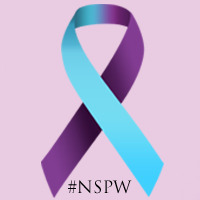
There are far more reasons to not talk about it. Those of us who suffer from suicidal thoughts also suffer shame for thinking them. The illnesses that lead to anguish and despair are themselves shameful, without the added "sin" and "crime" of killing oneself. I didn't want to talk about it then, not on Twitter, not to friends or family, not to therapists, and not even to crisis lines. I didn't want to be drama. I didn't want anyone to think I was manipulating them. When I felt better, I lied and told myself I was fine. When I felt terrible, I wanted everyone to think I was fine. I'm strong, independent, smart, rational. All the time. I wanted to pretend my weak times weren't really me.
Even well after the fact, I've hesitated and procrastinated writing this post. I've debated the merits and drawbacks. And then, along came Suicide Prevention Week. The Bloggess wrote a timely post on it, so I figured...
It's time. I am throwing aside my shame. I will use my aspy powers of unorthodox bluntness, and unwise social decisions, and a general blindness for knowing what's appropriate, and a pinch of impulsivity to tell everyone exactly how close I came to killing myself this year.
Because the stigma needs to end. Because those in pain need to feel okay reaching out. And those who suffer need to realize they're not the only ones who suffer. Anyone who finds themselves grasping the sheets in despair on those long, dark nights need to know that successful, talented, beautiful people also have dark nights, or weeks, or years when we hate ourselves. If someone like me can hate myself*, then maybe, just maybe, those other beautiful, talented, worthwhile souls will realize they, too, have something to be admired for. Something to contribute. Just one more little excuse to hang on a little longer. Because on those dark nights, every little excuse is a lifeline.
* Yes, I just called myself successful, talented, and beautiful. I'm also impulsive, blunt, socially unwise, and yeah we already covered that.
I survived suicide. It is hard to admit that to myself and be sympathetic. There is a trauma in surviving any brush with death, and as I've discovered, suicide is no different. Hearing about suicide takes me away to another place now, where I drift off into a melancholic, mild dissociation, where I'm tempted to erect walls to keep away the tears or depression, where I practice avoidance behaviors which are not typical for me, because I normally like to face emotions and problems head-on.
I have worked through enough PTSD to recognize it. Which only follows. If I'd had a gun pointed at me by an angry person (I have) or almost gotten into a car accident (I have), I'd feel the same.. a remnant of fear, lack of safety, the awareness that the same thing could happen again, at any time. And sadness because I remember how I felt. The desire to kill myself was the least of my worries. The relentless pain and terror that led me to that state is a not-too-distant wound that time has yet to heal. I fear that state, I fear myself, I fear the people around me who unwittingly helped me get into that state.
And the empathy I feel for anyone else in that state is overwhelming, if I let myself think about it.
This is not the first time I've felt suicidal. Long, long ago, when I was a young single mother with no prospects, I suffered relentless depression. I ideated, but never got serious. My religion listed suicide as the third worst sin (after murder and denying the Holy Ghost, but slightly worse than sex). The eternal consequences would make my shitty temporal life seem like heaven. This is exactly the type of harmful stigma I am now against, but at least it worked as an effective stop-gap measure to keep serious suicidal desires at bay long enough for me to get help.
I went to 12-step groups, read self-help books, got therapy whenever I could afford it (rarely), and learned about cognitive behavior methods (CBT). My depression became manageable and I left suicide in my distant history.
But the anxiety never really went away. Instead, found the strength to push through it, day after day after day. I did what I had to do to keep down a job and rear a child. I felt fear and did things anyway, never realizing I was suffering needlessly. I also coped by solving all problems as quickly as possible, and avoiding things had no solution.
If I can't solve or ignore a problem, fear builds and leads to situations that cause more anxiety. I'm especially set off by conflict, which, up until I met Roland, I was able to avoid most of the time. But being strong-willed, living with a strong-willed life partner leads to ample unavoidable conflict, which only escalated and compounded over the years. With every fight, so increased my anxiety, until I was melting down regularly, and terrified the rest of the time that a fight was just around the corner. I got to the point where I welcomed depression as a soothing relief from the long term throb of anxiety. It became the new normal. This became unsustainable.
So it was in April 2013 that I got my Asperger's diagnosis. First came relief. Finally, some answers. Finally, validation, an official certificate* I could wave at other people saying, "Yes, I'm really hurting this much. I'm not jus throwing a tantrum; I'm not trying to manipulate anyone. I really am terrified and overwhelmed and want to disappear into a tiny dot."
* They don't actually give you a certificate.
But like a blade with two edges, my diagnosis carried with it a frightening new truth—I will always be this way. Before, I held onto gossamer threads of hope: Therapy's this week. Once I get to the bottom of this trigger, I'll be okay. Once I improve my communication skills, everything will get better. I'll just read this book. Okay, now that book. I'll try harder to listen. I'll try harder to explain myself. I'll be more patient. He will eventually see how much he's hurting me. He will eventually listen to me. If only, if only... Solve, solve, solve.
Suddenly the spider had stopped spinning the silk. The fantasy of hope had transformed into... into what? I didn't know. All I knew was that parts of me, not sure which parts, but some parts, would never change. I'm just wired that way.
During my meltdowns, I've always tended to turn inward. The pain is raw and searing, a physical pain, like molten lava or acid is pumping through my veins. I am not exaggerating. I used to think it felt this way for everyone. I used to think burning skin was normal anxiety. So I curl inward when I'm melting down, and scratch at myself. I find odd relief in visualizing a physical cause for the pain. Knives stabbing. Razors slicing. I dig my fingernails into my wrists and hands and arms because the sharpness distracts a little from the fire playing on my skin.
So there's an Asperger's element that is not neurotypical, and totally different from traditional self-harm. I seek a sensation strong enough to wipe out my pain. Sometimes that means more pain, or different pain, or at least pain I have some control over. And this leads me to want to stop existing. And that leads me to wanting to die, to cease existing, to vanish from a world of horrors.
Out of long-habit, I grasp for a reason for my pain, and for a comforting explanation for why I'm behaving so shamefully and out of control. The argument begins with me trying to convince the other person of how much they are hurting me. This strategy often fails (why can't people just listen?) so after awhile, I start to blame myself. Every bad thing the other person has said, every shred of criticism, even that spoken out of pain or love, I turn inward, like a dagger. I imagine their words are a knife, and I make up my own phrases, and with all those words, I stab myself in the gut.
I fight off this moment in the conflict. I tell myself to stay calm, rational, but eventually, the dam breaks, the scale tips, and out come the internalized phrases of self-loathing. There's no rational thought left at this point—it isn't even possible. My amygdala has taken over and I'm in flight-fight-freeze-or-appease mode. Yes, I know I should be telling myself rational, true things, not these forms of verbal self-abuse, but I can't help it anymore.
It's like I have two sides, a little cartoon angel on one shoulder, and a devil on the other, representing my healthy and unhealthy voices. The deeper I go into anxiety, the louder the unhealthy one gets, until the healthy voice doesn't even try. That unhealthy voice starts out wanting to protect me in the only way she can. Defense is her goal. Protect the vulnerable bits. Be vigilant for danger. Everything is dangerous. Destroy the danger before it destroys me. Until the unhealthy voice gets too loud, and she wants to lash out, hurt myself, hurt others, wallow in self pity, or die. Her methods take on a life of their own. When it gets that far, I have a murderer living inside me. An ugly, spiteful murderer who knows all my weaknesses.
The healthy voice delivers all the hopeful phrases, the CBT, the patiences and validation and self-care. It's that healthy part of me that keeps me alive, even when she's just a whisper. She is what stops me from planning, who puts off doing the worst until the last possible minute. Sometimes she goes silent, and that is when things get most scary.
So I'm used to wanting to die during a meltdown, and used to wanting to hurt myself. That is very different from wanting to kill myself. Which is what changed in April.
My pain had been building for five years. I'd lost many of my previous sources of stability, ability to control my surroundings, and other coping mechanisms. Years of conflict baggage with Roland and a number of destabilizing life events and the diagnosis all culminated in the Grand Answer: It's all my fault. Or so it sometimes seemed. Most days I met with a hopeful outlook. I had information now. I had something I could work with. Roland was beginning to understand me and I was building new coping mechanisms.
But not in my darkest hours. In those moments, when my skin had been drenched in acid and set on fire, I was a broken, useless person. I was a horrible person, forever emotionally damaged, with no hope of improving. I had hurt the people around me, and I would always hurt the people around me, especially those I loved. I couldn't bear that thought. Worse, I felt rejected. No one wants to be around me when I am in pain. I chase everyone away. I am too much for them. Having Asperger's meant I would always be too much for them.
For the first time in nearly two decades, I wanted to kill myself. Unlike then, this time I was serious. No more did I have religious strictures against it. Beyond this life is likely only endless night, a soft peaceful sleep I craved.
My most recent, and worst episode was about a month ago. My healthy voice recognized I needed help, and I managed to mutter a "someone should watch me" warning before rushing to my room to hide under my desk. No one came to watch me right away. My partners had their own pain to figure out. They had to put on their own oxygen mask before helping me.
For first time in my life, I made a plan there, under that desk. I finally let myself figure out how I could do it painlessly. I began walking myself through the steps: Pull the car into the garage, close the door, and leave the engine running. [Spoiler: See below why this is actually a very bad plan.]
My healthy voice got quieter and quieter, yet more and more desperate, as I rehearsed each of the steps like a mantra. Finally, the healthy voice managed a solution that had gotten me through a previous night: Don't fight the self-destructive energies. Reroute them to something safer. I reached for a bottle of alcohol I'd bought in Iceland, which for reasons I'd been storing under there next to the recycling box, and I chugged. I had one goal: to make my body not function. If I couldn't move, then I couldn't park the car in the garage.
Eventually, Joci came to watch me, and she took care of me, and in my self-loathing drunken state, I could only tell her how sorry I was, over and over. I was ashamed and mortified by my behavior yet again, but at least I lived through the night.
Those who speak of suicide always plead, "Reach out to someone. Please. Just talk to someone." I'm one of those people now. Because I understand how much it hurts and I know exactly how hard it is to talk to anyone. You are so vulnerable in that moment, so tender. You are looking for any excuse to do it, and any excuse not to do it. You feel weak and helpless and whiny. You wonder if you're just trying to get attention. You remember all the weak, helpless, whiny people you've ever judged and realize you are now that person. You desperately need help, you want validation, you want comfort and love, but you know that if you ask someone for help, and they say no, you will suffer the deepest kind of rejection at the worst possible time, as if they are saying, "Go ahead and do it. See if I care."
Or so it seems. Because everything in that zone is distorted, like an emotional landscape by Salvador Dalí using your worst nightmares as paint. Anything painful is amplified, shouted over a megaphone, and anything soothing is ephemeral at best, ethereal at worst.
 The Great Masturbator, Dalí, 1929Outside the zone, it's easier to see how people care about you. Of course they care. If someone you knew felt suicidal, you'd rush to help them. In this safe space, I try to memorize what it's like to be the one who wants to help to use later. Most everyone I know would be willing to help me. My inner-angel knows that. My inner-devil doesn't believe a word of it. My inner devil believes everyone hates me, that I'm a bother, and I am crazy or needy or childish, and I should deal with problems on my own.
The Great Masturbator, Dalí, 1929Outside the zone, it's easier to see how people care about you. Of course they care. If someone you knew felt suicidal, you'd rush to help them. In this safe space, I try to memorize what it's like to be the one who wants to help to use later. Most everyone I know would be willing to help me. My inner-angel knows that. My inner-devil doesn't believe a word of it. My inner devil believes everyone hates me, that I'm a bother, and I am crazy or needy or childish, and I should deal with problems on my own.
In April, I contacted a crisis line. And in spite of my shame and fear that it was absolutely the wrong thing to do, I reached out to a relatively new friend. (See previous notes about impulsivity and lack of social filters.) "Gene" at the 839863 text number kept me alive one dark night, and Remy Nakamura kept me afloat through at least another. I don't think I've ever had anyone save my life before. These two did. And they would do it again. As would most anyone else in my close or even far circles.
(Those closest to you may not be capable of certain kinds of support. They are dealing with their own needs and you're entangled with them in ways that may lead to further pain as they try to protect themselves. This isn't because they don't love you—it's because they love you. Others may not be able or willing to help for their own reasons. Those are their own reasons that have no actual bearing on your worth.)
When fear and pain kick in, the neocortex actually stops working. So I have to spend this time, right now, while I'm feeling okay, to give my healthy voice tools to use when I'm on those dark paths. This is the time to remind myself that people want to help. Because later, it will take everything I have to convince myself.
My unhealthy voice wants tools, too. I sympathize with her (because she is me), and I know that someday I might be hiding under the desk again, and that plan with the car in the garage may come in handy. So I didn't reveal my plan to anyone in my family. But I did tell my psychiatrist, because ultimately, I don't really want a useful plan on standby. That is not conducive to my survival. Without blinking an eye, my psychiatrist informed me that the car-in-the-garage method almost always leaves the victim alive, with brain damage. Not so painless after all. Alive with brain damage is a fate worse than death. So I thankfully have no plan again. (I have such a smart psychiatrist. She knew exactly how to get to me.)
We are programmed by evolutionary forces to stay alive. Our bodies are remarkably resilient and will fight overwhelming odds to keep breathing. So what could cause an override of these instincts?
These three factors together ensure the risk of a completed suicide:
Thwarted Belongingness (feeling alone)Perceived Burdensomeness (yes, that seems to be a real word)Capability for Suicide (not afraid to die)
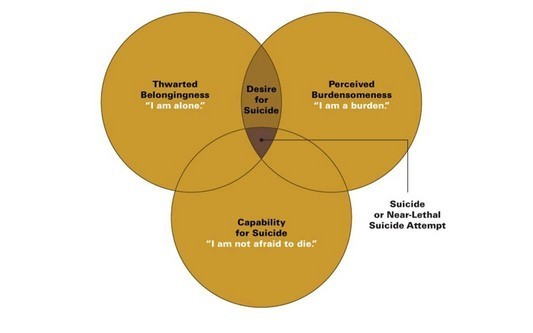 Image from Understanding Suicide In Helping Active Military,
Image from Understanding Suicide In Helping Active Military,
Veterans & Their Families Build Resilience in Facing Risk and AdversityWith only one or two of these items, ideation may occur. A victim may wish to die, or may fantasize about suicide, or attempt without really intending it to work. These are the "cries for help" we hear about, which are also, sadly, stigmatized. These are referred to as "just" cries for help, but think about that. Chances are, that person has been crying for help for so long, and no one has been listening. Their friends and family (and maybe even helping professionals) don't trust that the pain is real. Or perhaps well-meaning people simply don't know how to help. Either way, in this state of perpetual helplessness, the cry for help moves from words to actions, and it's important to listen rather than dismiss it as "just" anything.
Another important thing we learn from this diagram is that suicide is not selfish. "Perceived burdensomeness" comes from a places of self-hatred and a distorted idea that the world would be better off without me. I cause pain, therefore, if I really love my partners, I will remove myself from their lives completely. There's a sense of self-punishment, that I've committed too many crimes against humanity, and that I must take justice into my own hands. As ridiculous as this sounds, it seems as true as toast when it happens.
I feel passionately about reducing stigma around mental health and suicide. The victim is already taking on more than she can handle. At DEFCON 21, I attended a thought-provoking panel on suicide risk assessment given by Amber Baldet. As she rightly pointed out, society views suicide as a moral issue, and the language we use is important for framing that. Yes, had I "killed myself", I would have technically been complicit in my own murder. But it was, in most respects, as outside of my control as cancer or heart disease or a car accident. No one could have done anything more than I did to get healthy. I was seeing a therapist twice a month, and had been for years. I got a diagnosis for my condition. I spent many hours a week reading about how to cope with Asperger's. I was seeking, and finally taking, medication. I was meditating. I was self-soothing. I was taking deep breaths. I was reading aloud affirmations. I was seeking support from my family and friends while relying on myself as much as possible.
Even with all that, I still hurt badly enough to override my survival instinct. If that's not an illness, I don't know what is.
In her exit story from the LDS Church, "Losing My Mind, Bit By Bit", Pam Kazmaier said, "The reality of mental illness is discrimination and blame. It’s the only illness we blame people for having. It doesn’t happen with a heart attack, just a brain attack." And what I experienced is a brain attack. My brain seized up and ceased to function for so long and in such painful ways that I could only see one way out.
One dark night, Roland held me. Instead of continuing to vent his own frustration and pain, he simply held me and said, "This is all just a terrible nightmare. You're having a nightmare." He acknowledged my horror, naming it. He rocked me and told me that tomorrow when I awoke it would all be better. For the first time, he seemed to understand how much I hurt. And with that support, I was able to acknowledge to myself how nightmarish it was, like a heart attack, like a car accident, like being tortured.
No one "commits" suicide the way people commit a sin or a crime. Because no one commits a heart attack. This is a health issue, not a moral issue. Instead, people die or nearly die of suicide. It is a terrible health epidemic, and if it is at all a moral issue, we should look at society, not the victim. And no one "fails" a suicide attempt, as if there is success to be found in an otherwise preventable death.
I support Amber Baldet's suggestion that we change the language around this topic, and the morality of it, and the stigma. If I have pain in my chest, I call 911 without hesitation. If I have pain in my heart, I want to hide it. And there's something wrong with that.
No two people are alike, and when we hear that, we think of people's appearance, personality, and talents. But it also means that emotionally, we're also different. It's easy to judge. I think, "If I can do it, so can you. It's easy for me, so it should be easy for you, and if it's not, then there's something wrong with your motivation or drive or morals. I choose to be awesome, and so should you." That is society's predominant view. It stems from the well-intentioned Golden Rule, which states that we should treat others like we want to be treated. But it assumes we play on the same game board and were given the same starting position and none of the dice are loaded. It assumes we all have the same needs and wants and desires. It's a huge mistake because it leads to all kinds of distorted values.
It's easy to assume my experience is the same everyone else's. I compare myself to others. Look how far they got, when I'm still way back here. What we forget is that the playing field isn't the same for everyone. How easy it becomes to judge others. Along the way, we judge ourselves just as, or sometimes more, harshly.
In April, I discovered that I was bad at somethings, not because I was lazy, or not trying, or not choosing hard enough. It turns out that some tasks which are simple for most people are extremely difficult for me. Likewise, somethings that are super easy for me are really hard for most people.
Your experience of the world is nothing like anyone else's. If it seems easy for everyone else, but not for you, maybe that's because it really is harder for you. Maybe that means you need a little extra help in some areas, and you need people to be more patient and understanding with you. That's okay, because you have other strengths, more than enough to make up for them. That's why we live in a civilization, a society, where people specialize, so they don't have to become good at everything.
One thing I struggle with is that I feel emotions more powerfully than other people. And a number of other problems that lead to meltdowns and long, dark nights that are a struggle to survive. I have strengths to compensate.
I will tell you what I tell myself: There are people willing to help. If you don't feel safe enough trusting your friends or family (which is perfectly understandable if you feel vulnerable), then call a crisis line. If phones scare the hell out of you (like they do me), then did you know there are chat and SMS crisis lines? (Chat lines are often closed late at night. Text "ANSWER" to 839863, which is 24/7).
I know it's hard, scary, painful, but reach out. And if you try once and get turned down, or the number doesn't work, or something happens, don't take it as proof that no one loves you or wants to save you. (Believe me, I understand the allure of that temptation.) Give your angel-voice all the fuel you can and keep reaching out. Try one last time. And then try again.
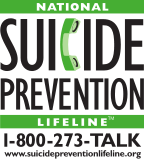
And seek professional help. If you're already seeing a therapist, call her. (I never manage to call mine, even though she's told me to. It's hard to want to "bother" her in the moment, but she assures me it's okay.) Consider talking to a psychiatrist about taking medication or changing your existing meds. If you're worried about money, I heard Obamacare expands mental health coverage for most people, so look into that. (Thanks, Obama.)
Amber Baldet recommends everyone develop a crisis plan while we're happy and healthy and the neocortex is working properly. Yes, everyone. Because even though it seems like life is perfect and blissful and I'm so healthy and awesome (clearly more heathy and rational than everyone else), we all are at risk of having a dark night. Shit happens, and it comes out of nowhere, and there could be some problem out there that finally gets to you.
A crisis plan is simply a list of things to do and people to talk to at various stages of emotional upset, up to and including feeling suicidal. You obtain agreements from people ahead of time — Person A can offer me X hours of time when things are bad, and person B can offer another Y hours when things are worse. And then you file it away with a giant note written in red marker, "IN CASE OF EMERGENCY!" Here's a link to the form. Fill it out. It's better than filling out a will, and the life you save could be your own.
I had lots of practical fears about reaching out. If you've never done it, it's an uncomfortable mystery. Will they laugh and tell you it isn't so bad? Will they pester you with tons of questions? Will the Secret Red Cross fly in rescue helicopters to rush you to a hospital you can't afford and lock you away without consent?
Well it's your lucky day because I can tell you what happens when you call a crisis line: They listen. You don't have to tell them anything. They aren't pushy. You can just dump on them, and say whatever you want, even your most shameful secrets. They don't send you to the hospital or anything. They just listen. And on dark nights, that means everything.
When you tell a therapist or psychiatrist, unless you're ready to do it right then, they just listen, too. And then they help you to get healthy using their powerful skills and expertise that comes from schooling and experience. They give you tools to self-sooth and otherwise avoid pain and give you strategies for avoiding suicide itself. You may end up with a therapist or doctor that sucks, in which case, by all means, find someone who fits better. You can fire a therapist at any time.
What happens when you tell friends or family? Most of your friends (if they're worth being your friend) care about you and want to help and will do everything within their skills and power to do so. Keep in mind that everyone has their own fears and weaknesses and everyone makes mistakes. Not every friend will handle it well. There are a lot of myths about suicide, and chances are they believe some or all of them, and might react poorly. Don't take this as a sign that you suck, and don't take it as a reason to not reach out. Give it a try, and you might be pleasantly surprised. I know I was.
You are not alone. I don't just mean that in the cliched sense, or in the sense that people are in the room with you right now. I also mean that the person in the room with you may be just as sad as you, just as anxious, just as fearful or dying a little bit, day by day. The people you admire most may have struggled with suicide in their past, or may even be struggling right now. You will probably never know, because they probably will never tell you. They're just as ashamed of it as you are.
It's hard for me to say I survived, past tense, because the threat remains, lurking there in the shadows. I feel fine today; in fact, I feel great. But in many ways, it feels like I am still surviving, like at any moment, great will turn to terrible, and the despair will have me again. Until then, I do all I can to feed the positive voice that wants me to stay alive. And encourage that positive voice in others.
Yeah, the world is filled with an incomprehensible number of unique snowflakes. Yet I cannot be replaced. And neither can you.
This year, I survived suicide. At least three times. The incidents have started to blur together, so let's go with three. It's a nice round number.
I've only recently stabilized enough to process what that means. Last week a friend attempted, and the strong emotions that bubbled up showed just how much I needed to process my own recent encounters with death. I'm not here to tell her story. It's not mine to tell. But I've decided to finally tell my own.

There are far more reasons to not talk about it. Those of us who suffer from suicidal thoughts also suffer shame for thinking them. The illnesses that lead to anguish and despair are themselves shameful, without the added "sin" and "crime" of killing oneself. I didn't want to talk about it then, not on Twitter, not to friends or family, not to therapists, and not even to crisis lines. I didn't want to be drama. I didn't want anyone to think I was manipulating them. When I felt better, I lied and told myself I was fine. When I felt terrible, I wanted everyone to think I was fine. I'm strong, independent, smart, rational. All the time. I wanted to pretend my weak times weren't really me.
Even well after the fact, I've hesitated and procrastinated writing this post. I've debated the merits and drawbacks. And then, along came Suicide Prevention Week. The Bloggess wrote a timely post on it, so I figured...
It's time. I am throwing aside my shame. I will use my aspy powers of unorthodox bluntness, and unwise social decisions, and a general blindness for knowing what's appropriate, and a pinch of impulsivity to tell everyone exactly how close I came to killing myself this year.
Because the stigma needs to end. Because those in pain need to feel okay reaching out. And those who suffer need to realize they're not the only ones who suffer. Anyone who finds themselves grasping the sheets in despair on those long, dark nights need to know that successful, talented, beautiful people also have dark nights, or weeks, or years when we hate ourselves. If someone like me can hate myself*, then maybe, just maybe, those other beautiful, talented, worthwhile souls will realize they, too, have something to be admired for. Something to contribute. Just one more little excuse to hang on a little longer. Because on those dark nights, every little excuse is a lifeline.
* Yes, I just called myself successful, talented, and beautiful. I'm also impulsive, blunt, socially unwise, and yeah we already covered that.
I survived suicide. It is hard to admit that to myself and be sympathetic. There is a trauma in surviving any brush with death, and as I've discovered, suicide is no different. Hearing about suicide takes me away to another place now, where I drift off into a melancholic, mild dissociation, where I'm tempted to erect walls to keep away the tears or depression, where I practice avoidance behaviors which are not typical for me, because I normally like to face emotions and problems head-on.
I have worked through enough PTSD to recognize it. Which only follows. If I'd had a gun pointed at me by an angry person (I have) or almost gotten into a car accident (I have), I'd feel the same.. a remnant of fear, lack of safety, the awareness that the same thing could happen again, at any time. And sadness because I remember how I felt. The desire to kill myself was the least of my worries. The relentless pain and terror that led me to that state is a not-too-distant wound that time has yet to heal. I fear that state, I fear myself, I fear the people around me who unwittingly helped me get into that state.
And the empathy I feel for anyone else in that state is overwhelming, if I let myself think about it.
This is not the first time I've felt suicidal. Long, long ago, when I was a young single mother with no prospects, I suffered relentless depression. I ideated, but never got serious. My religion listed suicide as the third worst sin (after murder and denying the Holy Ghost, but slightly worse than sex). The eternal consequences would make my shitty temporal life seem like heaven. This is exactly the type of harmful stigma I am now against, but at least it worked as an effective stop-gap measure to keep serious suicidal desires at bay long enough for me to get help.
I went to 12-step groups, read self-help books, got therapy whenever I could afford it (rarely), and learned about cognitive behavior methods (CBT). My depression became manageable and I left suicide in my distant history.
But the anxiety never really went away. Instead, found the strength to push through it, day after day after day. I did what I had to do to keep down a job and rear a child. I felt fear and did things anyway, never realizing I was suffering needlessly. I also coped by solving all problems as quickly as possible, and avoiding things had no solution.
If I can't solve or ignore a problem, fear builds and leads to situations that cause more anxiety. I'm especially set off by conflict, which, up until I met Roland, I was able to avoid most of the time. But being strong-willed, living with a strong-willed life partner leads to ample unavoidable conflict, which only escalated and compounded over the years. With every fight, so increased my anxiety, until I was melting down regularly, and terrified the rest of the time that a fight was just around the corner. I got to the point where I welcomed depression as a soothing relief from the long term throb of anxiety. It became the new normal. This became unsustainable.
So it was in April 2013 that I got my Asperger's diagnosis. First came relief. Finally, some answers. Finally, validation, an official certificate* I could wave at other people saying, "Yes, I'm really hurting this much. I'm not jus throwing a tantrum; I'm not trying to manipulate anyone. I really am terrified and overwhelmed and want to disappear into a tiny dot."
* They don't actually give you a certificate.
But like a blade with two edges, my diagnosis carried with it a frightening new truth—I will always be this way. Before, I held onto gossamer threads of hope: Therapy's this week. Once I get to the bottom of this trigger, I'll be okay. Once I improve my communication skills, everything will get better. I'll just read this book. Okay, now that book. I'll try harder to listen. I'll try harder to explain myself. I'll be more patient. He will eventually see how much he's hurting me. He will eventually listen to me. If only, if only... Solve, solve, solve.
Suddenly the spider had stopped spinning the silk. The fantasy of hope had transformed into... into what? I didn't know. All I knew was that parts of me, not sure which parts, but some parts, would never change. I'm just wired that way.
During my meltdowns, I've always tended to turn inward. The pain is raw and searing, a physical pain, like molten lava or acid is pumping through my veins. I am not exaggerating. I used to think it felt this way for everyone. I used to think burning skin was normal anxiety. So I curl inward when I'm melting down, and scratch at myself. I find odd relief in visualizing a physical cause for the pain. Knives stabbing. Razors slicing. I dig my fingernails into my wrists and hands and arms because the sharpness distracts a little from the fire playing on my skin.
So there's an Asperger's element that is not neurotypical, and totally different from traditional self-harm. I seek a sensation strong enough to wipe out my pain. Sometimes that means more pain, or different pain, or at least pain I have some control over. And this leads me to want to stop existing. And that leads me to wanting to die, to cease existing, to vanish from a world of horrors.
Out of long-habit, I grasp for a reason for my pain, and for a comforting explanation for why I'm behaving so shamefully and out of control. The argument begins with me trying to convince the other person of how much they are hurting me. This strategy often fails (why can't people just listen?) so after awhile, I start to blame myself. Every bad thing the other person has said, every shred of criticism, even that spoken out of pain or love, I turn inward, like a dagger. I imagine their words are a knife, and I make up my own phrases, and with all those words, I stab myself in the gut.
I fight off this moment in the conflict. I tell myself to stay calm, rational, but eventually, the dam breaks, the scale tips, and out come the internalized phrases of self-loathing. There's no rational thought left at this point—it isn't even possible. My amygdala has taken over and I'm in flight-fight-freeze-or-appease mode. Yes, I know I should be telling myself rational, true things, not these forms of verbal self-abuse, but I can't help it anymore.
It's like I have two sides, a little cartoon angel on one shoulder, and a devil on the other, representing my healthy and unhealthy voices. The deeper I go into anxiety, the louder the unhealthy one gets, until the healthy voice doesn't even try. That unhealthy voice starts out wanting to protect me in the only way she can. Defense is her goal. Protect the vulnerable bits. Be vigilant for danger. Everything is dangerous. Destroy the danger before it destroys me. Until the unhealthy voice gets too loud, and she wants to lash out, hurt myself, hurt others, wallow in self pity, or die. Her methods take on a life of their own. When it gets that far, I have a murderer living inside me. An ugly, spiteful murderer who knows all my weaknesses.
The healthy voice delivers all the hopeful phrases, the CBT, the patiences and validation and self-care. It's that healthy part of me that keeps me alive, even when she's just a whisper. She is what stops me from planning, who puts off doing the worst until the last possible minute. Sometimes she goes silent, and that is when things get most scary.
So I'm used to wanting to die during a meltdown, and used to wanting to hurt myself. That is very different from wanting to kill myself. Which is what changed in April.
My pain had been building for five years. I'd lost many of my previous sources of stability, ability to control my surroundings, and other coping mechanisms. Years of conflict baggage with Roland and a number of destabilizing life events and the diagnosis all culminated in the Grand Answer: It's all my fault. Or so it sometimes seemed. Most days I met with a hopeful outlook. I had information now. I had something I could work with. Roland was beginning to understand me and I was building new coping mechanisms.
But not in my darkest hours. In those moments, when my skin had been drenched in acid and set on fire, I was a broken, useless person. I was a horrible person, forever emotionally damaged, with no hope of improving. I had hurt the people around me, and I would always hurt the people around me, especially those I loved. I couldn't bear that thought. Worse, I felt rejected. No one wants to be around me when I am in pain. I chase everyone away. I am too much for them. Having Asperger's meant I would always be too much for them.
For the first time in nearly two decades, I wanted to kill myself. Unlike then, this time I was serious. No more did I have religious strictures against it. Beyond this life is likely only endless night, a soft peaceful sleep I craved.
My most recent, and worst episode was about a month ago. My healthy voice recognized I needed help, and I managed to mutter a "someone should watch me" warning before rushing to my room to hide under my desk. No one came to watch me right away. My partners had their own pain to figure out. They had to put on their own oxygen mask before helping me.
For first time in my life, I made a plan there, under that desk. I finally let myself figure out how I could do it painlessly. I began walking myself through the steps: Pull the car into the garage, close the door, and leave the engine running. [Spoiler: See below why this is actually a very bad plan.]
My healthy voice got quieter and quieter, yet more and more desperate, as I rehearsed each of the steps like a mantra. Finally, the healthy voice managed a solution that had gotten me through a previous night: Don't fight the self-destructive energies. Reroute them to something safer. I reached for a bottle of alcohol I'd bought in Iceland, which for reasons I'd been storing under there next to the recycling box, and I chugged. I had one goal: to make my body not function. If I couldn't move, then I couldn't park the car in the garage.
Eventually, Joci came to watch me, and she took care of me, and in my self-loathing drunken state, I could only tell her how sorry I was, over and over. I was ashamed and mortified by my behavior yet again, but at least I lived through the night.
Those who speak of suicide always plead, "Reach out to someone. Please. Just talk to someone." I'm one of those people now. Because I understand how much it hurts and I know exactly how hard it is to talk to anyone. You are so vulnerable in that moment, so tender. You are looking for any excuse to do it, and any excuse not to do it. You feel weak and helpless and whiny. You wonder if you're just trying to get attention. You remember all the weak, helpless, whiny people you've ever judged and realize you are now that person. You desperately need help, you want validation, you want comfort and love, but you know that if you ask someone for help, and they say no, you will suffer the deepest kind of rejection at the worst possible time, as if they are saying, "Go ahead and do it. See if I care."
Or so it seems. Because everything in that zone is distorted, like an emotional landscape by Salvador Dalí using your worst nightmares as paint. Anything painful is amplified, shouted over a megaphone, and anything soothing is ephemeral at best, ethereal at worst.
 The Great Masturbator, Dalí, 1929Outside the zone, it's easier to see how people care about you. Of course they care. If someone you knew felt suicidal, you'd rush to help them. In this safe space, I try to memorize what it's like to be the one who wants to help to use later. Most everyone I know would be willing to help me. My inner-angel knows that. My inner-devil doesn't believe a word of it. My inner devil believes everyone hates me, that I'm a bother, and I am crazy or needy or childish, and I should deal with problems on my own.
The Great Masturbator, Dalí, 1929Outside the zone, it's easier to see how people care about you. Of course they care. If someone you knew felt suicidal, you'd rush to help them. In this safe space, I try to memorize what it's like to be the one who wants to help to use later. Most everyone I know would be willing to help me. My inner-angel knows that. My inner-devil doesn't believe a word of it. My inner devil believes everyone hates me, that I'm a bother, and I am crazy or needy or childish, and I should deal with problems on my own.In April, I contacted a crisis line. And in spite of my shame and fear that it was absolutely the wrong thing to do, I reached out to a relatively new friend. (See previous notes about impulsivity and lack of social filters.) "Gene" at the 839863 text number kept me alive one dark night, and Remy Nakamura kept me afloat through at least another. I don't think I've ever had anyone save my life before. These two did. And they would do it again. As would most anyone else in my close or even far circles.
(Those closest to you may not be capable of certain kinds of support. They are dealing with their own needs and you're entangled with them in ways that may lead to further pain as they try to protect themselves. This isn't because they don't love you—it's because they love you. Others may not be able or willing to help for their own reasons. Those are their own reasons that have no actual bearing on your worth.)
When fear and pain kick in, the neocortex actually stops working. So I have to spend this time, right now, while I'm feeling okay, to give my healthy voice tools to use when I'm on those dark paths. This is the time to remind myself that people want to help. Because later, it will take everything I have to convince myself.
My unhealthy voice wants tools, too. I sympathize with her (because she is me), and I know that someday I might be hiding under the desk again, and that plan with the car in the garage may come in handy. So I didn't reveal my plan to anyone in my family. But I did tell my psychiatrist, because ultimately, I don't really want a useful plan on standby. That is not conducive to my survival. Without blinking an eye, my psychiatrist informed me that the car-in-the-garage method almost always leaves the victim alive, with brain damage. Not so painless after all. Alive with brain damage is a fate worse than death. So I thankfully have no plan again. (I have such a smart psychiatrist. She knew exactly how to get to me.)
We are programmed by evolutionary forces to stay alive. Our bodies are remarkably resilient and will fight overwhelming odds to keep breathing. So what could cause an override of these instincts?
These three factors together ensure the risk of a completed suicide:
Thwarted Belongingness (feeling alone)Perceived Burdensomeness (yes, that seems to be a real word)Capability for Suicide (not afraid to die)
 Image from Understanding Suicide In Helping Active Military,
Image from Understanding Suicide In Helping Active Military, Veterans & Their Families Build Resilience in Facing Risk and AdversityWith only one or two of these items, ideation may occur. A victim may wish to die, or may fantasize about suicide, or attempt without really intending it to work. These are the "cries for help" we hear about, which are also, sadly, stigmatized. These are referred to as "just" cries for help, but think about that. Chances are, that person has been crying for help for so long, and no one has been listening. Their friends and family (and maybe even helping professionals) don't trust that the pain is real. Or perhaps well-meaning people simply don't know how to help. Either way, in this state of perpetual helplessness, the cry for help moves from words to actions, and it's important to listen rather than dismiss it as "just" anything.
Another important thing we learn from this diagram is that suicide is not selfish. "Perceived burdensomeness" comes from a places of self-hatred and a distorted idea that the world would be better off without me. I cause pain, therefore, if I really love my partners, I will remove myself from their lives completely. There's a sense of self-punishment, that I've committed too many crimes against humanity, and that I must take justice into my own hands. As ridiculous as this sounds, it seems as true as toast when it happens.
I feel passionately about reducing stigma around mental health and suicide. The victim is already taking on more than she can handle. At DEFCON 21, I attended a thought-provoking panel on suicide risk assessment given by Amber Baldet. As she rightly pointed out, society views suicide as a moral issue, and the language we use is important for framing that. Yes, had I "killed myself", I would have technically been complicit in my own murder. But it was, in most respects, as outside of my control as cancer or heart disease or a car accident. No one could have done anything more than I did to get healthy. I was seeing a therapist twice a month, and had been for years. I got a diagnosis for my condition. I spent many hours a week reading about how to cope with Asperger's. I was seeking, and finally taking, medication. I was meditating. I was self-soothing. I was taking deep breaths. I was reading aloud affirmations. I was seeking support from my family and friends while relying on myself as much as possible.
Even with all that, I still hurt badly enough to override my survival instinct. If that's not an illness, I don't know what is.
In her exit story from the LDS Church, "Losing My Mind, Bit By Bit", Pam Kazmaier said, "The reality of mental illness is discrimination and blame. It’s the only illness we blame people for having. It doesn’t happen with a heart attack, just a brain attack." And what I experienced is a brain attack. My brain seized up and ceased to function for so long and in such painful ways that I could only see one way out.
One dark night, Roland held me. Instead of continuing to vent his own frustration and pain, he simply held me and said, "This is all just a terrible nightmare. You're having a nightmare." He acknowledged my horror, naming it. He rocked me and told me that tomorrow when I awoke it would all be better. For the first time, he seemed to understand how much I hurt. And with that support, I was able to acknowledge to myself how nightmarish it was, like a heart attack, like a car accident, like being tortured.
No one "commits" suicide the way people commit a sin or a crime. Because no one commits a heart attack. This is a health issue, not a moral issue. Instead, people die or nearly die of suicide. It is a terrible health epidemic, and if it is at all a moral issue, we should look at society, not the victim. And no one "fails" a suicide attempt, as if there is success to be found in an otherwise preventable death.
I support Amber Baldet's suggestion that we change the language around this topic, and the morality of it, and the stigma. If I have pain in my chest, I call 911 without hesitation. If I have pain in my heart, I want to hide it. And there's something wrong with that.
No two people are alike, and when we hear that, we think of people's appearance, personality, and talents. But it also means that emotionally, we're also different. It's easy to judge. I think, "If I can do it, so can you. It's easy for me, so it should be easy for you, and if it's not, then there's something wrong with your motivation or drive or morals. I choose to be awesome, and so should you." That is society's predominant view. It stems from the well-intentioned Golden Rule, which states that we should treat others like we want to be treated. But it assumes we play on the same game board and were given the same starting position and none of the dice are loaded. It assumes we all have the same needs and wants and desires. It's a huge mistake because it leads to all kinds of distorted values.
It's easy to assume my experience is the same everyone else's. I compare myself to others. Look how far they got, when I'm still way back here. What we forget is that the playing field isn't the same for everyone. How easy it becomes to judge others. Along the way, we judge ourselves just as, or sometimes more, harshly.
In April, I discovered that I was bad at somethings, not because I was lazy, or not trying, or not choosing hard enough. It turns out that some tasks which are simple for most people are extremely difficult for me. Likewise, somethings that are super easy for me are really hard for most people.
Your experience of the world is nothing like anyone else's. If it seems easy for everyone else, but not for you, maybe that's because it really is harder for you. Maybe that means you need a little extra help in some areas, and you need people to be more patient and understanding with you. That's okay, because you have other strengths, more than enough to make up for them. That's why we live in a civilization, a society, where people specialize, so they don't have to become good at everything.
One thing I struggle with is that I feel emotions more powerfully than other people. And a number of other problems that lead to meltdowns and long, dark nights that are a struggle to survive. I have strengths to compensate.
I will tell you what I tell myself: There are people willing to help. If you don't feel safe enough trusting your friends or family (which is perfectly understandable if you feel vulnerable), then call a crisis line. If phones scare the hell out of you (like they do me), then did you know there are chat and SMS crisis lines? (Chat lines are often closed late at night. Text "ANSWER" to 839863, which is 24/7).
I know it's hard, scary, painful, but reach out. And if you try once and get turned down, or the number doesn't work, or something happens, don't take it as proof that no one loves you or wants to save you. (Believe me, I understand the allure of that temptation.) Give your angel-voice all the fuel you can and keep reaching out. Try one last time. And then try again.

And seek professional help. If you're already seeing a therapist, call her. (I never manage to call mine, even though she's told me to. It's hard to want to "bother" her in the moment, but she assures me it's okay.) Consider talking to a psychiatrist about taking medication or changing your existing meds. If you're worried about money, I heard Obamacare expands mental health coverage for most people, so look into that. (Thanks, Obama.)
Amber Baldet recommends everyone develop a crisis plan while we're happy and healthy and the neocortex is working properly. Yes, everyone. Because even though it seems like life is perfect and blissful and I'm so healthy and awesome (clearly more heathy and rational than everyone else), we all are at risk of having a dark night. Shit happens, and it comes out of nowhere, and there could be some problem out there that finally gets to you.
A crisis plan is simply a list of things to do and people to talk to at various stages of emotional upset, up to and including feeling suicidal. You obtain agreements from people ahead of time — Person A can offer me X hours of time when things are bad, and person B can offer another Y hours when things are worse. And then you file it away with a giant note written in red marker, "IN CASE OF EMERGENCY!" Here's a link to the form. Fill it out. It's better than filling out a will, and the life you save could be your own.
I had lots of practical fears about reaching out. If you've never done it, it's an uncomfortable mystery. Will they laugh and tell you it isn't so bad? Will they pester you with tons of questions? Will the Secret Red Cross fly in rescue helicopters to rush you to a hospital you can't afford and lock you away without consent?
Well it's your lucky day because I can tell you what happens when you call a crisis line: They listen. You don't have to tell them anything. They aren't pushy. You can just dump on them, and say whatever you want, even your most shameful secrets. They don't send you to the hospital or anything. They just listen. And on dark nights, that means everything.
When you tell a therapist or psychiatrist, unless you're ready to do it right then, they just listen, too. And then they help you to get healthy using their powerful skills and expertise that comes from schooling and experience. They give you tools to self-sooth and otherwise avoid pain and give you strategies for avoiding suicide itself. You may end up with a therapist or doctor that sucks, in which case, by all means, find someone who fits better. You can fire a therapist at any time.
What happens when you tell friends or family? Most of your friends (if they're worth being your friend) care about you and want to help and will do everything within their skills and power to do so. Keep in mind that everyone has their own fears and weaknesses and everyone makes mistakes. Not every friend will handle it well. There are a lot of myths about suicide, and chances are they believe some or all of them, and might react poorly. Don't take this as a sign that you suck, and don't take it as a reason to not reach out. Give it a try, and you might be pleasantly surprised. I know I was.
You are not alone. I don't just mean that in the cliched sense, or in the sense that people are in the room with you right now. I also mean that the person in the room with you may be just as sad as you, just as anxious, just as fearful or dying a little bit, day by day. The people you admire most may have struggled with suicide in their past, or may even be struggling right now. You will probably never know, because they probably will never tell you. They're just as ashamed of it as you are.
It's hard for me to say I survived, past tense, because the threat remains, lurking there in the shadows. I feel fine today; in fact, I feel great. But in many ways, it feels like I am still surviving, like at any moment, great will turn to terrible, and the despair will have me again. Until then, I do all I can to feed the positive voice that wants me to stay alive. And encourage that positive voice in others.
Yeah, the world is filled with an incomprehensible number of unique snowflakes. Yet I cannot be replaced. And neither can you.
Published on September 10, 2013 20:08
August 27, 2013
Mind Control 101: Cogs of Dissonance
Your brain is full of machines. Each machine is made of thousands of cogs spinning in tandem with one another, and all the machines are more or less connected and dependent upon each other. When a cog starts to break down, other parts of the machine pitch in to repair it, replace it, or bypass it. This is because your survival is dependent upon the smooth functioning of each and every cog.
Or so the machines want you to think. Because they control you.
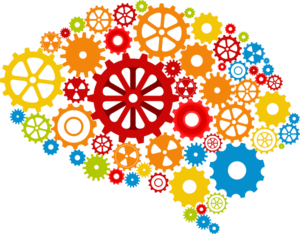 This is your brain on cogs.
This is your brain on cogs.
Any questions?This is, of course, an analogy which I'm using to illustrate a complicated idea -- the theory of cognitive dissonance. A cognition (or cog) is any single thought, feeling, idea, concept, perception, behavior, social feedback, memory, attitude, goal, value, or commitment. When you put them together with other cognitions, they build all the belief systems that make up you. Earth is round, tacos are delicious, love feels nice, kittens are fuzzy, corporations are evil, God is great, and Republicans all suck and should go hide in a cave until they come up with some way to not look like a bunch of clowns.
Or whatever it is you believe. I happen to have a moderate opinion on the flavor of tacos, and I've never met God so I'm not sure how neat He is.
Each of these cogs, and the belief systems they build, have varying levels of importance. There are people who would die to save their favorite taco, and other people who don't really care that much about food. How strongly you feel when your precious (or not-so-precious) cog is threatened will inform your reaction to various kinds of incoming cogs that other people throw at you. By the way... you might want to duck.
You see, living in the world means we constantly encounter new cognitions every day. The Flat Earth Society distributes pamphlets, paleovangelists push their anti-taco propaganda, love breaks your heart, kittens are proven to cause cancer, corporations run ads about saving lives, atheists say God is not great, and you've got friends who are Republican. Everyone has a different message to push, and if we really believed everything we heard, we'd change our minds everyday about everything. More frighteningly, we'd never know what brand of breakfast cereal to buy. (I'm a paleovangelist, so I don't buy cereal brands. None of them are true.) Our brains need some sort of mechanism to hold all our cogs together or they'd roll bouncing our of our heads and people would trip on them and fall down.
That mechanism is an emotional reward and punishment system known as Cognitive Consonance and Dissonance. Consonance is a good feeling. When we see a beautiful taco on TV, spinning in a glorious light, with beautiful green lettuce hand-picked for its photogenic properties, sticking out from the crunchy shell at aesthetically pleasing angles, and the announcer shouts, "Recommended by four out of five dentists who chew gum for people who like mouthwatering, savory tacos!", we think "Yes! I knew it! I knew I loved tacos. And now they're healthy, too! Sweet Jesus I was right all along! Baptize me in Fire™ sauce!"
Dissonance occurs when we take in information that is contrary to an existing belief. The more cherished the belief, the more powerful this feeling. It drives us to protect our sacred cogs and the giant, powerful machines they hold together. 9,329* studies last year show that corn is horribly bad for you. It's probably why we are all coming down with diabetes. But if you really love tacos, you don't want to hear this. The more you love tacos, the less you want to hear this. And that feeling is called cognitive dissonance.
* I made this up. But some studies showed this. I'm lazy. Go google it.
Cognitive dissonance isn't just one feeling. It can manifest in a whole range of uncomfortable emotional side effects: Confusion, irritation, annoyance, anger, rage, sadness, denial, defensiveness, nervousness, anxiety, irritable bowel syndrome, easy bruising, weight gain, and painful erections lasting more than four hours. (The last four are extremely rare. I'm sure you'll be fine.) Under those conditions, you will be highly motivated to rid yourself of the offending thought in some way, so you can go back to eating tacos in health-defying glee.
In the end, we don't want to feel crazy, because to feel crazy is to die. To willy-nilly accept new beliefs without some type of discomfort might cause insanity. So would dumping out all our old beliefs without good reason. As would actually believing six impossible things before breakfast. So dissonance and consonance work together to make all the cogs in our mind somehow fit together, even when sometimes they directly conflict with one another. Even when sometimes, in reality, they make us believe impossible things. Like pretty much everything you believe right now.
Just kidding.
But only a little bit.
There are a number of strategies our minds use to handle cognitive dissonance. They all involve lowering dissonance or increasing consonance, or some combination of both. The fact that one cog (I like tacos) might be connected to alot of other cogs (I want to be healthy; I believe in science; I can eat whatever I want; this is America where we have freedom to eat what we want; people who threaten freedom are Communists; I hate Communists; I also like Doritos; Doritos are made out of corn; some tacos are made out of Doritos; Jesus ate tacos at the Last Supper; Jesus can't be wrong; Jesus wasn't a Communist) can promote the importance of that cog and increase the intensity of the dissonance. If you can't resolve the conflict, an entire machine might break. And we can't have that.
Protect the Cogs!
The process of resolving dissonance happens automatically. Sometimes it only takes a couple of seconds to walk through all the options and emotions they inspire and logical links they create, to come up with a resolution. Sometimes it takes days or longer. Here are the three strategies:
1. Alter Cogs -- We've got the old cogs and this new interloper that threatens to break the machine. So we can change something, either the new cognition, or an old one.
Sometimes the easiest thing is to reject the new idea. "There must be something wrong with that study. With uh... all 9,329 studies. I'm just going to pretend I never heard of it. Crunch crunch yes, nine out of ten dentists agree with me. So good."
Or you can alter one or more of your existing beliefs or behaviors.
Science doesn't know anything. Crunch crunch.Besides, I'm going to die anyway. Might as well crunch crunch.And tacos don't even have corn. That's just a myth! Crunch crunch.As a last resort, depending on how much we like tacos, we may even change that cherished sacred cog: "Okay, fine. Science has persuaded me to be a Communist. I will stop eating tacos and I now believe Taco Bell should be dismantled by the government. Vive la paleo!"
2. Add New Cogs -- By adding new cogs we can create new systems that help the old system work alongside the new one. "Yes, I believe in science and I still want to be healthy and I still love America. Which is why I have become convinced all corn studies are funded by the anti-corn lobby which is secretly controlled by aliens who know that corn actually makes us stronger and more immune to their mind control rays!"
We can also take steps to increase cognitive consonance to drown out any remaining discomfort, say by joining an alien abduction support group where they let us present evidence for this conspiracy as they nod their heads in heart-warming agreement, and every once in awhile, Old Bob shouts, "I knew it!" right before eating the last taco, and every time he does that, it sparks a new round of cognitive dissonance, because you like it when Old Bob agrees with you, but damn it, that was the last taco!
3. Alter Importance -- You may have noticed that importance is important in how important the importance of the dissonance is. To put it more simply, if you can merely lower how important you think one or more cogs is, you will find instant relief. This is the solution you've come to when you shout, "FINE! I never liked tacos anyway! God just leave me alone, stupid scientists!" Maybe you keep eating tacos, but decide your health isn't that big a deal, or that science isn't a big deal. Freedom's just another word for nothing left to lose, right? So you embrace Communism and tacos and science and freedom and corn, because nothing really matters, and congratulations, you're a nihilist. Dissonance doesn't even exist anymore. Did it ever? If it did, it shouldn't have.
On this same scale, you can increase the importance of cognitions that give you consonance. Suddenly, you're looking at pictures of kittens on the internet, because boy, they sure are fuzzy. Ah, doesn't that feel good? You commit to a new diet plan to eat five tacos a day, to overcome your fear of commitment which is something you've been meaning to do anyway, and you can almost forget about those 9,329 studies. Yay corn! Crunch crunch.
Mind Control?
What does any of this have to do with mind control? Everything! So sit down and stop asking questions and believe everything I say. You trust me, right? Because once I've earned your trust by stoking flames of consonance using your existing belief in kittens and the omniscient power of tacos, I will need to reroute any dissonance you may feel as I slowly install my own cogs. Many of those cogs will be specially designed to elevate the importance of the beliefs I want you to have while giving you the tools you'll need to handle dissonance that will be thrown at you from the outside world. Because when you belong to a cult, you will have lots of opportunities to feel dissonance. You will depend on social approval from the group to feel consonance.
Mind control techniques can be seen as a system of beliefs designed to protect the belief system when the rest of the world, and its facts, regularly disagrees.
Almost every mind control technique has to do with manipulating cogs. Any totalist group must overcome your overwhelming cognitive dissonance which was originally designed by evolution to make you not believe everything people tell you. The cult must make you believe what they have to tell you, so they will use cognitive consonance by telling you things you already agree with, to overcome your dissonance about how weird they are and about how they are secretly communists who will eventually restrict your intake of tacos but not before giving you three free kittens and praising Fire™ sauce. (Plus Bob isn't there to eat the last taco.)
Once you've attended enough meetings and now have committed to pledging life-giving care to ten precious fuzzy lifepuffs, which you've named after famous historical tacos, the totalist group will begin installing new beliefs that you never had before, cogs that will lock you into the group and make it extremely painful to leave. Some cogs are designed to keep you isolated from dissonance-causing information. Some are designed to bounce the bullets of dissonance right off your newly-thickened skull. Some are designed to create dependence, and increase the importance of community and social pressure. Some are designed to suppress any doubts that arise, and prevent you from voicing criticism. Some can even give you phobias to prevent you from leaving. They convince you that the group is keeping you safe, so the idea of accepting new cognitions will literally cause fear to pound in your chest.
Your new cult will promote the importance of tacos until yes, you will die to defend tacos, while simultaneously accepting new restrictions on actually eating them. You quickly learn to hate the government (which funds studies into the health effects of corn), hate science (which actually does studies on corn), and hate all paleovangelists who are clearly sent from the Great Satan of Carb Haters to destroy all the Good People like you that God has chosen to promote kittens and tacos. I mean, who could hate a kitten, except a devil worshipper?
Cornclusion
Cogclusion
Cognitive dissonance is actually good. It's good for your sanity, survival, and for humanity. It's how we learn and how we defend ourselves from snakeoil salesmen. Except when the salesman is selling really good snakeoil and it cures what ails you and you saw it with your own eyes, a lame boy could walk it's a miracle, please take my money!
Yes, dissonance and consonance can be manipulated. But the fact is, it has to be manipulated. Only tricky smart people are able to do it, and even then, only sometimes. By learning about dissonance and manipulation techniques, you are installing new cogs that prevent the installation of harmful cogs. Adopting an attitude of healthy skepticism, and demanding facts, and researching more than one source and opinion will help those nasty Cogs of Evil bounce right off your forehead... tho not without a little pain.
And even then, somewhere out there, is a cult leader who will find a way to take advantage of you. It may have already happened. I hope that thought doesn't make you too uncomfortable.
THIS POST IS PART OF A SERIES
Mind Control 101: Myths of Brainwashing
Mind Control 101: The Basics
Or so the machines want you to think. Because they control you.
 This is your brain on cogs.
This is your brain on cogs.Any questions?This is, of course, an analogy which I'm using to illustrate a complicated idea -- the theory of cognitive dissonance. A cognition (or cog) is any single thought, feeling, idea, concept, perception, behavior, social feedback, memory, attitude, goal, value, or commitment. When you put them together with other cognitions, they build all the belief systems that make up you. Earth is round, tacos are delicious, love feels nice, kittens are fuzzy, corporations are evil, God is great, and Republicans all suck and should go hide in a cave until they come up with some way to not look like a bunch of clowns.
Or whatever it is you believe. I happen to have a moderate opinion on the flavor of tacos, and I've never met God so I'm not sure how neat He is.
Each of these cogs, and the belief systems they build, have varying levels of importance. There are people who would die to save their favorite taco, and other people who don't really care that much about food. How strongly you feel when your precious (or not-so-precious) cog is threatened will inform your reaction to various kinds of incoming cogs that other people throw at you. By the way... you might want to duck.
You see, living in the world means we constantly encounter new cognitions every day. The Flat Earth Society distributes pamphlets, paleovangelists push their anti-taco propaganda, love breaks your heart, kittens are proven to cause cancer, corporations run ads about saving lives, atheists say God is not great, and you've got friends who are Republican. Everyone has a different message to push, and if we really believed everything we heard, we'd change our minds everyday about everything. More frighteningly, we'd never know what brand of breakfast cereal to buy. (I'm a paleovangelist, so I don't buy cereal brands. None of them are true.) Our brains need some sort of mechanism to hold all our cogs together or they'd roll bouncing our of our heads and people would trip on them and fall down.
That mechanism is an emotional reward and punishment system known as Cognitive Consonance and Dissonance. Consonance is a good feeling. When we see a beautiful taco on TV, spinning in a glorious light, with beautiful green lettuce hand-picked for its photogenic properties, sticking out from the crunchy shell at aesthetically pleasing angles, and the announcer shouts, "Recommended by four out of five dentists who chew gum for people who like mouthwatering, savory tacos!", we think "Yes! I knew it! I knew I loved tacos. And now they're healthy, too! Sweet Jesus I was right all along! Baptize me in Fire™ sauce!"
Dissonance occurs when we take in information that is contrary to an existing belief. The more cherished the belief, the more powerful this feeling. It drives us to protect our sacred cogs and the giant, powerful machines they hold together. 9,329* studies last year show that corn is horribly bad for you. It's probably why we are all coming down with diabetes. But if you really love tacos, you don't want to hear this. The more you love tacos, the less you want to hear this. And that feeling is called cognitive dissonance.
* I made this up. But some studies showed this. I'm lazy. Go google it.
Cognitive dissonance isn't just one feeling. It can manifest in a whole range of uncomfortable emotional side effects: Confusion, irritation, annoyance, anger, rage, sadness, denial, defensiveness, nervousness, anxiety, irritable bowel syndrome, easy bruising, weight gain, and painful erections lasting more than four hours. (The last four are extremely rare. I'm sure you'll be fine.) Under those conditions, you will be highly motivated to rid yourself of the offending thought in some way, so you can go back to eating tacos in health-defying glee.
In the end, we don't want to feel crazy, because to feel crazy is to die. To willy-nilly accept new beliefs without some type of discomfort might cause insanity. So would dumping out all our old beliefs without good reason. As would actually believing six impossible things before breakfast. So dissonance and consonance work together to make all the cogs in our mind somehow fit together, even when sometimes they directly conflict with one another. Even when sometimes, in reality, they make us believe impossible things. Like pretty much everything you believe right now.
Just kidding.
But only a little bit.
There are a number of strategies our minds use to handle cognitive dissonance. They all involve lowering dissonance or increasing consonance, or some combination of both. The fact that one cog (I like tacos) might be connected to alot of other cogs (I want to be healthy; I believe in science; I can eat whatever I want; this is America where we have freedom to eat what we want; people who threaten freedom are Communists; I hate Communists; I also like Doritos; Doritos are made out of corn; some tacos are made out of Doritos; Jesus ate tacos at the Last Supper; Jesus can't be wrong; Jesus wasn't a Communist) can promote the importance of that cog and increase the intensity of the dissonance. If you can't resolve the conflict, an entire machine might break. And we can't have that.
Protect the Cogs!
The process of resolving dissonance happens automatically. Sometimes it only takes a couple of seconds to walk through all the options and emotions they inspire and logical links they create, to come up with a resolution. Sometimes it takes days or longer. Here are the three strategies:
1. Alter Cogs -- We've got the old cogs and this new interloper that threatens to break the machine. So we can change something, either the new cognition, or an old one.
Sometimes the easiest thing is to reject the new idea. "There must be something wrong with that study. With uh... all 9,329 studies. I'm just going to pretend I never heard of it. Crunch crunch yes, nine out of ten dentists agree with me. So good."
Or you can alter one or more of your existing beliefs or behaviors.
Science doesn't know anything. Crunch crunch.Besides, I'm going to die anyway. Might as well crunch crunch.And tacos don't even have corn. That's just a myth! Crunch crunch.As a last resort, depending on how much we like tacos, we may even change that cherished sacred cog: "Okay, fine. Science has persuaded me to be a Communist. I will stop eating tacos and I now believe Taco Bell should be dismantled by the government. Vive la paleo!"
2. Add New Cogs -- By adding new cogs we can create new systems that help the old system work alongside the new one. "Yes, I believe in science and I still want to be healthy and I still love America. Which is why I have become convinced all corn studies are funded by the anti-corn lobby which is secretly controlled by aliens who know that corn actually makes us stronger and more immune to their mind control rays!"
We can also take steps to increase cognitive consonance to drown out any remaining discomfort, say by joining an alien abduction support group where they let us present evidence for this conspiracy as they nod their heads in heart-warming agreement, and every once in awhile, Old Bob shouts, "I knew it!" right before eating the last taco, and every time he does that, it sparks a new round of cognitive dissonance, because you like it when Old Bob agrees with you, but damn it, that was the last taco!
3. Alter Importance -- You may have noticed that importance is important in how important the importance of the dissonance is. To put it more simply, if you can merely lower how important you think one or more cogs is, you will find instant relief. This is the solution you've come to when you shout, "FINE! I never liked tacos anyway! God just leave me alone, stupid scientists!" Maybe you keep eating tacos, but decide your health isn't that big a deal, or that science isn't a big deal. Freedom's just another word for nothing left to lose, right? So you embrace Communism and tacos and science and freedom and corn, because nothing really matters, and congratulations, you're a nihilist. Dissonance doesn't even exist anymore. Did it ever? If it did, it shouldn't have.
On this same scale, you can increase the importance of cognitions that give you consonance. Suddenly, you're looking at pictures of kittens on the internet, because boy, they sure are fuzzy. Ah, doesn't that feel good? You commit to a new diet plan to eat five tacos a day, to overcome your fear of commitment which is something you've been meaning to do anyway, and you can almost forget about those 9,329 studies. Yay corn! Crunch crunch.
Mind Control?
What does any of this have to do with mind control? Everything! So sit down and stop asking questions and believe everything I say. You trust me, right? Because once I've earned your trust by stoking flames of consonance using your existing belief in kittens and the omniscient power of tacos, I will need to reroute any dissonance you may feel as I slowly install my own cogs. Many of those cogs will be specially designed to elevate the importance of the beliefs I want you to have while giving you the tools you'll need to handle dissonance that will be thrown at you from the outside world. Because when you belong to a cult, you will have lots of opportunities to feel dissonance. You will depend on social approval from the group to feel consonance.
Mind control techniques can be seen as a system of beliefs designed to protect the belief system when the rest of the world, and its facts, regularly disagrees.
Almost every mind control technique has to do with manipulating cogs. Any totalist group must overcome your overwhelming cognitive dissonance which was originally designed by evolution to make you not believe everything people tell you. The cult must make you believe what they have to tell you, so they will use cognitive consonance by telling you things you already agree with, to overcome your dissonance about how weird they are and about how they are secretly communists who will eventually restrict your intake of tacos but not before giving you three free kittens and praising Fire™ sauce. (Plus Bob isn't there to eat the last taco.)
Once you've attended enough meetings and now have committed to pledging life-giving care to ten precious fuzzy lifepuffs, which you've named after famous historical tacos, the totalist group will begin installing new beliefs that you never had before, cogs that will lock you into the group and make it extremely painful to leave. Some cogs are designed to keep you isolated from dissonance-causing information. Some are designed to bounce the bullets of dissonance right off your newly-thickened skull. Some are designed to create dependence, and increase the importance of community and social pressure. Some are designed to suppress any doubts that arise, and prevent you from voicing criticism. Some can even give you phobias to prevent you from leaving. They convince you that the group is keeping you safe, so the idea of accepting new cognitions will literally cause fear to pound in your chest.
Your new cult will promote the importance of tacos until yes, you will die to defend tacos, while simultaneously accepting new restrictions on actually eating them. You quickly learn to hate the government (which funds studies into the health effects of corn), hate science (which actually does studies on corn), and hate all paleovangelists who are clearly sent from the Great Satan of Carb Haters to destroy all the Good People like you that God has chosen to promote kittens and tacos. I mean, who could hate a kitten, except a devil worshipper?
Cornclusion
Cogclusion
Cognitive dissonance is actually good. It's good for your sanity, survival, and for humanity. It's how we learn and how we defend ourselves from snakeoil salesmen. Except when the salesman is selling really good snakeoil and it cures what ails you and you saw it with your own eyes, a lame boy could walk it's a miracle, please take my money!
Yes, dissonance and consonance can be manipulated. But the fact is, it has to be manipulated. Only tricky smart people are able to do it, and even then, only sometimes. By learning about dissonance and manipulation techniques, you are installing new cogs that prevent the installation of harmful cogs. Adopting an attitude of healthy skepticism, and demanding facts, and researching more than one source and opinion will help those nasty Cogs of Evil bounce right off your forehead... tho not without a little pain.
And even then, somewhere out there, is a cult leader who will find a way to take advantage of you. It may have already happened. I hope that thought doesn't make you too uncomfortable.
THIS POST IS PART OF A SERIES
Mind Control 101: Myths of Brainwashing
Mind Control 101: The Basics
Published on August 27, 2013 13:29
August 8, 2013
DEFCON 21: L33tism Yields to Unrestricted Access
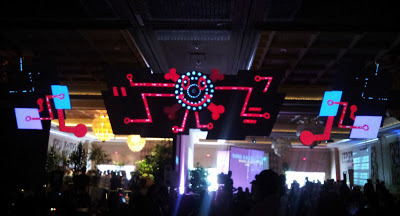 Projector Art in the
Projector Art in theChillout Cafe at DEFCON 21The hacker community is many things. We are curious, smart, knowledgable, subversive, rebellious, libertarian-leaning, technical, opinionated, unorthodox, and l33t.
But most of all l33t. Historically, we felt special, like our merits had won us the right to gloat in glory. We dabbled in technoarts and arcane secrets of circuits and mystical crypto that put us above everyone else. We were the best of the best, we pwned every test, earned the right to beat our chest.
Well, I didn't. Only "real" hackers did, and I wasn't a real hacker. In the DEFCON recap I wrote in 2009, I called myself a "Hacker Groupie". That was bullshit. Because I am every inch a hacker, and always have been, since second grade when I solved the weekly brainteaser without fail. When I begged my parents for a chemistry set. When I used university lasers to run the Michelson-Morely experiment. I'm less technical these days than I ever have been, with my shift away from a thirteen-year IT career in 2010, yet I am still a hacker.
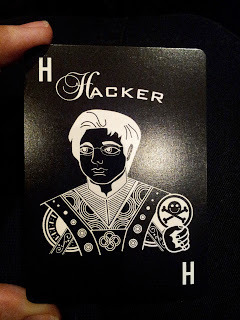 Hax0rz Wild!
Hax0rz Wild!From the DEFCON 21 Playing Card DeckL33tist hacker culture is changing, and it's about damn time. L33tism comes with problems. L33t = elite = elitism, and the price for that is exclusion of alot of really smart people who belong, but are too humble or shy to think of themselves as hackers. For too many wasted years, I was one of those people on the outside looking in, wishing to be part of an exclusive club that I actually had every right to belong to. It took meeting someone who never asks for permission and didn't think I should either. Roland taught me that to belong, I had to shove my way into the circle and simply be who I am. I had to have the rights granted to me by a boyfriend before I could enter.
No, this is not going to be a rant against sexism, though I will address that topic at some point. My exclusion wasn't due to my gender, though that was a factor. I self-excluded because I bought into the chest-thumping and was unwilling to call bullshit and be who I wanted to be. Too many men and women have done the same. I met several of them at DEFCON this year, and I tried to talk them into realizing their potential.
In 2009, at my second DEFCON, I somehow considered myself an outsider, a groupie, a tagalong. This year was my sixth DEFCON. Why did it take so many years to finally stop feeling like a poser? Like any topic worth talking about, it is complex and there are many reasons, but I want to focus on culture here, since I've been around to observe it since 1992.
To be fair, my outlook on hacker culture is just one perspective based on my six DEFCONs, my lifelong-passion for computers, living on BBSes and IRC for a decade, and my career in IT. It's a bit like dipping a thermometer into the water from various beaches over a 20 year period and declaring the global average of the ocean. But that's the nature of commenting on culture. It's hard to get an objective look without running a longitudinal study and relying on survey data from a group of anarchists who want to break every system. No such study exists, so you have my analysis from my point of view in my little corner of geekdom. If you have a different take, please blog about it or comment.
The source of l33tist culture is perfectly understandable. Even the broader geek culture attracts the cocky and self-assured who try to prove their worth by one-upping everyone else through superior skills and knowledge. I've called this the Geek Hierarchy, and it likely comes from a feeling that merit is all we have. We were bullied and rejected by the mainstream as kids, so we learned to distrust people and instead trusted our hobbies. We embraced them fully, clutching at these remnants of our self-esteem, which entirely revolves around the things we're good at doing. So it's no surprise when many of us shove our knowledge and skill in other people's faces. I've done it. Many of my friends have done it. The gloaty tone of voice is part of the geek affect. It's part of our identity.
Hacker culture became a distilled versions of this. After all, hackers were the smartest of the smart. They'd earned the right to snobbery through sheer prowess. Breaking into hacker culture was like getting root. Aside from the need to understand difficult technical concepts, social firewalls included strange language, snarky attitudes, isolationist cliques, and intellectual superiority. There was a sense to outsiders that in order to be accepted, you needed to capture some impressive trophy that all other hackers previously thought impossible.
Worse, when a newbie wanted to break in by doing, and requested help, even Linux help channels met questions with rudely stated RTFM flames. Back then, you learned quickly to never ask questions unless you had already proven yourself l33t. And sometimes that meant giving up too soon or never trying in the first place.
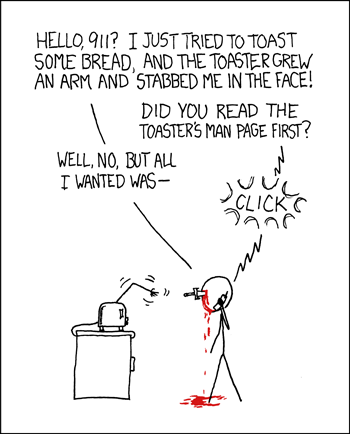 RTFxkcdIn reality, the bar isn't actually set all that high. Had young Luna in 1992 realized this, she might have thought it worthwhile to jump in and start hacking. She might have realized hacking is like anything else -- everyone learns the basics, then the intermediates, and if they really want to go far, they're finally prepared for the advanced stuff. I thought I had to start with the advanced stuff because of the swagger of those who'd already been down that road. I didn't have patience in myself to struggle with the basics because I didn't see the point. And no one was about to help me.
RTFxkcdIn reality, the bar isn't actually set all that high. Had young Luna in 1992 realized this, she might have thought it worthwhile to jump in and start hacking. She might have realized hacking is like anything else -- everyone learns the basics, then the intermediates, and if they really want to go far, they're finally prepared for the advanced stuff. I thought I had to start with the advanced stuff because of the swagger of those who'd already been down that road. I didn't have patience in myself to struggle with the basics because I didn't see the point. And no one was about to help me.I wasn't unique. There was a perception that the bar was set at the top of Mt. Everest. This perception hasn't changed. I've seen through the illusion, but thousands of others haven't. When I got back, I chatted with a friend who was worried DEFCON was too technical to be useful in his job (he works in IT). At the con, I chatted with a girl who had previously been "The Girlfriend", but this year had her own badge. She still didn't consider herself a hacker, even though she's a skilled lockpicker with a mathematics background and an interest in pen testing and crypto. I pointed her to the online tools for learning more crypto and pen testing, and gave her permission to call herself a hacker.
Another guy has been trying to convince his girlfriend to come to DEFCON. She knows how to something-something with DNA (the technical terms escape me, because it's not my field, but I knew what he was talking about), and considers it "easy", and yet he can't get her to go to local biohacking meetings or to DEFCON because she feels she's not good enough. I told him it sounded like she qualified to give a home-biohacking talk at DEFCON, because she knows how to do things I don't, and I'd love for her to teach me how.
This is a problem. There aren't enough qualified employees in the InfoSec world to fill demand. While the numbers have been improving, unemployment is still at 1.95% (as of April 2013). What that means is that when a company wants to hire a hacker, they will have a difficult time filling the position. This is detrimental to the IT industry, as we struggle to secure infrastructure. It is detrimental to employed InfoSec workers, who have to do the work of two or three other people. It is detrimental to our economy that companies can't expand quickly enough, or they are forced to expand with unsecured systems even though they very much would like to secure them. It works against the goals of the white hat hacker community, who wants to evangelize security to the world, but don't have enough bodies to do so.
It's also a problem for more squishy reasons. The hacker community needs an influx of new minds. We need entrepreneurs to build new future companies and non-profits inspired by the hacker ethic, not just in InfoSec, but in biohacking and other fields. We need fresh perspectives and new thinkers.
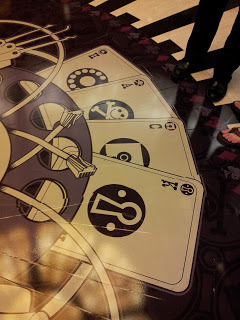 Two new cards, Hacker and Crypto,
Two new cards, Hacker and Crypto,allows for a "HACK" poker hand.Perhaps most importantly is the principle of the thing. Elitism has always been at odds with hacker community ideals like openness, democracy, & equality. These contradictions need to be corrected. In general, hackers want an open society while clinging to privacy and secrecy for themselves. Hackers want open source, yet fail to make participation welcoming and accessible to all. Hackers protest the 1%, yet hoard a wealth of knowledge through snobbish attitudes and indecipherable language, effectively establishing themselves as the intellectual 1%. Hackers want everyone to be included, yet mock newbie mistakes, underestimate women, and require proof of worth before allowing access into exclusive social circles.
DEFCON should be proud of it's meritocratic society. Merit certainly does need to be rewarded, and in the past, bragging rights and social glory was a generous reward indeed. But so is camaraderie and having more friends and brilliant minds in the community. That is the direction we should be headed. And I think we are.
Up until recently, I was blindly unaware of this dynamic. I was a part of the system itself, and therefore, ignorant of it. As an outsider, I played the game by staying outside. As a geek, I gloated along with the rest of the geeks, (though I at least tried to be inclusive and not require proof-of-geekdom). As I slowly embraced my hacker side, I gloated in what little cred I had.
It took the cultural shift at DEFCON this year to set the past in stark relief against the now, and to show where as a culture, we've been wrong. The shift wasn't sudden. It's been building, evolving for years, as DEFCON has grown from a handful of people to 14,000, and as computer ownership spread from the rare nerd to every single household, and now to every purse and pocket. In recent years, the shift accelerated as prominent figures like Lost giving "I'm just like you" and "Be by doing" talks to thousands of hackers.
Hacker Spaces and DIY Maker culture has also influenced hacker culture to include rather than exclude. Makers preach a populist message to the masses: Make it and fix it. You can do it. Anyone can.
But perhaps a larger influence is generational. We GenX were born jaded. As youth, we were characterized by our rebellious nature and distrust of authority. We have since matured and mellowed. And while we still have plenty of distrust in authority, we've learned to work within the system. We've proven ourselves in a hundred other ways, and no longer need the trophies and chest-thumping.
And "kids these days", why aren't they replacing our immaturity with theirs? Because GenY is very different. They come with built-in self-esteems. They may have been bullied, but they don't know what it's like to be excluded from society merely for owning a computer or being into sci-fi (hi Harry Potter and Pokemon). They also tend to trust authority and each other a little more than we did. I believe GenY is less interested in cliquish crowing and more interested in making things with others. (Now get off my lawn.)
The GenZ has something neither GenX or GenY had. They have rootz Asylum (formerly DEFCON Kids). This year, there were hundreds of kids, and again, they found dozens of 0days in real products, including the Samsung Smart TV. The kids had several tracks of programming and a bunch of contests just for them. One was an elaborate capture the flag game. As I watched the Social Engineering CTF, sometimes a trained military sniper stood on a chair and nerfed little kids who ran through the room to deliver a package.
Art in the Chillout Cafe, video.Filmed by Roland who chats with a stranger.
Another welcome change this year was a steep reduction in sexism. What sexism I saw was on the ground-level, committed by individuals, and in one case via sheer ignorance from newbies and not malice. No more presentation slides showing bound women. No more sexist comments by panelists. No more icky behavior supported by Goons. No more bingo cards with "Tits" as a requirement. And no more parties with themes like "Pimp". I'm pretty sure this was all intentional, and I certainly noticed. The waves of these actions are rippling down to the ground level and causing real change. I heard zero talk from women about feeling uncomfortable. That's not to say it didn't exist, but if it did, it was certainly subdued.
I was a little afraid that a less-sexist DEFCON would mean less fun. But nope! Sexual freedom maintained an appropriate level of looseness, and discussions about sex at parties still flowed as liberally as the alcohol. So it seems it is possible to strike a balance between freedom and respect for women. Huzzah!
 Skulls know no class or hate.
Skulls know no class or hate.Every skull is l33t!
(Except for numbskulls. They're dumb.)The one incident worth noting happened when I was standing in the badge line. The group of guys behind me couldn't seem to stop talking about sex and cute chicks and the body parts of cute chicks and the penis-shaped light-saber one of the Goons carried. It seemed to be their only interest. I started to get hungry and realized the only snacks I'd brought were pepperoni sticks and a banana. I remained hungry because there was no way I would be putting either two phallic symbols in my mouth and give them a chance to harass me about it.
Later on, they started talking about other things, and I joined their conversation. I learned they were DEFCON first-timers, and in reality nice guys. That's how most of these things work, and why I'm hesitant to turn into a flaming furious feminist without giving people a chance. The uncomfortable environment they'd created was unintentional, and I'm sure they remain ignorant to this moment about how their conversation might have affected me. There was no point in explaining it to them, since this sort of thing is really hard to convince anyone of in the moment. Instead I blog about it and let culture work its magic.
The influx of DEFCON newbs does create some ground-level cultural awkwardness. Being inclusive of plebes means they won't immediately share the sense of tolerance for fashion that DEFCON has always enjoyed. At a Thursday party during the cusp between Blackhat and DEFCON, Roland received some guff for his clothing choice. If you've ever been to DEFCON (which these guys apparently hadn't), you would quickly realize that the black Utilikilt is a traditional geek uniform. Most guys wear jeans, and those who want to spruce up a little wear kilts. At this party, a couple of guys told Roland his kilt made him look gay and it wouldn't help him pick up chix. Roland told them he wasn't dressing for them and was doing just fine with the womens, kthanksbai.
Given the prominence of the Queercon party and the fact that many of the Goons are from west coast cities and tend to be socially liberal and that DEFCON in general has become extremely LGBT-friendly, I doubt their attitude lasted long into the weekend. Girls like me happen to think kilts are dashing. I'd definitely hit that, but no so much the guys who concern-troll any sort of gayness.
The Wall of Sheep was almost empty this year. For those who don't know, DEFCON NOC traditionally packet-sniffs for passwords going over the network in the clear. They post pwned pws on a giant screen called the Wall of Sheep. It's a very good thing the number of pwnable pws is going down. In part, credit goes to DEFCON having two wifi networks, one being (more or less) secure. But also heartening is that more internet services are forcing SSL for logins, which is a beautiful thing. In 2009, my Twitter account got owned, because Twitter didn't use SSL at the time. This time, nearly all the ten or so sheeped accounts were unencrypted POP3 and IMAP.
 DEFCON 21 Playing Card.
DEFCON 21 Playing Card.I mean, badge.
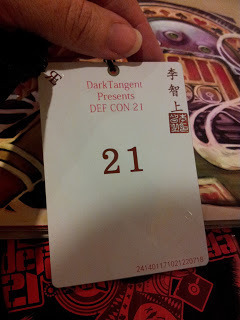 backThe badge, as usual, was very cool. ~54 unique badges represented playing cards. The suits were replaced by the three DEFCON symbols (smile & crossbones, diskette, rotary dial), plus a new one added this year: a keyhole. They were printed on circuit boards (PCBs) but with no evident electronics. Part of the badge puzzle involved using a multimeter to trace internal wiring. The Uber Badge (given only to those who have won DEFCON's most challenging contests) included a watch mechanism designed and hand-built by Lost. He chose that design to learn a few of the skills his grandfather must have known as a watchmaker.
backThe badge, as usual, was very cool. ~54 unique badges represented playing cards. The suits were replaced by the three DEFCON symbols (smile & crossbones, diskette, rotary dial), plus a new one added this year: a keyhole. They were printed on circuit boards (PCBs) but with no evident electronics. Part of the badge puzzle involved using a multimeter to trace internal wiring. The Uber Badge (given only to those who have won DEFCON's most challenging contests) included a watch mechanism designed and hand-built by Lost. He chose that design to learn a few of the skills his grandfather must have known as a watchmaker.  Uber Duber Badge!Badges will alternate yearly, electronic and non-electronic. Next year we can expect batteries and blinkies again.
Uber Duber Badge!Badges will alternate yearly, electronic and non-electronic. Next year we can expect batteries and blinkies again. 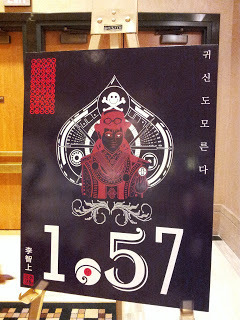 Crypto Sign is part of the DEFCON 21 Badge Puzzle.
Crypto Sign is part of the DEFCON 21 Badge Puzzle.I still don't know what it means!I didn't work on the puzzle at all this year, other than taking a few notes. I was far too caught up in attending talks and other DEFCON activities. I did recognize that one of the rotunda decals looked like a giant clock. People in the hall around me didn't seem to realize this. It was set to 7:50:15. That's the only thing I solved. Lots of other people participated this year, though, and I think there was far more in-person socializing, since a special room had been designated for participants to network.
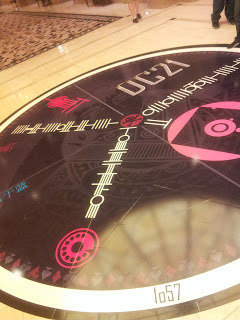 See? It's clearly a clock!My experience of attending talks was colored slightly by my unpopular opinion of the Edward Snowden and NSA stories which were prominent this year.
See? It's clearly a clock!My experience of attending talks was colored slightly by my unpopular opinion of the Edward Snowden and NSA stories which were prominent this year. I proudly will keep this
and hold it ironically close to my heart.I don't want to get too far into my opinion, since that would be its own post. Short version: I think Snowden is an idiot and that Greenwald is one of the most irresponsible journalists this side of WorldNetDaily.
The NSA is in need of criticism to be sure, but what Greenwald presented is not what the NSA is actually doing and not what the leaked slides show. Prism and Boundless Informant and XKeyScore have been debunked, and here, and here, and many elsewheres. At Blackhat, General Alexander confirmed the conjecture made by tech-journal debunkers. The cellphone metadata story has more meat to it, though it was also exaggerated to some extent. I wish that's what the discussion is centered around, because I like discussing facts, not made up stuff that should be on Snopes.
I was greatly saddened by the fact that DEFCON attendees, speakers, and Goons seemed to be buying the sensationalist narrative. The technical community should know better. Of all people, hackers should be able to reality check Snowden/Greenwald's claims and see right through it. I did. Unfortunately, the story hits hacker-community fears related to government surveillance and loss of privacy rights and a historical mistrust of government. The cognitive consonance is just too delicious to let go. Just goes to show we are all vulnerable to cognitive bias attack-vectors, even the most brilliant of us.
 The NSA inspires a lot of tinfoil hats at DEFCON 21!
The NSA inspires a lot of tinfoil hats at DEFCON 21!
 Tinfoil Tophat
Tinfoil Tophat Deflecting government brain scanners in style!So many of the talks I attended assumed everything Snowwald/Greenden said was true. Some of the speakers seemed to know the reality, but made no attempt to clarify or discuss the debunkings, so everything they said still went through the Snowwald filter of OMG THE GOV CAN SEE ALL MY EMAILZ FROM FIVE YEARZ AGO!!11oneeleven.
I spent alot of the talks squirming in my seat and madly tweeting opinions (pontifitweeting?). I will spare you since you can read it on Twitter and I don't have room here for a more detailed explanation of my controversial opinion.
I will specifically call out the ACLU talk on the subject, since they ought to know better and did nothing to debunk the myths. The way they phrased things, they seemed to know the truth of it, but anyone who hasn't seen the debunks would have had their bias confirmed by everything the ACLU said. So it was a bit dishonest. But I'm sure they made more money from it.
The one argument I get regularly is the "Ends justify the means" rationale. It goes something like this: No one listens to privacy advocates, and there is still bad stuff going on, even if it's not the way Snowdald says it is, so this non-issue gives attention to the topic in general, therefore the story is good even if it's wrong. I counter-reason that all arguments should be based in fact so they cannot be easily dismantled. Fighting against imaginary dragons does nothing to defeat real dragons.
That said, the EFF did bring in ~$100,000 this year at DEFCON, so in that sense, maybe the Greenwden hoax has an upside.
Another happy thing about the EFF is they seem to be shifting their stance on the "What to do about privacy" problem. They seem to be promoting more reciprocal transparency side, which is to say, the only way to combat ubiquitous government cameras is to focus on defending the citizen's right to point cameras back at the government. Let the Feds look, as long as we know what they're looking at and why. It warms my heart, because I've hesitated to support the EFF while they uselessly spin their wheels trying to keep the government from snooping.
I attended a talk by Mudge, an old school hacker whose been working for DARPA for the last three years. He told a number of interesting anecdotes centered around a theme about communication between the government and hackers. We come from two very different cultures, and in order to communicate between them, everyone needs to consider the language we're using. Feds need to act like diplomats entering an advanced alien civilization, and hackers need to realize that Feds are focused far more on doing their jobs than on how to fuck with citizens and hackers.
He suggested that in order to be trusted, the Feds need to give back to the hacker community. They need to show up at hacker cons and give technical talks to share things they know. And they need to realize hacker = researcher, not hacker = criminal.
He also pointed out that between private companies and the government, no one is incentivized to improve security. Defense contractors actually get financially rewarded for letting secrets leak, because our national strategic advantage is in being the most technologically advanced. When secrets leak, contractors get new contracts to produce new tech.
To hackers, he implored us to reward the government for good behavior. When a department or elected individual does something awesome, praise them. Help them. Encourage them. Offer assistance.
I also attended the opening talk and closing ceremonies, as well as Lost's talk on Decrypting DEFCON. Aside from dropping badge clues and describing the badge design process, Lost again evangelized on a theme of "doing". This time the underlying point was, "You'll be a better hacker if you understand the technology and knowledge that underlies the high-level stuff you're doing." To developers, he encouraged learning binary, processor logic, and assembly. The best quote I pulled from this talk is: "Technology is nothing more than learning to communicate." Which is a bit like I used to say in my job -- writing is programming where humans are the hardware. These fields have so much in common, which is why, as a writer, I still feel confident in saying I'm a hacker. Especially since I'm currently writing about mind exploits.
I also attended a thought-provoking and balanced talk on white hat hacker ethics by Alex Stamos, and an emotionally difficult talk by Amber Baldet on suicide risk assessment and intervention. I caught the tail end of a village talk on tamper evident basics, if you've ever wanted to open an envelope or void a warranty without getting caught.
I spent a little bit of time watching people peel back "VOID" tape in the Tamper Evident Village, though I didn't stop long enough to do it myself.
The villages may be another part of why DEFCON is growing to feel more inclusive. There were four this year, the Lockpick, Tamper Evident, Wireless, and Hardware Village. Tables were strewn with tools and materials for practicing the craft, with helpful experts available to teach and demonstrate. The villages permit a hands-on experience, and since they cover the rudimentary basics, and say "Yes, everyone can pick a lock or solder a circuit", they reveal that the price for entry to learning hacking is actually quite low. Everyone starts somewhere, and it's stated clearly that no one will to judge you for not knowing anything or asking newbie questions.
This year, Roland and I challenged one another to submit talks next year. We're already busy working on our ideas. I know exactly what I'd like to speak on: Reverse Engineering Mind Control, using Mormonism as a case study. I bounced the idea off a couple of the people who run Skytalks, and they like it. While I love hacking tech, I've always been more comfortable with squishy topics, like culture, religion, and psychology. Which doesn't mean I'm good at people -- quite the opposite. I just think people are the most interesting type of machine to analyze.
Last year I said DEFCON was the best EVER. And this year, I would say I was the best Luna ever at DEFCON. Part of this of course is that I'm always self-improving. But the biggest change this year is that I was on an SSRI for anxiety. (Say it with me, Selective Serotonin Reuptake Inhibitor. What a fun phrase!)
I couldn't ignore the change. My social anxiety was gone and my inhibitions towards talking to people nearly vanished. No more internal feedback loops of self-conscious second guessing. I just opened my mouth and let words pour forth not worrying too much if I'd say the wrong thing or talk to the wrong people or monolog too long. My bravery was greatly rewarded because people actually engaged with me. I met so many people and had so many great conversations. I stood up for myself and others when needed and didn't worry I might be hurting someone else's feelings.
For years I've tried to talk myself into not being afraid, but talking never quite did it. Medication did. So hacking-the-Luna-through-biochemistry project was a huge success. Moreover I felt more aware during conversations, like the world of humans had slowed down just enough for me to understand what was going on and think well enough to respond. Any awkwardness I felt was a mild discomfort, not the mind-scorching panic it would have been a month ago. My Aspergers diagnosis has also given me an understanding of the many causes of my brokenness so I can accept those things about myself and feel a little more l33t because of it. It wasn't a panacea. I still have old habits and hesitations. But I now have hopes my attempts to rid myself of them will go smoothly.
I had the wonderful opportunity to meet Bernie Mojzes, editor at Unlikely Story, where I was published last year in the Journal of Unlikely Entomology. There are currently calls for stories in the Journal of Unlikely Cryptography, so if any DEFCON writers are reading this, make something and go submit it. I plan to take my own advice here.
The parties were also great, as usual. We didn't party too hard this year. Queercon was good but it will never recapture the intimacy and fun spirit and wild dancing it had at the much smaller room in the Skyboxes at the Riv. We found a small private party offsite at The Palms, hosted by (I think?) PasswordCon. It was in a suite that looked strangely like the one in Four Rooms where Quinten Tarantino chops off a guy's finger. No fingers were lost, just good conversations were had.
The Freakshow was sadly canceled due to the death of Barnaby Jack, who worked for IOActive.
DEFCON threw a poolside party instead, and we were treated to some sick rhymes by Dualcore, and the impressive medley of musical madness played by the Sex Havers who were having way too much contagious fun to not enjoy every second of it. I gotta ask Dualcore -- why aren't you on Spotify, man?
I missed watching DEFCON: The Documentary at the con, because the timing was awkward. But I'm looking forward to torrenting it and pressing play. So many thanks to Jason Scott and DEFCON for making this film.
So many other things happened, which I will remember after clicking "Publish". If you'd like these sorts of things to happen to you, head on down to DEFCON next year. The only requirement is that you be interested in related topics like information security, national security, privacy, data, locks, cryptography, solder, robots, cyberwarfare, or social engineering. That's all it takes to be smart enough. Join us and learn. I give you permission.
Past posts about DEFCON:
Defcon Recap 2009: Adventures of a Hacker Groupie
Culture War at Defcon 17 (by Roland Lindsey)
Defcon 19 Badge Contest: In General
Defcon 19 Badge Contest: In Specific
DEFCON 20: Coming of Age
DEFCON 20: The Badge Contest
Published on August 08, 2013 21:22
August 6, 2013
Touch of Tides - Crossed Genres
I am exceptionally excited to announce that my story, Touch of Tides, was just published in Crossed Genres magazine. Please check it out, and while you're there, read the other two stories by DeAnna Knippling and Michael Ben Silva III.
In Touch of Tides, a xenobiologist explores the oceans of Europa. Mara has synesthesia, meaning her senses are crossed -- what she feels on her skin she also sees with her eyes. Her passion is studying Europan life, hands-on. Until she finds something dangerous.
Here are the opening paragraphs:
I am particularly proud of this one, because it is my first hard science fiction story. I spent a lot of time researching, asking experts, sketching, and even doing math, to make sure the details of the story were realistic. Science is very central to the plot, and all of this could actually happen. (Meaning all my other stories are completely impossible, I guess.) It also marks my first pro-rate sale.
I wrote it for you. Please enjoy reading it.
In Touch of Tides, a xenobiologist explores the oceans of Europa. Mara has synesthesia, meaning her senses are crossed -- what she feels on her skin she also sees with her eyes. Her passion is studying Europan life, hands-on. Until she finds something dangerous.
Here are the opening paragraphs:
I swim with no light, artificial or natural. A solid ice shell, seven kilometers thick, floats above me in this single ocean that covers the entire moon of Europa. All I can hear is liquid gurgling in my ears and I taste residual salt that leaks in around my gill breather.My name is Mara. I am naked except for my equipment belt and a molecule-thin coating of nanoscale to protect me from the chill. The other biologists at my barnacle wear full wetsuits when they dive, relying on augmented reality. My gill could report water conditions, geolocation data, and radar sight, if I let it distract me.I prefer to let the touch-colors lead...- See more at Crossed Genres.Crossed Genres also gave me the spotlight interview, in which I answer questions about Touch of Tides, synesthesia, autism, and more.
I am particularly proud of this one, because it is my first hard science fiction story. I spent a lot of time researching, asking experts, sketching, and even doing math, to make sure the details of the story were realistic. Science is very central to the plot, and all of this could actually happen. (Meaning all my other stories are completely impossible, I guess.) It also marks my first pro-rate sale.
I wrote it for you. Please enjoy reading it.
Published on August 06, 2013 15:27
July 22, 2013
Mind Control 101: The Basics
 Keep trying, buddy.We have explored what thought reform is not in Mind Control 101: Myths of Brainwashing. But what is it? What force can shut down people's minds and get them to do things they otherwise would never consent to?
Keep trying, buddy.We have explored what thought reform is not in Mind Control 101: Myths of Brainwashing. But what is it? What force can shut down people's minds and get them to do things they otherwise would never consent to?Cult Conversion Walkthrough (Storytime!)
No one is immune from mind control. And contrariwise, mind control doesn't always work. It takes the right combination of factors; specifically trust, common ideals, and receptivity.
Cults are a good place to study mind control because the changes they effect on people's lives are extremely obvious.
Pretend for a moment you are having a difficult time in your life: a recent tragedy or major transition. Maybe you've just gone through divorce, lost a loved one, you've moved to a new town, or have recently been fired. You're feeling alone, scared, depressed, ashamed, or desperate.
One day you encounter someone who is nice to you. Either it's a friend or associate, or even a complete stranger. Maybe it is someone handing out pamphlets, or speaking to a crowd. Who ever it is, he has kind eyes, and you feel a little better when you're around him. He also seems to share your values. Maybe he wants to help the poor, or he talks about the power of love, or God, or protecting animals. Imagine your greatest value, and he also shares that value with a level of passion you admire.
He invites you to a meeting or a party. Once there, you find a room full of people who say nice things to you, lifting your spirits. They are involved in a cause you wholeheartedly endorse. They take care of the sick or collect food for the poor, or educate kids about capitalism, or share the message of God to the world.
Being around these people makes you feel good. You feel as if you belong. You quickly forget your personal problems and begin spending more time with this group, working towards making the world a better place.
They have won your trust.
Now you are fairly receptive to what the leader may tell you. He will use this time to win more of your trust and make you more receptive. If you've had niggling doubts about your new friends or their beliefs, they are easily explained away.
Slowly, you are introduced to new ideas you may not have accepted at first. Over time, more is required of you. More money, more time, more sacrifices. Your behavior is slowly restricted. Maybe you are required to dress a special way, eat or not eat certain foods, show up at a certain number of meetings, be so busy you don't get proper sleep or nutrition.
Now the grip tightens. The leader teaches you doctrines to instill phobias about the outside world. You learn that your group has many enemies to fear. Those enemies are not to be listened to because you will be unable to resist when they try to lead you away from the love of the group. You are given thought-terminating cliches, phrases or words that help you easily dismiss criticism. You are elite, one of the chosen to help save the world from political error, or one of the blessed of God. Your very language is altered, as your words become "loaded". This prevents you from properly thinking about certain concepts, and from properly communicating with people outside the group. You have become dependent upon the group for your emotional well-being, and you are possibly even physically or financially dependent. You are isolated, if not physically, then mentally, because there are many sources of information you are taught to distrust.
When you think about the group and its teachings, you are filled with a sense of euphoria. Thinking about outsiders or criticisms makes you feel anger or confusion. The thought of leaving the group or "switching sides" makes you feel guilty, ashamed, or afraid. If something is not going as promised, you blame yourself, not the group. There are no gray areas left in your world view -- things are either good or evil, left or right, pure or tainted, full of life or death.
You now automatically reject any criticism, no matter how valid it is. You reject any fact that goes contrary to your beliefs, because your beliefs have become more important than reality. Certain words are now triggers that cause you to reject specific ideas before you even have a chance to hear them out.
You feel yourself to be perfectly rational, far more enlightened or intelligent than those with opposing views. Yet instead, your brain has been crippled from the mind viruses you voluntarily made part of you.
What Just Happened?
Here is the process:
 Jim Jones seemed like a really nice guy...
Jim Jones seemed like a really nice guy...till he lead 900 people to voluntarily drink cyanide-laced Koolaid.1. Win Trust
Sometimes people just seem really trustworthy because they are kind, charismatic, or because everyone else also trusts and loves them.
2. Appeal to ideals, goals, beliefs
You probably feel very passionate about your beliefs, so it's easy to involve you on this level. It's also another way to win trust.
3. Create a state of emotions and receptivity
Once your defenses are down, there are many techniques for turning off your critical mind and putting you in an emotional state. There you are more willing to believe anything. Emotions may include fear, anger, idealistic euphoria, camaraderie, love, or any other strong feeling.
4. Slowly introduce new ideas and restrictions on thoughts and/or behavior
These are ideas or restrictions that dehumanize opponents, instill fears of the enemy, introduce thought-terminating cliches, create loaded words, give you feelings of elitism or of being special, and so on. This is the point at which you become tangled in the lie and become a perpetuator of that lie using the same techniques used against you.
It's How We're Wired
You don't have to be a full member of a suicide cult to be manipulated. Mind control techniques are used every day: in the news, in commercials, in political speeches, on billboards, on the radio, in forwarded emails, and in conversations. Even abusive relationships practice the same manipulative methods.
We are always being asked to trust someone who wants to tell us who to fear, when to shut down our brains, who's side to never respect, which facts are skewed and which are true. We are asked to immediately reject everything we disagree with and accept everything we agree with without question.
 There used to be a lot more bowing and scraping.
There used to be a lot more bowing and scraping. Those prone to backtalk were usually beheaded.This process seems to be the rule rather than the exception. Our society now values free-thought, intellectual honesty, and persuasion through facts and reason, but this has not always been so. For most of history, mankind has blindly followed authority. Arguably, civilization might not have survived this far without these traits. Rebellious, contrarian individuals in those cultures didn't survive long. Our minds seem prone to accept deceptive persuasive processes that bypass critical thinking. The tendency towards free thought was literally bred out of us.
It's hard work to employ honest persuasion. We have to risk the discomfort of cognitive dissonance, which seems ever present in the harsh light of honesty. Our very brain chemicals make us unhappy when we critically question cherished beliefs.
Conversely, coercive persuasion is a much more comfortable process, but it always involves deception. Typically such persuaders believe the lies they tell. Followers of these distortions are just repeating the program, including mind control methods, they have been taught.
Who Can I Trust?
Ironically, you are actually more likely to be brainwashed by those you least expect to be capable. These will be people you fully trust, people with similar values and goals as you, someone who is on your side.
You cannot be brainwashed by someone you distrust, unless you are physically held hostage by them. This means if you hate liberals, you can't be brainwashed by liberals. If you hate Republicans, you can't be brainwashed by Republicans. If you're God-fearing, you can never be brainwashed by atheists.
Think about that for a moment. The groups you might suspect most capable of mystically infecting your mind with deceit are actually the most incapable. Those you believe to be benevolent are those most capable of deceiving you, if they so choose.
There are members of every camp, every ideology, every school of thought who have used the powers of deceptive thought reform. Out there, somewhere, is a controlling group or belief system that is likely to appeal to you, that has the power to hook you and reel you in. It's even possible, likely in fact, that it's already happened to you to one degree or another.
When we're born, we are about as helpless and dependent as we ever will be. We start out being programmed by our parents. In most ways, this is a good thing, because this is how we learn basic survival, how to behave in society, and how we gain culture and language. We learn useful values and principles. But we also come to blindly accept many untruths and thought patterns that keep us from critically thinking or asking questions when maybe we should.
 I know it's true. I saw it on TV.We also become susceptible when the world itself becomes terrifying. There are many things to fear: War, terrorism, disease, crime, violence, immorality, anarchy, socialism, racism, tyranny, oppression, and so on. Many will stand on podiums or behind TV screens and amplify those fears, and then promise to ease them if we but trust. This isn't much different from when a cult targets someone who has had a recent loss in their lives.
I know it's true. I saw it on TV.We also become susceptible when the world itself becomes terrifying. There are many things to fear: War, terrorism, disease, crime, violence, immorality, anarchy, socialism, racism, tyranny, oppression, and so on. Many will stand on podiums or behind TV screens and amplify those fears, and then promise to ease them if we but trust. This isn't much different from when a cult targets someone who has had a recent loss in their lives.I have been brainwashed about some things. I still am, to some degree, even though I am aware of these techniques and do everything I can to spot them. But when someone is "on my side", saying things I already tend to agree with, I'm just a little susceptible. And so are you.
Ultimately, you can only trust yourself. That is why questioning and critical thinking are so important. If you can become comfortable with cognitive dissonance and ok with being wrong, your mind becomes agile. If you learn good research techniques, you make yourself the ultimate authority. If you teach yourself rational habits and learn about the difference between good logic and fallacy, you can give yourself a built-in bullshit detector. If you study mind control techniques, you shield yourself with awareness to disarm the lies. Trust yourself and become the guardian of your own mind.
In future Mind Control 101 posts, I will explore each of the known mind control techniques in detail, describing exactly how they work to entrap us. I will also explore cognitive theories that explain why and how our brains cling so desperately to what we already believe, easily rejecting conflicting data.
Hopefully, armed with this knowledge, you can be that much more immune to mind control. Because no one else can do it for you.
Published on July 22, 2013 13:54
June 18, 2013
Iceland Fire: A Week With No Night: Part Two
Please read Part 1 of my Icelandic adventure.
Before I left, I raved about how excited I was to attend Elf School.
 Álfaskólinn, 2nd floor.The school was located in a mixed-zone industrial/commercial park, but it also seemed like an apartment. The place was piled high with books and troll figures and gnome statues. A small reception desk remained unmanned, and I called out until his wife appeared, and then summoned Magnús from the maze. He looked to be out of a fairy lore himself, a giant of a man, tall and round, with a white beard and a bright red shirt.
Álfaskólinn, 2nd floor.The school was located in a mixed-zone industrial/commercial park, but it also seemed like an apartment. The place was piled high with books and troll figures and gnome statues. A small reception desk remained unmanned, and I called out until his wife appeared, and then summoned Magnús from the maze. He looked to be out of a fairy lore himself, a giant of a man, tall and round, with a white beard and a bright red shirt.
With regrets and several hugs, he informed me that since I was the only attendee, he would not be holding elf school that day. If I could wait until Tuesday when a big group was scheduled to come through? But no, I would be back in the states by Tuesday.
To be honest, I had mixed feelings about missing elf school. I was in a fair amount of pain due to a minor operation I had just undergone at the hospital (more on that later), so was a bit nervous about trying to make it through four hours of lessons without passing out. He gave me the text book for free, and promised to send an electronic copy of the new edition when it comes out. So I got another rare folklore book to add to my collection, which made me happy enough. Half of it is in German, the other half in English, and I get the sense that the German stories are not the same as the English ones.
I've got a couple of random pictures I'd like to go through. First, viking hats. They were everywhere.
 On a backpack......on a troll.However, in spite of our long searching, we never once found a viking hat that would fit Ryuk. I guess we'll have to make one.
On a backpack......on a troll.However, in spite of our long searching, we never once found a viking hat that would fit Ryuk. I guess we'll have to make one.
Next, weird art. Ha, I'll bet you thought art class was over.
 In a coffee shop in Reykjavik.
In a coffee shop in Reykjavik.
 In the restaurant near Geysir.And then, just because I love signs so much, here's some product packaging:
In the restaurant near Geysir.And then, just because I love signs so much, here's some product packaging:
 Bonus Sexa! Já!Speaking of sex...
Bonus Sexa! Já!Speaking of sex...

So let's talk about puffin, shall we? Yes, puffin is on the menu.

What's a puffin, you might ask? This little guy is a puffin:
 "Pwease don't eat me..."Don't let his sad eyes fool you. Before you judge me, remember, puffins themselves are ferocious carnivores.
"Pwease don't eat me..."Don't let his sad eyes fool you. Before you judge me, remember, puffins themselves are ferocious carnivores.
 "I'm gonna eat ALL the cute fishies! RAWR!"
"I'm gonna eat ALL the cute fishies! RAWR!"
OM NOM NOM!They do not weep over the tiny adorable fish they consume. It's the circle of life, and someday, something else is likely to eat me, no matter how cute I am.
And you are not one to point fingers. Unless you're a vegetarian, you've likely eaten one of these recently:
 Original image from Crack Two.
Original image from Crack Two.
Warning: Do not view before dinner. Or breakfast.It was either the puffin, or the whale. I couldn't quite come to terms with eating a whale... Plus I wasn't that hungry.
The appetizer course was smoked puffin, which tasted like salmon, only softer, more purple, and OMG IT WAS SO GOOD. Puffin, I love you.

The main course tasted totally different... a bit like mild liver. I happen to love liver, so it all worked out.

So the bars in Iceland, on the weekend, are open all the time. That's because in Iceland, time has no meaning. They also let people carry their beer bottles from bar to bar, and I even saw a guy take his glass from one establishment. He had the courtesy to look slightly guilty as he did so.
One thing we quickly learned is that if it's late-night, say 10pm, and you're hungry, YOU WILL NOT FIND FOOD IN REYKJAVIK. They've never heard of bar food, and if you walk the streets looking for a restaurant still serving food, they will look at you funny. We did discover, thanks to some friends of friends we met up with, that after 11pm or so, the food trucks show up in this one part of town, and then it's waffles and kebabs till sunrise.
Except, the sun doesn't rise. We've been over that.
 Viking Kebab!
Viking Kebab!
 Bacon Kebab!
Bacon Kebab!
 Picture taken at 12:50am. Still sunny.
Picture taken at 12:50am. Still sunny.
Location: The "Luna Bar" aka the Mánabar The smoking room at some other bar. Taken at 3:16amA few bars of note.
The smoking room at some other bar. Taken at 3:16amA few bars of note.
Boston was on the second floor, darkly lit, with gold baroque wallpaper and tiny chandeliers. The music ran the range of electronic tunes with that particular Icelandic sound we came to love via the car radio. Not necessarily Icelandic music, but a certain choice of style that was pretty awesome. Iceland has several music festivals, and it seems like that sort of thing might be worth visiting for.
The DJ was a woman, one of my first realizations that Iceland is subtlety less sexist than the states. It's these little things that told me Icelanders actually believe women are just as capable as men. (A guy we were hanging out with, who has done work for the Pirate Party campaign, BTW, told us the problem with Icelandic women is they're too emotionally detached and unwilling to commit.)
 Boston, right next door to Dillon.Then there's the place we called the Luna Bar, even though I think its real name was Mánabar. The inside was space-themed, with stars on the ceiling. The bartender looked a cool version of Maurice Moss from the IT Crowd. That he turned to me first to hand me the change, when Roland was the one who gave him the money, was another one of those subtle little outward differences in the assumptions about women.
Boston, right next door to Dillon.Then there's the place we called the Luna Bar, even though I think its real name was Mánabar. The inside was space-themed, with stars on the ceiling. The bartender looked a cool version of Maurice Moss from the IT Crowd. That he turned to me first to hand me the change, when Roland was the one who gave him the money, was another one of those subtle little outward differences in the assumptions about women.
 Lookit! It's my bar!Another bar of note is the Lebowski Bar, named after the movie. I don't know the story of how this place got created in Iceland. I'm guessing a couple of guys smoking joints turned to each other and said, "Þú veist hvað væri kúl? [You know what would be cool?]"
Lookit! It's my bar!Another bar of note is the Lebowski Bar, named after the movie. I don't know the story of how this place got created in Iceland. I'm guessing a couple of guys smoking joints turned to each other and said, "Þú veist hvað væri kúl? [You know what would be cool?]"
Or perhaps it's the wacky sweater the Dude wears throughout the film, which, while not traditional, does distantly resemble a lopapeysa Icelandic sweater.
 The Dude abides.
The Dude abides.
 Yes, this is a White Russian menu.I might have been up for more partying if not for a bit of a medical issue that appeared just days before our flight, which I tried but was unable to resolve before leaving. I got on the plane, hoping it would improve, but it didn't, so I got to experience first hand what it's like to seek medical treatment while travelling. If you're curious about my experience, I've hidden it behind this TMI tag. Click to read. I try not to be too squicky or go into too much detail...
Yes, this is a White Russian menu.I might have been up for more partying if not for a bit of a medical issue that appeared just days before our flight, which I tried but was unable to resolve before leaving. I got on the plane, hoping it would improve, but it didn't, so I got to experience first hand what it's like to seek medical treatment while travelling. If you're curious about my experience, I've hidden it behind this TMI tag. Click to read. I try not to be too squicky or go into too much detail...
TMI: click to expand
Briefly: I got a Bartholin's cyst. I had one before, many years ago, and it went away with a minor surgery. Unlike that one, this one was terribly painful. My local doctor wasn't able to do much for it with such short notice. So off I went. It added a considerable amount of discomfort and stress to the trip.
After it continued to get worse, I looked up a local clinic. Iceland has socialized medicine (and they do house calls!) but unlike France and the UK, they charge a fee for non-Icelandic people. People from the EU get a massive discount, but being from the US, medical care must always cost more. For me it was 6200ISK up front (roughly $51), and they told me they wouldn't change any extra unless they had to run tests.
Not bad.
I got seen within an hour. That was me showing up, saying I needed treatment, setting an appointment, and coming back, one hour. (Compared to state-side, I was lucky to get in before my trip because they had a last-minute cancellation, and I had to see the nurse practitioner, not the doctor.) We were able to walk around the neighborhood in that hour, and got coffee from a great little place called Stofan.
The doctor himself called me from the waiting room. He was no-nonsense. They all were. I told him my problem, he stared wordlessly at the computer for awhile, then left to grab another doctor for advice. They led me to her office, wherein they had me disrobe while they just stood there, and then she made a small incision to drain the cyst. With no anesthetic. Honestly, with how much it had been hurting, I was mentally prepped for it, and just wanted relief. When that didn't work as well as they'd hoped, she called the gynecologist for advice. From the next room, with the door open.
Thankfully it was all in Icelandic. However, both doctors had this frightening expression, a sharp inhalation of breath, like we do when we're negatively surprised or shocked. It was a bit disconcerting, them speaking Icelandic about my condition while I bled from a hastily-made cut, but I calmed myself by thinking it couldn't be as bad as it sounded. And yeah, it turned out doctors in Iceland make that sound when they mean "Yes," or "Ah-ha.." or "I see."
The doctor told me the gynecologist at the hospital could put in a Word catheter, the same kind of surgery I'd had years ago, on the other side, that fixed it right up. I was willing to agree to anything at this point. I just wanted to enjoy the rest of my trip.
They had me go to the hospital right after lunch. The only reason I needed to wait that long is because they'd had an unusually busy morning. I waited in the waiting room about 30 minutes, and then they had me on a table, and out again, in less than 15 minutes. Again, no bedside manner, no private room for undressing, no attempt to hide the gory details from me other than the language barrier. At least I got a local anesthetic that time.
(Now you can see why I was sort of relieved to miss elf school, which was scheduled to start just one hour later. If it hadn't been for my strong need for rest, I would have put up more of a protest and talked him into holding class just for me.)
Overall, they did a great job. I'm healing up just fine. Though the whole process was rough around the edges, I appreciated their openness and honesty, and the immediate treatment. Since my insurance sucks, it probably came out cheaper than I would have paid here... just under $400 for the whole thing. And, in the states, the catheter stays in for 4-6 weeks, and then you have to have them remove it. The way the Icelandic doctor did it, it fell out on its own just this morning.
Now let's leave the city for Iceland's majestic natural beauty.
The famous Blue Lagoon is near the airport, about a half hour southwest of Reykjavik. It was really hard to tell what time it was, since the sun was still just as bright (gray, overcast) at 10pm as it was at 10am. We got there a little late to pay the tourist-mine prices for a soak in the water, but...
 Please take a moment to memorize this color.You can see the water of the blue lagoon, the part they don't let you swim in, from the highway. Set in the grey, volcanic-bleak landscape, the color pops in the eye in a way it can't in a photo. It's a bright baby blue, the color of the bantha milk that Luke drank on Tatooine. It's a robin's egg that goes on and on, in vast pools surrounded by black basalt and framed in white minerals that coat the rocks beneath the surface. The air smells of sulfur, and in the distance, plumes of steam rise from one of Iceland's many geothermal plants.
Please take a moment to memorize this color.You can see the water of the blue lagoon, the part they don't let you swim in, from the highway. Set in the grey, volcanic-bleak landscape, the color pops in the eye in a way it can't in a photo. It's a bright baby blue, the color of the bantha milk that Luke drank on Tatooine. It's a robin's egg that goes on and on, in vast pools surrounded by black basalt and framed in white minerals that coat the rocks beneath the surface. The air smells of sulfur, and in the distance, plumes of steam rise from one of Iceland's many geothermal plants.
 Panorama. Feel free to zoom.
Panorama. Feel free to zoom.







That's about all I have to say about it. I can't vouch for paying to go in. There are natural hot springs all over the country, as well as naturally-heated public pools. I read that it's cheaper and better to go somewhere else.
 The mysterious path leading to the Blue Lagoon.We took a day to drive a bit north and inland, to Þingvellir national park and the surrounding attractions. (Pronounced "Thingvellir", not "Ping".). Our main goals were to see Geysir and Gullfoss, but what we found at Þingvellir was even more amazing: History. From 894AD. You can read more about it on Wikipedia, but briefly, Þingvellir is another name for the Althing, Iceland's folkmoot or "thing". A "thing" or a "moot" was a gathering of tribes wherein peace was guaranteed and political matters were decided. It's where our modern terms "thing" and "tithing" come from, as well as the roots of western law and democracy. Iceland seems to have done this bigger and better than England and Scandinavia.
The mysterious path leading to the Blue Lagoon.We took a day to drive a bit north and inland, to Þingvellir national park and the surrounding attractions. (Pronounced "Thingvellir", not "Ping".). Our main goals were to see Geysir and Gullfoss, but what we found at Þingvellir was even more amazing: History. From 894AD. You can read more about it on Wikipedia, but briefly, Þingvellir is another name for the Althing, Iceland's folkmoot or "thing". A "thing" or a "moot" was a gathering of tribes wherein peace was guaranteed and political matters were decided. It's where our modern terms "thing" and "tithing" come from, as well as the roots of western law and democracy. Iceland seems to have done this bigger and better than England and Scandinavia.
Given my previous writing research into dark ages political systems, I was super-delighted by this surprise. If I'd been feeling up to it, I would have run to all the monuments and historical markers all over the valley. As it was I hobbled about the best I could and still managed to see alot. Have some pics:


The Althing took place in that valley. The bluff we're standing on is made of basalt, and a large natural crevice cradles the path that leads down. Here's the start of the crevice's humble beginnings, and the path:


At the bottom is another crevice, parallel to this one.




And then of course I have to take a picture of the only sign carved into the rock. I have no idea what it means, but that curly-cue "c" symbol looks really familiar.

So let's talk about cairns. The first thing I noticed driving to Reykjavik from the airport, is that out in the middle of the vast lava-flow rock covered in struggling moss, were rock piles. Most were only three or four feet tall. Others were more impressive, maybe forming low walls as if they could have once been huts. It was a common feature of the landscape. I speculated (rightly) that they were markers of some kind. Specifically, they were landmarks that once denoted roads and paths that no longer exist. They are hundreds of years old.
So imagine our surprise when we pulled over to a viewpoint, and found a whole field full of them:

My guess is this started out as one cairn, and as people stopped along their way to Þingvellir, they just added more. Some are very artistic. If I'd not been impaired, I would have made one of my own.
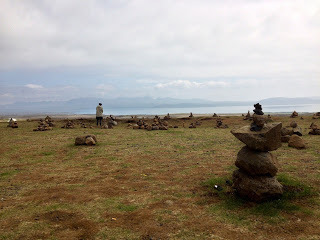

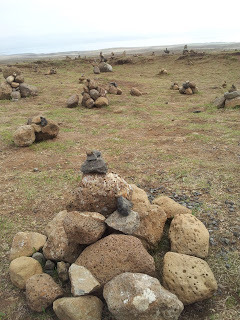
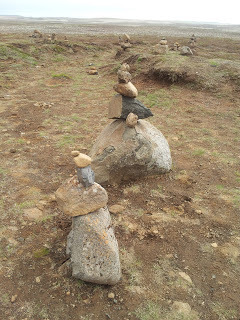

The Geysir area was just like a mini-Yellowstone, although, if you think of it, Yellowstone is more like a mini-Iceland. The Great Geysir itself is the first geyser ever written about by mankind. It goes years between eruptions now, but there were several other geysers nearby, including the very active Strokkur, which went off at random intervals of 2 to 6 minutes. Roland got some great video of it.



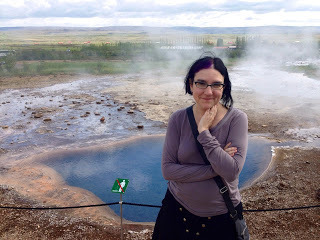 The sign wordlessly says "Don't throw coins in here, you jerk!"
The sign wordlessly says "Don't throw coins in here, you jerk!"
Some jerk had thrown two coins in.The water behind me is boiling hot, just like how Radiskull likes it.
Now for Gullfoss! No, this is not a product for cleaning between your seagulls. It is a giant waterfall. There's a larger waterfall to the northeast, Dettifoss, where Prometheus was filmed, but since it would have been a day or two drive, we opted for this tiny little thing:
 See those dots on top of the rainbow? Those are people.So, it's kind of a big deal.
See those dots on top of the rainbow? Those are people.So, it's kind of a big deal.



On our way home to Reykjavik, we took the scenic route.. I mean, the other scenic route.. hell, they're all scenic routes, and we discovered Skálholt, a really old church, built in 1056AD. At least, it used to be that old, until it burnt down, and then they rebuilt it. Anyway, the site was once the largest religious and cultural center of Iceland until all the fires and earthquakes forced them to move to Reykjavik.
 Source: Wikimedia Commons.
Source: Wikimedia Commons.
Because we fail at taking pictures of churches.Before entering, we veered to the right, and saw the foundations of the old monastery buildings.
 "Upon this rock, I will [literally] build my church."This area was roped off, but just a little further away, very much to my delight and sense of mystery, was an underground passageway which was not roped off. It was lit and welcoming. So I followed it.
"Upon this rock, I will [literally] build my church."This area was roped off, but just a little further away, very much to my delight and sense of mystery, was an underground passageway which was not roped off. It was lit and welcoming. So I followed it.


At the end was a tiny basement museum sporting huge stone sarcophagus lids, carved in art and Latin, dating across 700 years, the newest being from the 18th century.
We followed a narrow winding staircase to the cathedral above.
Perhaps it was because of the ancientness of the site, or perhaps hundreds of years of worshipers, or maybe it was the candles and the organ music, or the atmosphere of having entered via a basement full of ancient coffin lids, but in the cathedral I was struck with a sense of power that coursed through me like lightning. I've had few experiences like this in my life, but it's been a very long time, so I wasn't expecting it.
I almost cried. I couldn't speak until we left the building.
 Iceland is small, but it's really big.We were in Iceland for four days. The area within the red circle is how much we saw. We could see the Reykholt glacier from a distance, and we almost made it to Hella (right there near Selfoss) before we rode outta there like a bat outta Hella.
Iceland is small, but it's really big.We were in Iceland for four days. The area within the red circle is how much we saw. We could see the Reykholt glacier from a distance, and we almost made it to Hella (right there near Selfoss) before we rode outta there like a bat outta Hella.

Here I am, back at the airport, coffee in hand, all ready to depart. I would definitely return to Iceland. Perhaps next time, we might travel around the Ring Road, aka the Golden Circle, staying in B&Bs we pass along the way. Or perhaps more partying in Reykjavik, or going in winter for the Northern Lights. I still crave learning the language and the elf lore, and would love to live there a couple of years to do just that.
One parting sign just before we went through security. I knew just enough Icelandic to recognize the word "coffee".

It says, "Prohibited from placing coffee cups in the window." And I was so sure "gluggann" had something to do with how fast you should drink your kaffi before boarding your international flight.
Before I left, I raved about how excited I was to attend Elf School.
 Álfaskólinn, 2nd floor.The school was located in a mixed-zone industrial/commercial park, but it also seemed like an apartment. The place was piled high with books and troll figures and gnome statues. A small reception desk remained unmanned, and I called out until his wife appeared, and then summoned Magnús from the maze. He looked to be out of a fairy lore himself, a giant of a man, tall and round, with a white beard and a bright red shirt.
Álfaskólinn, 2nd floor.The school was located in a mixed-zone industrial/commercial park, but it also seemed like an apartment. The place was piled high with books and troll figures and gnome statues. A small reception desk remained unmanned, and I called out until his wife appeared, and then summoned Magnús from the maze. He looked to be out of a fairy lore himself, a giant of a man, tall and round, with a white beard and a bright red shirt.With regrets and several hugs, he informed me that since I was the only attendee, he would not be holding elf school that day. If I could wait until Tuesday when a big group was scheduled to come through? But no, I would be back in the states by Tuesday.
To be honest, I had mixed feelings about missing elf school. I was in a fair amount of pain due to a minor operation I had just undergone at the hospital (more on that later), so was a bit nervous about trying to make it through four hours of lessons without passing out. He gave me the text book for free, and promised to send an electronic copy of the new edition when it comes out. So I got another rare folklore book to add to my collection, which made me happy enough. Half of it is in German, the other half in English, and I get the sense that the German stories are not the same as the English ones.
I've got a couple of random pictures I'd like to go through. First, viking hats. They were everywhere.
 On a backpack......on a troll.However, in spite of our long searching, we never once found a viking hat that would fit Ryuk. I guess we'll have to make one.
On a backpack......on a troll.However, in spite of our long searching, we never once found a viking hat that would fit Ryuk. I guess we'll have to make one.Next, weird art. Ha, I'll bet you thought art class was over.
 In a coffee shop in Reykjavik.
In a coffee shop in Reykjavik.
 In the restaurant near Geysir.And then, just because I love signs so much, here's some product packaging:
In the restaurant near Geysir.And then, just because I love signs so much, here's some product packaging: Bonus Sexa! Já!Speaking of sex...
Bonus Sexa! Já!Speaking of sex...
So let's talk about puffin, shall we? Yes, puffin is on the menu.

What's a puffin, you might ask? This little guy is a puffin:
 "Pwease don't eat me..."Don't let his sad eyes fool you. Before you judge me, remember, puffins themselves are ferocious carnivores.
"Pwease don't eat me..."Don't let his sad eyes fool you. Before you judge me, remember, puffins themselves are ferocious carnivores. "I'm gonna eat ALL the cute fishies! RAWR!"
"I'm gonna eat ALL the cute fishies! RAWR!"OM NOM NOM!They do not weep over the tiny adorable fish they consume. It's the circle of life, and someday, something else is likely to eat me, no matter how cute I am.
And you are not one to point fingers. Unless you're a vegetarian, you've likely eaten one of these recently:
 Original image from Crack Two.
Original image from Crack Two. Warning: Do not view before dinner. Or breakfast.It was either the puffin, or the whale. I couldn't quite come to terms with eating a whale... Plus I wasn't that hungry.
The appetizer course was smoked puffin, which tasted like salmon, only softer, more purple, and OMG IT WAS SO GOOD. Puffin, I love you.

The main course tasted totally different... a bit like mild liver. I happen to love liver, so it all worked out.

So the bars in Iceland, on the weekend, are open all the time. That's because in Iceland, time has no meaning. They also let people carry their beer bottles from bar to bar, and I even saw a guy take his glass from one establishment. He had the courtesy to look slightly guilty as he did so.
One thing we quickly learned is that if it's late-night, say 10pm, and you're hungry, YOU WILL NOT FIND FOOD IN REYKJAVIK. They've never heard of bar food, and if you walk the streets looking for a restaurant still serving food, they will look at you funny. We did discover, thanks to some friends of friends we met up with, that after 11pm or so, the food trucks show up in this one part of town, and then it's waffles and kebabs till sunrise.
Except, the sun doesn't rise. We've been over that.
 Viking Kebab!
Viking Kebab!
 Bacon Kebab!
Bacon Kebab!
 Picture taken at 12:50am. Still sunny.
Picture taken at 12:50am. Still sunny.Location: The "Luna Bar" aka the Mánabar
 The smoking room at some other bar. Taken at 3:16amA few bars of note.
The smoking room at some other bar. Taken at 3:16amA few bars of note.Boston was on the second floor, darkly lit, with gold baroque wallpaper and tiny chandeliers. The music ran the range of electronic tunes with that particular Icelandic sound we came to love via the car radio. Not necessarily Icelandic music, but a certain choice of style that was pretty awesome. Iceland has several music festivals, and it seems like that sort of thing might be worth visiting for.
The DJ was a woman, one of my first realizations that Iceland is subtlety less sexist than the states. It's these little things that told me Icelanders actually believe women are just as capable as men. (A guy we were hanging out with, who has done work for the Pirate Party campaign, BTW, told us the problem with Icelandic women is they're too emotionally detached and unwilling to commit.)
 Boston, right next door to Dillon.Then there's the place we called the Luna Bar, even though I think its real name was Mánabar. The inside was space-themed, with stars on the ceiling. The bartender looked a cool version of Maurice Moss from the IT Crowd. That he turned to me first to hand me the change, when Roland was the one who gave him the money, was another one of those subtle little outward differences in the assumptions about women.
Boston, right next door to Dillon.Then there's the place we called the Luna Bar, even though I think its real name was Mánabar. The inside was space-themed, with stars on the ceiling. The bartender looked a cool version of Maurice Moss from the IT Crowd. That he turned to me first to hand me the change, when Roland was the one who gave him the money, was another one of those subtle little outward differences in the assumptions about women. Lookit! It's my bar!Another bar of note is the Lebowski Bar, named after the movie. I don't know the story of how this place got created in Iceland. I'm guessing a couple of guys smoking joints turned to each other and said, "Þú veist hvað væri kúl? [You know what would be cool?]"
Lookit! It's my bar!Another bar of note is the Lebowski Bar, named after the movie. I don't know the story of how this place got created in Iceland. I'm guessing a couple of guys smoking joints turned to each other and said, "Þú veist hvað væri kúl? [You know what would be cool?]"Or perhaps it's the wacky sweater the Dude wears throughout the film, which, while not traditional, does distantly resemble a lopapeysa Icelandic sweater.
 The Dude abides.
The Dude abides.
 Yes, this is a White Russian menu.I might have been up for more partying if not for a bit of a medical issue that appeared just days before our flight, which I tried but was unable to resolve before leaving. I got on the plane, hoping it would improve, but it didn't, so I got to experience first hand what it's like to seek medical treatment while travelling. If you're curious about my experience, I've hidden it behind this TMI tag. Click to read. I try not to be too squicky or go into too much detail...
Yes, this is a White Russian menu.I might have been up for more partying if not for a bit of a medical issue that appeared just days before our flight, which I tried but was unable to resolve before leaving. I got on the plane, hoping it would improve, but it didn't, so I got to experience first hand what it's like to seek medical treatment while travelling. If you're curious about my experience, I've hidden it behind this TMI tag. Click to read. I try not to be too squicky or go into too much detail...TMI: click to expand
Briefly: I got a Bartholin's cyst. I had one before, many years ago, and it went away with a minor surgery. Unlike that one, this one was terribly painful. My local doctor wasn't able to do much for it with such short notice. So off I went. It added a considerable amount of discomfort and stress to the trip.
After it continued to get worse, I looked up a local clinic. Iceland has socialized medicine (and they do house calls!) but unlike France and the UK, they charge a fee for non-Icelandic people. People from the EU get a massive discount, but being from the US, medical care must always cost more. For me it was 6200ISK up front (roughly $51), and they told me they wouldn't change any extra unless they had to run tests.
Not bad.
I got seen within an hour. That was me showing up, saying I needed treatment, setting an appointment, and coming back, one hour. (Compared to state-side, I was lucky to get in before my trip because they had a last-minute cancellation, and I had to see the nurse practitioner, not the doctor.) We were able to walk around the neighborhood in that hour, and got coffee from a great little place called Stofan.
The doctor himself called me from the waiting room. He was no-nonsense. They all were. I told him my problem, he stared wordlessly at the computer for awhile, then left to grab another doctor for advice. They led me to her office, wherein they had me disrobe while they just stood there, and then she made a small incision to drain the cyst. With no anesthetic. Honestly, with how much it had been hurting, I was mentally prepped for it, and just wanted relief. When that didn't work as well as they'd hoped, she called the gynecologist for advice. From the next room, with the door open.
Thankfully it was all in Icelandic. However, both doctors had this frightening expression, a sharp inhalation of breath, like we do when we're negatively surprised or shocked. It was a bit disconcerting, them speaking Icelandic about my condition while I bled from a hastily-made cut, but I calmed myself by thinking it couldn't be as bad as it sounded. And yeah, it turned out doctors in Iceland make that sound when they mean "Yes," or "Ah-ha.." or "I see."
The doctor told me the gynecologist at the hospital could put in a Word catheter, the same kind of surgery I'd had years ago, on the other side, that fixed it right up. I was willing to agree to anything at this point. I just wanted to enjoy the rest of my trip.
They had me go to the hospital right after lunch. The only reason I needed to wait that long is because they'd had an unusually busy morning. I waited in the waiting room about 30 minutes, and then they had me on a table, and out again, in less than 15 minutes. Again, no bedside manner, no private room for undressing, no attempt to hide the gory details from me other than the language barrier. At least I got a local anesthetic that time.
(Now you can see why I was sort of relieved to miss elf school, which was scheduled to start just one hour later. If it hadn't been for my strong need for rest, I would have put up more of a protest and talked him into holding class just for me.)
Overall, they did a great job. I'm healing up just fine. Though the whole process was rough around the edges, I appreciated their openness and honesty, and the immediate treatment. Since my insurance sucks, it probably came out cheaper than I would have paid here... just under $400 for the whole thing. And, in the states, the catheter stays in for 4-6 weeks, and then you have to have them remove it. The way the Icelandic doctor did it, it fell out on its own just this morning.
Now let's leave the city for Iceland's majestic natural beauty.
The famous Blue Lagoon is near the airport, about a half hour southwest of Reykjavik. It was really hard to tell what time it was, since the sun was still just as bright (gray, overcast) at 10pm as it was at 10am. We got there a little late to pay the tourist-mine prices for a soak in the water, but...
 Please take a moment to memorize this color.You can see the water of the blue lagoon, the part they don't let you swim in, from the highway. Set in the grey, volcanic-bleak landscape, the color pops in the eye in a way it can't in a photo. It's a bright baby blue, the color of the bantha milk that Luke drank on Tatooine. It's a robin's egg that goes on and on, in vast pools surrounded by black basalt and framed in white minerals that coat the rocks beneath the surface. The air smells of sulfur, and in the distance, plumes of steam rise from one of Iceland's many geothermal plants.
Please take a moment to memorize this color.You can see the water of the blue lagoon, the part they don't let you swim in, from the highway. Set in the grey, volcanic-bleak landscape, the color pops in the eye in a way it can't in a photo. It's a bright baby blue, the color of the bantha milk that Luke drank on Tatooine. It's a robin's egg that goes on and on, in vast pools surrounded by black basalt and framed in white minerals that coat the rocks beneath the surface. The air smells of sulfur, and in the distance, plumes of steam rise from one of Iceland's many geothermal plants. Panorama. Feel free to zoom.
Panorama. Feel free to zoom.







That's about all I have to say about it. I can't vouch for paying to go in. There are natural hot springs all over the country, as well as naturally-heated public pools. I read that it's cheaper and better to go somewhere else.
 The mysterious path leading to the Blue Lagoon.We took a day to drive a bit north and inland, to Þingvellir national park and the surrounding attractions. (Pronounced "Thingvellir", not "Ping".). Our main goals were to see Geysir and Gullfoss, but what we found at Þingvellir was even more amazing: History. From 894AD. You can read more about it on Wikipedia, but briefly, Þingvellir is another name for the Althing, Iceland's folkmoot or "thing". A "thing" or a "moot" was a gathering of tribes wherein peace was guaranteed and political matters were decided. It's where our modern terms "thing" and "tithing" come from, as well as the roots of western law and democracy. Iceland seems to have done this bigger and better than England and Scandinavia.
The mysterious path leading to the Blue Lagoon.We took a day to drive a bit north and inland, to Þingvellir national park and the surrounding attractions. (Pronounced "Thingvellir", not "Ping".). Our main goals were to see Geysir and Gullfoss, but what we found at Þingvellir was even more amazing: History. From 894AD. You can read more about it on Wikipedia, but briefly, Þingvellir is another name for the Althing, Iceland's folkmoot or "thing". A "thing" or a "moot" was a gathering of tribes wherein peace was guaranteed and political matters were decided. It's where our modern terms "thing" and "tithing" come from, as well as the roots of western law and democracy. Iceland seems to have done this bigger and better than England and Scandinavia.Given my previous writing research into dark ages political systems, I was super-delighted by this surprise. If I'd been feeling up to it, I would have run to all the monuments and historical markers all over the valley. As it was I hobbled about the best I could and still managed to see alot. Have some pics:


The Althing took place in that valley. The bluff we're standing on is made of basalt, and a large natural crevice cradles the path that leads down. Here's the start of the crevice's humble beginnings, and the path:


At the bottom is another crevice, parallel to this one.




And then of course I have to take a picture of the only sign carved into the rock. I have no idea what it means, but that curly-cue "c" symbol looks really familiar.

So let's talk about cairns. The first thing I noticed driving to Reykjavik from the airport, is that out in the middle of the vast lava-flow rock covered in struggling moss, were rock piles. Most were only three or four feet tall. Others were more impressive, maybe forming low walls as if they could have once been huts. It was a common feature of the landscape. I speculated (rightly) that they were markers of some kind. Specifically, they were landmarks that once denoted roads and paths that no longer exist. They are hundreds of years old.
So imagine our surprise when we pulled over to a viewpoint, and found a whole field full of them:

My guess is this started out as one cairn, and as people stopped along their way to Þingvellir, they just added more. Some are very artistic. If I'd not been impaired, I would have made one of my own.





The Geysir area was just like a mini-Yellowstone, although, if you think of it, Yellowstone is more like a mini-Iceland. The Great Geysir itself is the first geyser ever written about by mankind. It goes years between eruptions now, but there were several other geysers nearby, including the very active Strokkur, which went off at random intervals of 2 to 6 minutes. Roland got some great video of it.



 The sign wordlessly says "Don't throw coins in here, you jerk!"
The sign wordlessly says "Don't throw coins in here, you jerk!"Some jerk had thrown two coins in.The water behind me is boiling hot, just like how Radiskull likes it.
Now for Gullfoss! No, this is not a product for cleaning between your seagulls. It is a giant waterfall. There's a larger waterfall to the northeast, Dettifoss, where Prometheus was filmed, but since it would have been a day or two drive, we opted for this tiny little thing:
 See those dots on top of the rainbow? Those are people.So, it's kind of a big deal.
See those dots on top of the rainbow? Those are people.So, it's kind of a big deal.


On our way home to Reykjavik, we took the scenic route.. I mean, the other scenic route.. hell, they're all scenic routes, and we discovered Skálholt, a really old church, built in 1056AD. At least, it used to be that old, until it burnt down, and then they rebuilt it. Anyway, the site was once the largest religious and cultural center of Iceland until all the fires and earthquakes forced them to move to Reykjavik.
 Source: Wikimedia Commons.
Source: Wikimedia Commons.Because we fail at taking pictures of churches.Before entering, we veered to the right, and saw the foundations of the old monastery buildings.
 "Upon this rock, I will [literally] build my church."This area was roped off, but just a little further away, very much to my delight and sense of mystery, was an underground passageway which was not roped off. It was lit and welcoming. So I followed it.
"Upon this rock, I will [literally] build my church."This area was roped off, but just a little further away, very much to my delight and sense of mystery, was an underground passageway which was not roped off. It was lit and welcoming. So I followed it.

At the end was a tiny basement museum sporting huge stone sarcophagus lids, carved in art and Latin, dating across 700 years, the newest being from the 18th century.
We followed a narrow winding staircase to the cathedral above.
Perhaps it was because of the ancientness of the site, or perhaps hundreds of years of worshipers, or maybe it was the candles and the organ music, or the atmosphere of having entered via a basement full of ancient coffin lids, but in the cathedral I was struck with a sense of power that coursed through me like lightning. I've had few experiences like this in my life, but it's been a very long time, so I wasn't expecting it.
I almost cried. I couldn't speak until we left the building.
 Iceland is small, but it's really big.We were in Iceland for four days. The area within the red circle is how much we saw. We could see the Reykholt glacier from a distance, and we almost made it to Hella (right there near Selfoss) before we rode outta there like a bat outta Hella.
Iceland is small, but it's really big.We were in Iceland for four days. The area within the red circle is how much we saw. We could see the Reykholt glacier from a distance, and we almost made it to Hella (right there near Selfoss) before we rode outta there like a bat outta Hella.
Here I am, back at the airport, coffee in hand, all ready to depart. I would definitely return to Iceland. Perhaps next time, we might travel around the Ring Road, aka the Golden Circle, staying in B&Bs we pass along the way. Or perhaps more partying in Reykjavik, or going in winter for the Northern Lights. I still crave learning the language and the elf lore, and would love to live there a couple of years to do just that.
One parting sign just before we went through security. I knew just enough Icelandic to recognize the word "coffee".

It says, "Prohibited from placing coffee cups in the window." And I was so sure "gluggann" had something to do with how fast you should drink your kaffi before boarding your international flight.
Published on June 18, 2013 21:09



